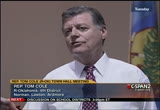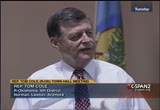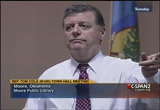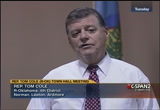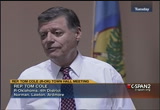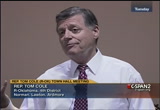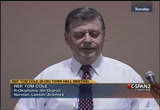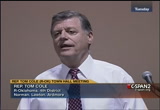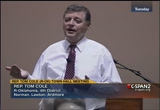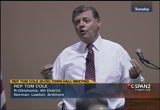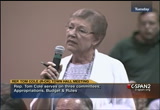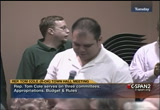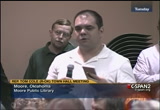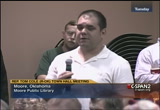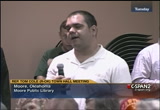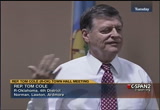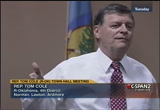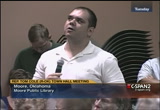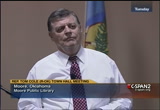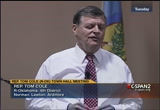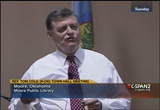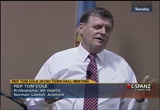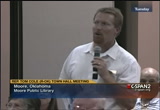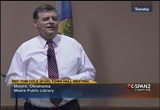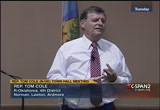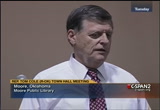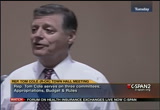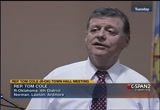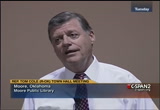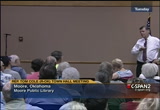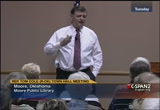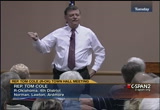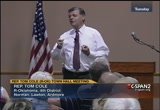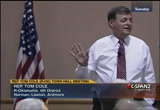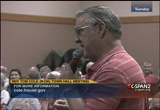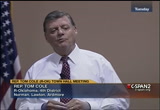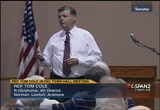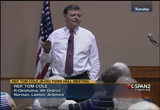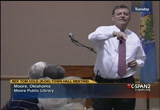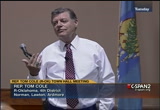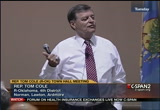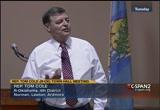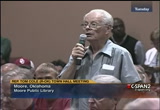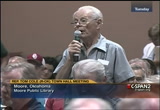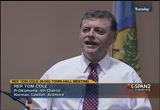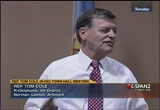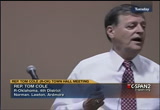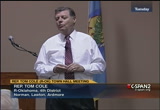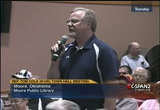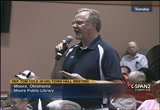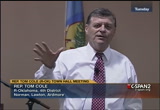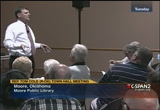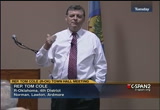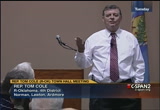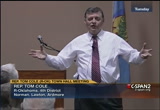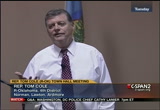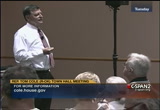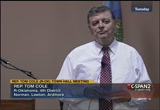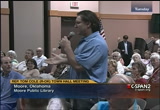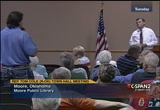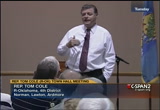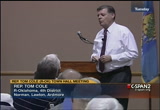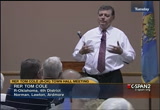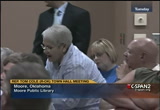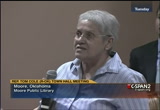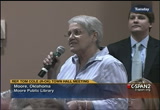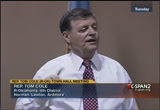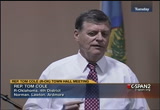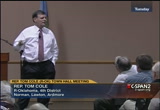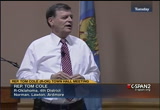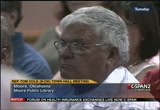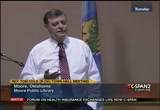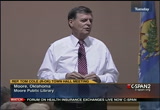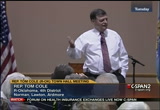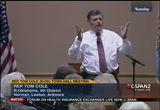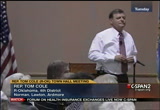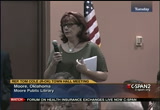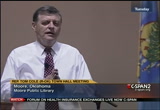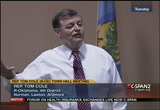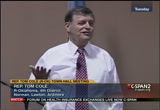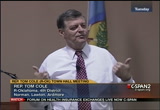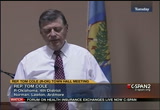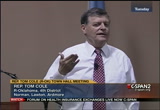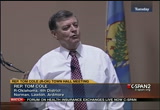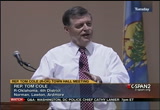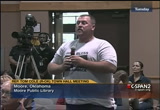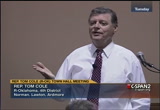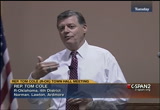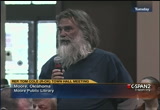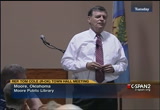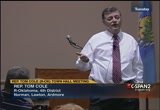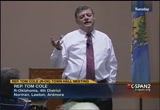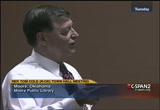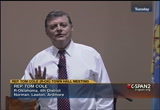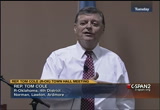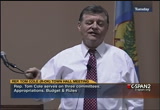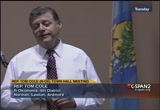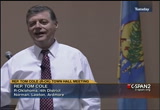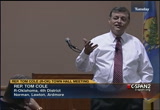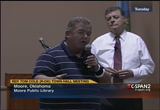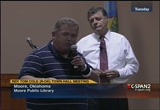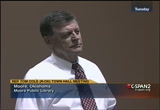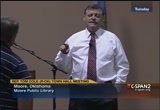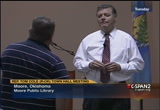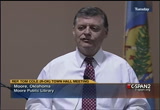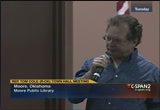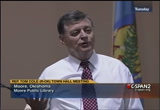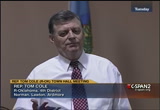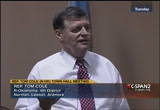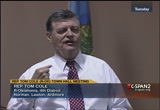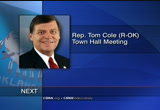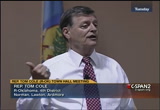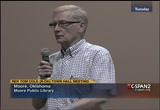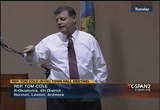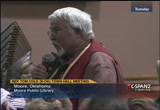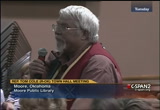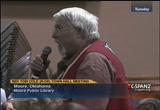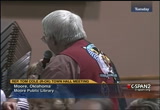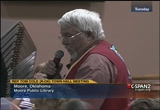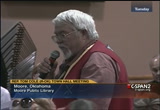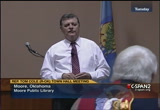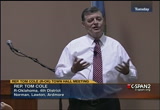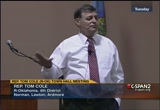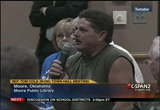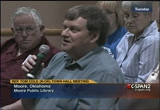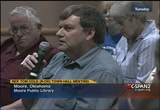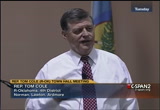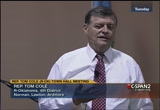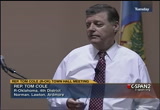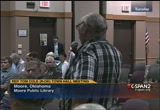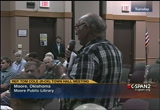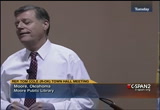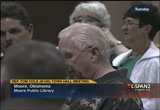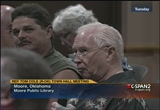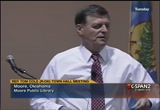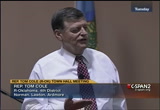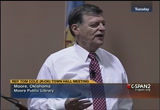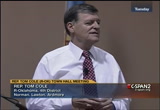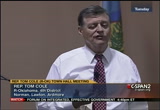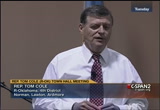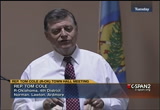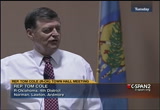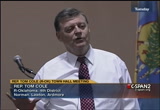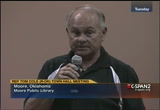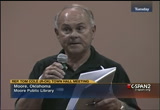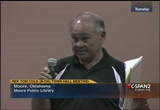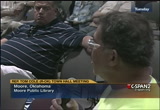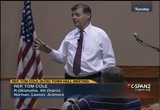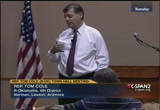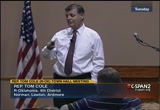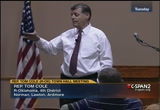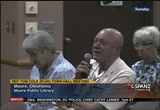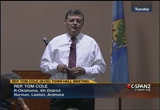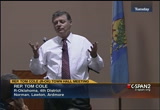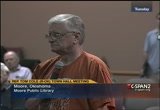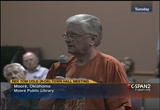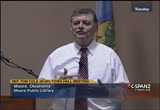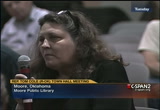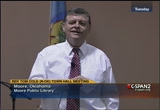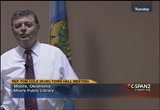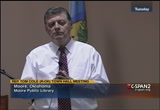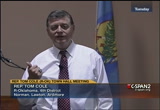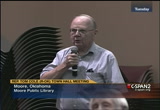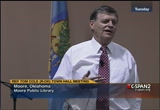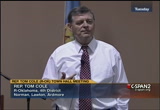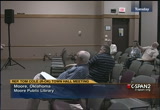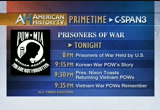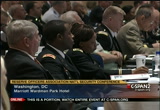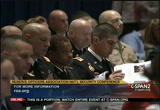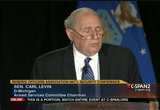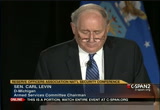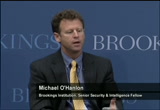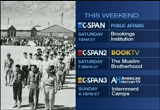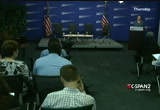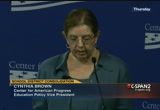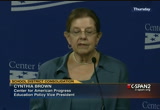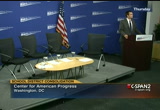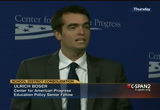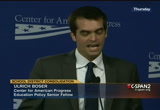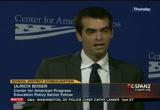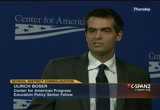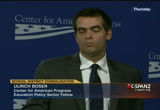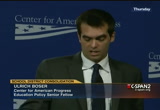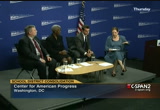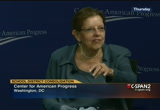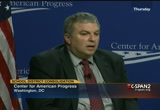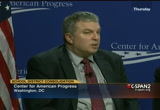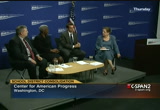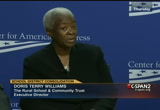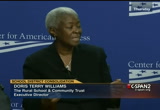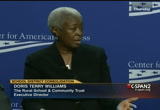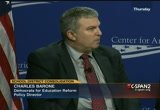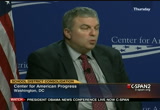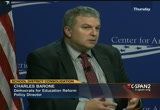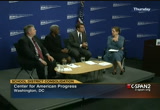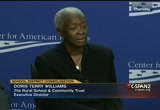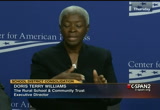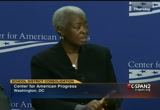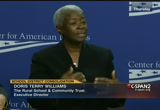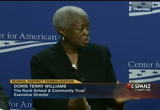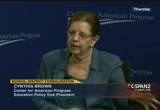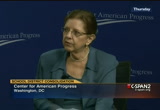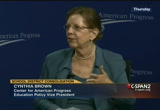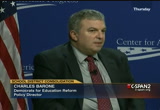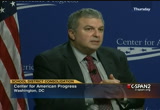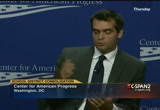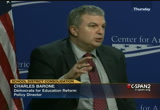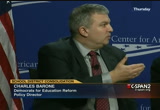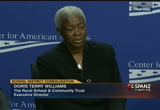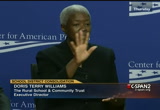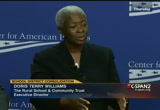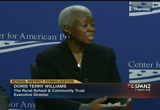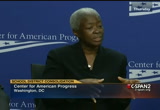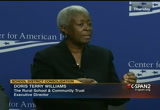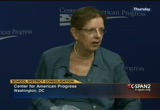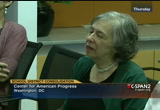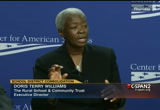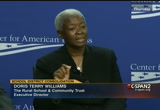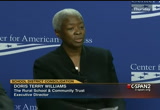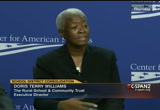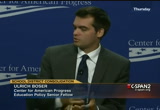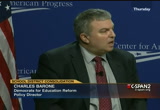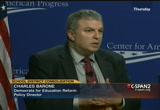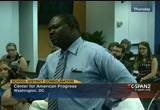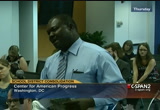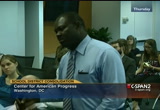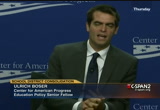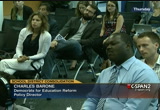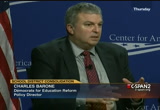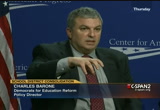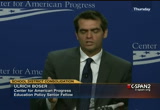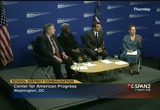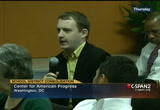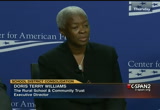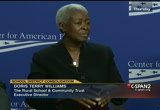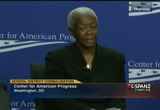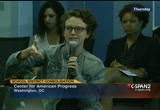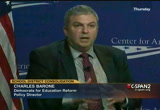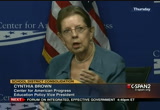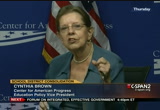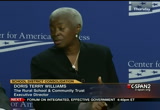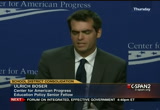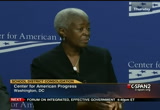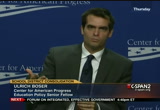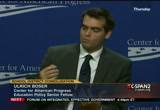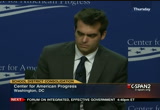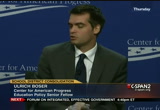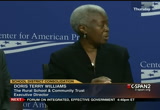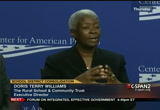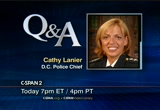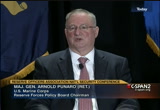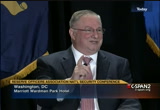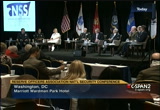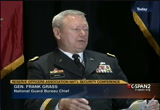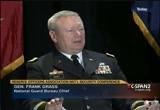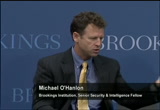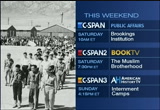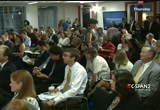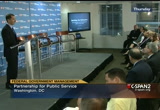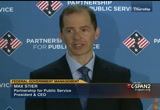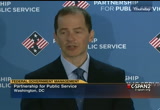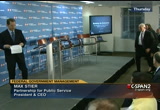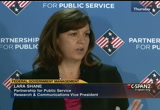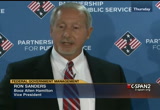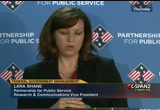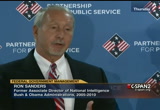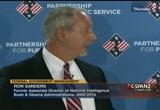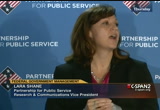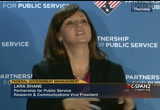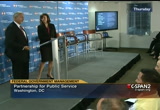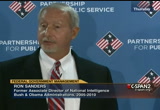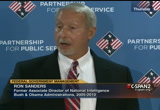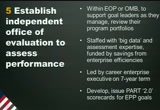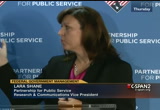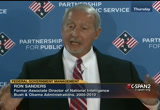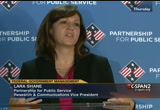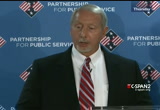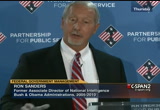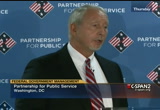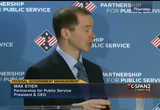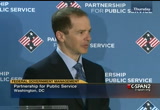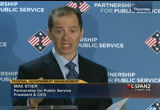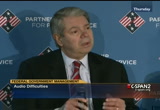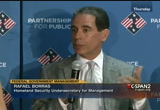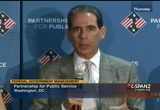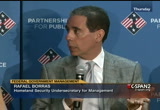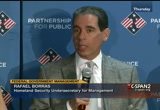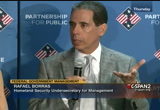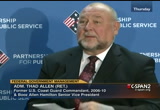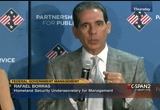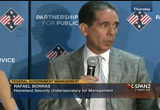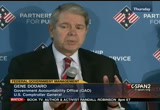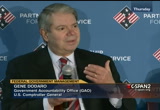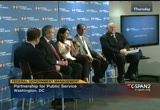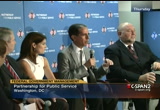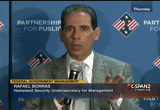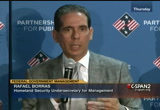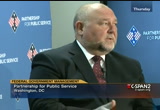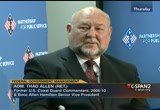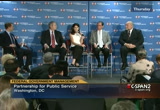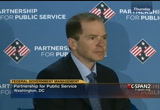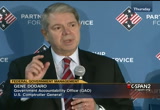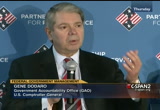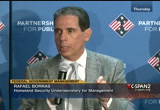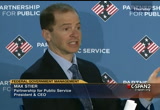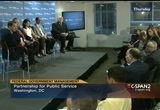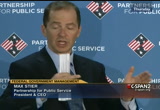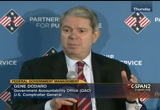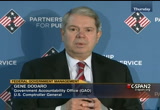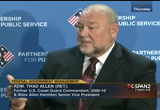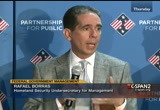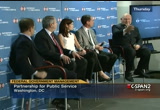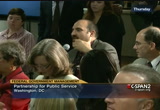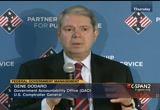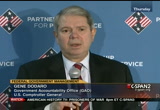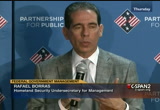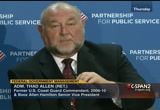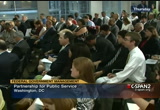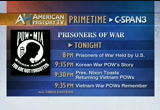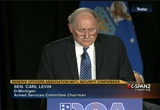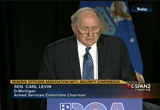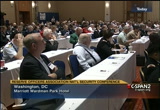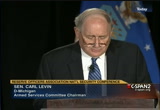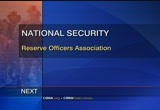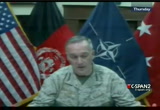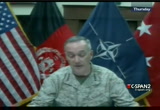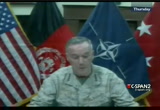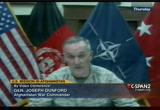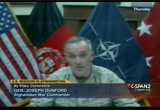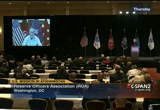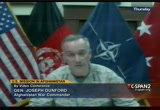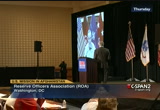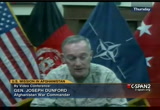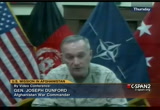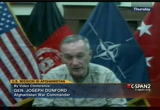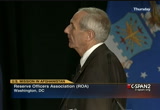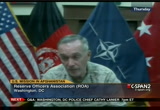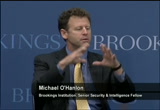tv Capitol Hill Hearings CSPAN August 9, 2013 12:00pm-7:01pm EDT
12:00 pm
a half years ago, a new congress, republican congress, took office, the budget deficit about $1.4 trillion a year. now, it's down to about 650 to 77 # 00 billion, came down a lot, but that's an extraordinarily high deficit with further attention and that'll be contentious in the years ahead. the bad part is congress has not got all the work done by a long shot. ..
12:01 pm
first, all government spending ends on september 30. and that literally means if there'there is not a compromise reached, the entire federal government would shut down. a place like this that means like every civilian job like tinker air force base, it means the district has four veteran centers your they wouldn't be open. veterans hospital closed down. the national weather center that give us as much warning as you can give anybody about the tornadoes wouldn't be operating. so that's a pretty contentious issue. we'll also had the national debt ceiling sometime probably in mid-november. that creates not a government shutdown scenario but if you don't find a way to resolve it, sort of a, across the board 35%
12:02 pm
cut in all government agencies because you couldn't finance government. and, finally, the immigration issue has been very contentious issue. the senate has passed a bill. it's not likely to be a bill that the house will pass. the house has passed for smaller goes through committee, through judiciary committee. they have not yet come to the house floor, considering a couple of others. i think there might be a big immigration discussion late in the year. i think it will come after this government shutdown and hit the ceiling are dealt with, if at all. because the two sides are a part. it's still certainly in the mix for this year. with that, i can drone on and on but i would rather cut it off and start inching your questions. yes, sir. if you will wait, have microphones, did you am i correct. right up here, will. that way the whole audience can hear your question.
12:03 pm
>> mr. kohl -- >> do you have it turned on? it takes a minute. go ahead. >> since the president is getting around congress by passing these executive orders, why is the republicans not filing a lawsuit and let the courts say that it's unconstitutional what he is doing? >> the question in case you didn't hear, the president is getting around congress by executive orders and executive actions, too. not all of these ar these are o. why isn't congress filing a lawsuit. in some cases we are. as a matter of fact, the attorney general of the united states was recently held in contempt, or we have filed against him, a contempt of course case. we have multiple subpoenas to force testimony. so there is legal action under way. there's also things congress can do in terms of not approving
12:04 pm
presidential appointees. there are things they can do in terms of withholding funding, and we've done some of that in some areas. particularly where obamacare is concerned. there is a constant tension and struggle between the executive branch, but i agree with your point. look, i think the president has more than any president i recalled operating outside the normal legislative framework. since he lost control of the house and the senate. examples, i can give, we went to war in libya. i would consider it were. i can say when you fire some 200 tomahawk missile and put in the fy 1000 combat sorties, the other guys on the other side think it's a war, was never approved by congress. not a dime, never voted for. george w. bush had done that i think he would've been, we would've been heard cries of impeachment. we had part of our immigration laws suspended by the president. there's just a variety of issues
12:05 pm
like that where he has gone outside. we have tension with our system, struggles between congress and the president. this one is very -- i think you'll see it continue. but there will be legal cases. >> i'm going to try to bounce around a little bit but again we will get to everybody. >> i was a little concerned to find that you were not in support of making the continuing resolution contingent upon removing what optional spending you move on obamacare. i feel very strongly. i speak from a point of view -- [applause] >> i think they do, too. >> this is not theoretical for me because two weeks ago today my husband and i paid in cash for our son to have major surgery. but, you know, what? that's the price i paid for the liberty of my children. i'm self-employed. i understand the consequent of that as i've limited options thanks our government on
12:06 pm
insurance. i understand that i paid for a limited coverage, a limited, signed up to $1000 a month or $2000 a month. i do not look for the government for recourse on that. we are individuals who are responsible and will make that sacrifice for our child. and i think even if you do not believe in your heart, never number one it will pass, or number two, it's appropriate, you need to represent us and we are tired of having -- [applause] >> great question and i appreciate it very much. and i do try to represent the people here. you know, let me walk, first of all, do i want to defund obamacare? absolutley. i voted against the. i voted 40 times to repeal it. or delay it. we've been able to pass seven pieces of legislation that got rid of, if your small business
12:07 pm
owner you don't have to file at 1041 every $600 purchase. i was in the original law. congress coverage that the republicans get rid of that and force democrats to accept it. those of you, there was part of his that was the assisted-living program was financially, not sustainable, would've bankrupted the government or even the democrats after they look at the financing, after they passed it, agreed and were able to get that through. i still think there parts of this, like attacks on medical devices. can you imagine we'll give you health care by taxing your oxygen tank on your wheelchair or your artificial limb. so i bow to nobody as being opposed and i think we should do it now. the question is you want to shut down the government if you think that will achieve -- i've let me talk to you about the consequence of a complete government shutdown is. never once that means your troops in the field don't get paid. the military is not -- [booing] i'm sorry. of course i wouldn't do that, but that would happen. well now, i listen to your question and i will adjust the microphone again if you want to.
12:08 pm
no, i will, but let, let me finish answering and then you are free to follow up. that's, that's true. we are four veteran centers in this district. we have 15,000 civilian defense workers at tinker air force base that are being for load right now. that would be a complete job loss. about another 4000 in fort sill. national weather center. those things are real. just because you shut down the government doesn't the other side has to give them. doesn't mean that the synod house to pass the legislation. we can pass that, send it to the senate. the senate will refund obamacare, send it back to us, you know, and it would be up to us. we rejected the to shut down the government. i think politically that is extraordinarily thing -- dangerous thing to do. i don't think it will work. if it works that's one thing but, you know, i don't think it will. i think it will put millions out of work and i think it will
12:09 pm
damage the economy and hurt a lot of innocent people. we will get you the microphone back so you have a chance to respond. >> and i do understand that but i think it's a false argument from this standpoint. the house passed two versions, a continuing resolution that excludes obamacare that has that go forward. the senate can we know what they're going to do. we do. but at some point obamacare was passed against the will of the people. we have looked into her supreme court to step in. they failed us. we have looked to our congressmen to do that, and to your credit, 40 times you guys have come instead to get rid of it. in santee, definition of is that we keep doing the same thing again. that's not going to cut it. so this is our last chance, and it's more than just you know, who is going to win the political powerpoint if we shut down government. it's going to be what will the future of the country are look like in a decade because once the tentacles are there it's,
12:10 pm
it's, it's too late to been dialed it back. look at social security. i think that is worth that risk. i also don't think it would come to that. >> well, i think it would come to that. and -- [inaudible] >> if i can finish my point. i think it would come to that and i don't think it would work. look, we can do as you suggest, that's no problem passing the original bill without it. that's fine but it's not going anyplace in the united states senate. it will have an attached to it and it will come back. at that point i really do think about the consequences of this kind of stuff in terms of people at the veterans facilities. and i know you do, too. but it is true. i agree with you that this was passed against the will of the american people. there has never been a poll that said it is popular but the american people didn't give us the presidency in the last election and they didn't give us the senate. we lost ground in the senate. the house is the last thing
12:11 pm
between replay of 2009 and 2010, which is what we would see if there was total democratic control in congress. for things like cap-and-trade and card check and another enormous expansion, those things would happen. i will take what you have to say let her lay very carefully and consider it. i suspect will have a lot of discussions about this but i don't want to be disingenuous and tell you that i think shutting down the gun is a good idea because i don't. i would be dishonest with you if i told you i thought again it would work and i'm not the only guy who thinks that. i don't think james langford and frank lucas are dangerous levels, or tom coburn, who also feel very strongly about this. of the guys like roy blunt for richard to happen to be around for the last shut down. if it would work that's one thing. but, you know, i think it's very high risk and it's very reckless with people whose jobs are on the line, and our security as
12:12 pm
well. and i think it would be very damaging. i'm going to be hard sell on that but i will keep listening and we will see what the legislative options are in september. a great question. let me move over to this side of the room. give us a second and they will get you the microphone. >> if the government shuts down does that mean the president and the senators and the legislatures and the judicial people don't get salaries as well speak was absolutely, absolutely. [applause] >> that would somehow motivate senator or republican or a president to work on some sort of a thing if they get no salary. >> that's fine but it would certainly do that, that's fine. but neither would anybody at tinker air force base. >> well but if they don't -- >> you might think of a. >> they might not let it alone if they do get salaries. it will work on if that's the issue. that's my thought as a citizen. >> again, i respect the passion
12:13 pm
of any because i sure -- i'm about to deal with this stuff day after day as well, and i think it's a terrible policy. frankly if we had had enough republicans in the house or the senate it wouldn't have passed in the first place. barely passed as it was to every person in the state that was in congress at that time voted against it. everyone. not like we did that every vote that we had up on the board and it's not like we elected a president or helped reelect him. we didn't, but at the end of the day, shutting down the government is a very dangerous and risky thing to do. and not likely to work, in my view. let's go all the way in the back and i will work towards the front here a little bit. >> okay, so many issues, so little time. okay, so i mean, i share their concerns, people talk about obamacare and trying to do what we can to stop the.
12:14 pm
i would say that i think the biggest part of the frustration that most of us have is that we said okay, this is going to be a monstrosity, please god, do something to stop it, and then essentially what we hear back is well, you know, we would try to do what began but man, it's just too hard. it's just too difficult. and i think that really frustrates a lot of people considering what it doesn't affect and all the taxes are wrapped up in obamacare would hit, that it's really going to destroy a lot of things. it will radically change the economy and the country and none of us really want to see it happen. it's sort of, we see people on the other side who fight tooth and nail and that's where the problem is that the other side doesn't care what the rules are. they don't care what the normal code of conduct are. all they want to do is win and we're playing by the rules. i think you are playing by the rules but, unfortunately, i don't think that they are playing dirty and we're just really not.
12:15 pm
but really the question condition of want to get to is sort of the world that we find ourselves in, which is a situation that is growing were essentially right now you have a government agency, everybody staff sergeant giunta fund which is the nsa who every three months is going to this fisa court which is a secret court which no one can appeal to. and they're getting warrants to get cell phone records basically every single american, okay? you have an fbi who believes that and has went to court to say that they do not, they don't need, basically they don't need a warrant to put a gps tracking device on your car. you've got an irs whose official position is that they don't need a warrant to check your e-mail. this, of course, is that same irs that has no compunction about using -- abusing their
12:16 pm
authority. they have targeted tea party groups and so far nobody has really paid a price for that. and so read the situation that i find, i think i'm and i might be the only person who feels it is about nothing is being done to rein in these government agencies. and so from my perspective it's like, well, the only privacy really have is what the government says that you have to. and i was really pumped when you voted against -- that was awesome, i was really happy about that. i was really disappointed that you voted against restricting the nsa because you had an opportunity to do that. so really, number one, i would really like to know why you voted against restricting the nsa from collecting all of our data. nobody is saying that they're listening to a phone calls but they are collecting that information. i would like to know why you do decide to do that. and secondly if you really thought that it wasn't such a
12:17 pm
big deal and there's no expectation of privacy service records, then when can we expect you to publish your cellphone calls on line so we know who you call? [applause] [laughter] >> great question. that's a great question. and i think this is like one of the most important discussions and debate in the country, and i think it will continue to be. it's the eternal debate between liberty and security. let's talk about the nsa and unhappy, begin if you have additional stuff you want to throw in we will surely give you the opportunity to do that. look, i looked at this issue really, really carefully. number one, nobody likes the fact that any government agency is collecting massive amounts of data. they are not reading your e-mails, listening to your phone but they certainly have the ability to know who you have called. number two, you know, we that
12:18 pm
federal judges that looked at this and say it's constitutional. well, number three, you, you have to decide whether, we know we've stopped about 50 terrorist attacks, 10 inside the united states, 40 outside, from information to, a lot, you know, to deal with this sort of stuff. and i look at who's on the intelligence committees, you know. one of the guys on the intelligence community is tom coburn of the united states senate. i was at the oklahoma press association meeting with him and watched him stand up and just had the best oversight, the most common you know, accountable and was absolutely saving american lives. i also look, i think there's 14 other members from both parties but every single one of them felt this way about, except one. i think it was one that didn't. so 13 out of 14 voted that way. both the speaker and the minority leader voted that way.
12:19 pm
bush, obama thought that we. we've had the snowden revelations your snowden did not give us a single instance of abuse. i'm not telling you it didn't occur or could occur because i think you're right. look at the irs. you mentioned in another context but you're right, terrific abuse of power. but so far no individual cases have come forward. the people that are supposed to be on the committees and supervises all feel strongly. the key people that have been leader of the country in the last decade feel the same way. the amendment in front of us would have totally stopped, you know, the program. i applaud for having brought the amendment. i told and is in conference. i said this is an important debate to have. and i don't blame you for using the only legislative vehicle you have, which is amending the defense bill on this issue. what we really need is like what we're having with the irs right now, is a series of hearings
12:20 pm
investigations where you actually hold people accountable if they had done anything wrong, and you look at the law and you change it if you need to. when you say nothing as happened at the irs, i would say not enough has happened. you don't have the same director or deputy. there be multiple people fired and removed. there are people that are under criminal investigation right now. there will be laws, if you look at the financial services bill that has gone through the subcommittee on appropriations, not only is the irs defunded from obamacare, there's real cuts in its budget in response to this. so i think the same thing needs to happen in terms of a really detailed and thoughtful examination of the nsa. but i'm not, i don't think we ought to immediately toss of a program into we think about it and look at it, you know, all the security people on both sides of the aisle tell us it's made a difference. i'll certainty an opportunity to
12:21 pm
respond. >> okay, so i appreciate your answer. one thing i would like to point out though, if a secret program was abused we wouldn't know what. >> well, we might now. we've got a guy speeded let me rephrase that. we wouldn't know it until it's too late to go become like and goods moment. the thing is that i know, or have read that the way this day was supposed to work was that at least when the first, the controversy first dinosaur when bush was president was that they were going to monitor the so-called, get these records for someone who is suspected there's outside the borders of the united states. when the person contacted someone within the united states, then they're going to go and get a fisa order for that person, that suppose to tears with contacting. i felt uneasy about that but i remember thinking that, well, you know, if the person can one
12:22 pm
person or two people are whatever is contacting a known terrorist, then maybe. but, you know, my thing is don't like to bring up a point that, you know, there are things we can do to make the united states safer without saying, well, we need a database of your phone calls. we need a database of your e-mails. we need a database of this and we need a database of that. regardless, the fact is we have the capability of doing it, right? we don't know necessarily what they are doing. we suppose that they are saying no when they say no, we're not reading their e-mails are this, supposedly they really are not. but my biggest thing about that is that what we do know is that if they have the power, eventually they will get abused. and so my larger point to you is, is ad hocly that you will take a look at that when you have a chance to reconsider this stuff, is that, you know, they,
12:23 pm
the large and people are saying that well, i notice people that are running this program are good people, trustworthy. my point is that good people are not always going to be there. and that i'm sure that the people who work for the irs that were abusing taxpayers were great people but they're doing with their bosses told him to do. and so really, that's the only response that i have. and i would just really like for you to reconsider that, just keep in mind that there's no way that you can trade freedom for total security because it doesn't exist. >> i agree. [applause] >> you know, look, i agree with your point, and congress will reconsider this. we will keep looking at it and it will probably come back with a legislative angle. but i mean, they keep our timmy is so far, and i want to emphasize like triple lot until and so far, we haven't found any individual abuse.
12:24 pm
no person has come forward. no whistleblower, even at snowden. look, i guy who says america isn't free and runs off to china and russia detail about us is not my idea of a great american patriot. but i think the issue is worth looking at. but i do put a lot of trust in people that defended the united states of america for their entire careers, 30 and 40 years, with distinction and with honor and with valor, put their lives on the line for the country. when they walk in and tell me, this is what it is and we're not doing this and we're not doing that, we're not doing this, and asking me questions, then i've got to know more than that before cure the rot. fortunately congress will keep looking at this and that's the one good thing that's come out of it. it will continue to be in the press and in the scrutiny. you know, like you, always worry about concentrations of power and individual liberty.
12:25 pm
i think that's what keeps america free. is that individual citizens are passionate about that and their series about that. at the same time you've got to see the abuses, you've got to know where they are. and i don't think that communism we lost our freedom. if we had we wouldn't be having this discussion in the shim on c-span. you know, is still a pretty remarkable country. it's not china. it's not russia. it's not some third world dictatorship. its institutions -- you mention effort called the fbi case, and they lost that case. [inaudible] >> it's on the tip of the lost the initial round. we will see what happens. i think congress will probably editing and pass a law to that effect. because nobody likes that without a warrant. [inaudible] >> the attorney general is under contempt of course. [applause] sadly we didn't win the presidential election but we don't get to appoint the attorney general.
12:26 pm
[inaudible] >> i'm sorry? [inaudible] >> we have a lot republican candidates running. but anyway, yes or. >> let them get a mic to you. >> thank you for coming and joining us, congressman. >> well, it's my hometown. thank you for coming and join me. >> there is less of it. >> sadly so. >> two quick announcements. there are two editions regulating. want to audit and end of the fed, and i'm glad to see congressman cole voted to audit the fed. and whoever is keeping that and not letting it go anywhere, please release it and let it go so other people can consider signing it. and the other one is for nullifying obamacare on a state level, and i'm glad to see congressman cole voted for repeating that on the federal level. my question to you, in the latest edition of the freedom index that i'm holding, vote
12:27 pm
number two have to do with raising the debt ceiling, and i'd probably need my glasses to be this, but you were one of three congressmen who voted to raise the debt ceiling, which basically empowered to be expended to keep on spending whatever they wanted to spend. and i take issue with that. that should not have, i don't see how you had any business voting to raise the debt ceiling comceiling, and that continuing resolution was over a trillion dollars that was mentioned earlier. if there's anything unconstitutional that you do not find in article 1, section 8 of the u.s. constitution, you've no business voting for that as an expenditure. so i need some explaining on the. >> sure, absolutely. one of three oh, congressman. not one of three. the majority approved that. it was part of, honestly, and negotiate a deal with the president of the united states to got to $.81 trillion of
12:28 pm
long-term debt and spending. and it's worked, that's why the deficit is half of what it was two years ago. the consequences of raising the debt ceiling or not raising the debt ceiling is immediate across the board, it would've been about 40% cut in all federal spending. that's defense, that's everything. so you know it takes a while to sort of turn the ship around and get it moving in the right direction. we started make that turn the that's why i voted for the ryan budget three times, helped write a. that's what a voted honestly for the lowest budget everything the year i've been in congress, the republican study committee budget, and only about 130 people at the most to vote for that. that's what we been awfully tough on spending. but again, you want to think twice about destroying the financial markets and the system and shutting down or essentially crippling the country. so that was my rationale on that. let me teach you a mic so they
12:29 pm
can hear you back there. >> thank you, congressman cole. >> thank you. >> when we go into the fold, could you speak as to what would happen to the bond market as to how much will have to pay in bonds that we are currently getting almost nothing on, 30 years i think is 3%? what happens to the stock market? what's the total impact on our country? and after our country goes down, what will happen to the worldwide economy of the entire world? and keep in mind that, they are almost down now. ..
12:30 pm
to revolutionary soldiers, some of whom had been sold to speculators because they never thought they would get their money and established the basic credit of the united states. so i think it's a very dangerous thing. now if you think it won't affect you, i can promise if the most credit worthy institution in the world defaults, your interest rates are going up. on your homes, on your cars, on your credit cards, you name it, they will all move he up. if you get credit at all. what happens to the rest the stock market? i guaranty you, it will take a
12:31 pm
terrific hit, terrific beating. you saw what happened to it last time when there was just a struggle going on about this but actually go over and default i think it would be much more dangerous. and you put your finger on another key point. a lot of other countries are in even worse situations than we are. so we go down, i think you, i think probably looking at something like the great depression again. now do i know that for a fact? nope. not an economist. do you want me to run that risk? i'm not sure. but, i would say it would be pretty catastrophic if the united states started defaulting on its obligations. by the way, its obligations are not just debt. right now the interest on the debt is 6% of the federal budget, bigging, but it is not gigantic because we're borrowing fairly cheaply. but our obligations when we tell you, you pay into the medicaid system, you will get medicaid. you pay into the social security system, you will get social security. you sign up and fight for the united states, you're going to
12:32 pm
get paid. you retire after honorable service, you will get, you know, your pensions or what you're entitled to. we have lots of obligations we assume as a people not just borrowed money. they're obligations to american citizens and those things also get cut. not as if you just cut the money to people you borrowed money from, with i would be pretty bad. you stiffed people that loan you money. make you sort of a deadbeat. that you quit meeting obligations you make commitments to individual citizens to make. now there is better ways -- we balanced budget before and only done it four time in 50 years. happened to be with a democratic president and republican congress. the deficits were considerably lower until the last five years than they have been since then. we're making some progress. but, i think you got to be very careful about, about the option of default. i think it is very dangerous thing to do. yes, sir, over here. let me get the microphone right to you. right there. actually the gentleman in front.
12:33 pm
we'll give you your chance too. everybody will get to ask their question, i promise you. yes, sir? >> sometime ago in the daily oklahoma ann, there was a article written by george will and he stated in his opinion obamacare would fall or fail under its own weight. and i for one have more hope for that happening than i do congress changing it. [applause] wondering what your opinion was of this? >> boy, there are days i share your frustration. let me offer you a time, first of all, congress would change it if the american people would change congress. you know, again it is not, congress showed it was, when you change the house of representatives in 2010, it has voted 40 times to get rid of this thing but we've got to get the senate and got to get a president that will work with instead of against us. the ultimate solution is usually at the ballot box. it is frustrating when you're in a state as conservative as
12:34 pm
oklahoma and you voted against the president son two different occasions and you've elected every member you've got and every vote you had was no, but we didn't win the election in enough places. we won it here but didn't win enough. the second thing i would say, there have been some changes. and again, i mentioned those a little earlier. they get lost in the debate. everybody focus on appeal. get rid of 1040s. getting rid of assisted living plans that would cost tense of billions of dollars. five other pieces legislation. even the guys that pass this thing, sometimes you know, they think it is pretty bad in this area. so you can get that changed. i think there are some others like medical device tax. senate voted on a bipartisan basis to get rid of it. we would get rid of a heart beat in the house. they did it inside of a piece of legislation. you keep chipping away. last thing, let's be real, the
12:35 pm
thing isn't working real well. the president of the united states, it is his signature piece of legislation. he said i want to push the business mandate off a year because we're not ready to do that he left it on every individual in this room. so you will have to pay it but the business isn't. that's crazy. they both both be ended but they should both certainly be pushed off together. when you got a guy like howard dean who is supportive of legislation writing in "the wall street journal," look, the independent payment advisory board, which is the cost control, is not going to work. it is going to collapse. that tells you something. so look, i understand folks think there's a last moment and, you know, it is a do-or-die moment but i actually see the trend moving for us. i can tell you what it was like to sit on the floor and have fought for months and months when there were only 178 of us. we had a lot, dan boren in our state, some democrats helped us and we took it until the last
12:36 pm
play. until they finally had democrats that broke on us and see this thing happened. i remember at the time, my gosh it is end of the world. the american, you remember how popular the republican party was in 2009? not very popular today, think back to 2009. i mean you talk about road kill? you know, and yet in months later because republicans put every vote on the board up, against that, they became majority in the house and they at least picked up seats in the senate. so i think, you know, i think you keep the fight up every single day. come at it every which way you can. repeal parts of it as you can and try to change over time you change the electoral balance. i think it is really bad policy and fiscally irresponsible piece of legislation. it is promising benefit we will never be able to afford in the long run, my view. >> yesterday i read an article that sated that -- stated we already have a shortage of 12,000 doctors and they're being
12:37 pm
replaced by 18,000 irs agents. >> well, irs agents, there is good chance you will never see. we defunded those in the house. [applause] and we have. even democrats have a hard time sometime defending that. you're right about the insent activities on doctors. that is, just because we promise you care or promise you coverage, doesn't mean we can promise you care. if there is not enough physicians or health care providers out there because they think this thing is too, burden some and too restrictive that will really push up prices even higher than they are today. i talk to a lot of physicians groups and particularly physicians that tend to be in their 50s, are saying i'm getting out of here. i don't have to stay anymore. i'm done. i'm not growing to practice. it is believe me, i agree. this is a dangerous piece of legislation and fortunately more and more people, i think, understand that because again
12:38 pm
this, they have been trying to sell this dog for three years and it is not hunting and people sort of know it. you know i think over time we can get there but you have to keep the fight up. honestly, we have to get people in other parts the country to see it the way we see it here. and i think even a number of people vote democratic senators or the president, you know, also feel this way about it but they have other issues that are more important to them than obamacare. so they will vote democratic perhaps on those issues. but i think fundamentally, this is a really dangerous policy. yeah, go ahead. you have the mic in your hand. then we will move up. >> thank you very much. i don't know if i'm an old dumb country boy or what i can't seem to get it through my head why we have so many financial problems for social security or any of number of things but yet we seem to come up with money to send it all over the world with
12:39 pm
countries that vote against us 90% of the time in the u.n.? [applause] >> you know every time i hear that dumb country boy line i put my hand on my wallet because there is usually pretty smart question or point that comes right after that. you make a very good point. we just passed in the appropriation as committee a 24% cut in foreign aid. now, also want you to understand, you how big or how small a thing this is in the overall budget. the overall budget of the united states, that is everything, social security, medicare, everything, is about $3.5 trillion, roughly, a lot of money. it is a about a 16, $17 trillion economy. around 20% a little bit more. the foreign raid -- foreign aid budget, operation, state department, every embassy in the world is about $50 billion. the deficit this year will be
12:40 pm
650 to 700 billion. so, you got to, you know, you can save some money but won't solve the problem. and you should save the money. one thing i would tell you about, when we say about which countries we want to cut the aid from you need to stop sometimes and ask some pretty tough questions whether whether it is really in interest. that is what we give aid for mostly. we give humanitarian aid too but we mostly try to affect behavior. take a country like egypt, okay? egypt fought israel in the 40's, the '50s, '60s, and the '70s. has not fought it since 1973. we began giving aid in 1978. we have a vested interest of that. egypt lets us fly thousands of flights over its territory to supply american troops first in iraq and now afghanistan. egypt lets american warships to go through the front of the line in the suez canal. pretty important for us given deemployments we have right now. egyptian intelligence actually
12:41 pm
cooperated with the united states extensively in the middle east and actually has been very helpful. is that a good investment or bad investment? particularly given the turmoil there right now? that's a question that every single year gets evaluated. and, remember, we've changed administrations multiple times, democrat, republican, conservative, liberal, congress has been in different control different times. so it is not as if this thing isn't constantly up for review. it is not as if we don't change where we give money to and cut it off on behavior. to your point, are we stretched thin, yeah? we ought to be saving money every place we can. secondly, in each individual country there is calculus to go through. is this in our interest or not? sometimes it is and sometimes it is not? >> [inaudible] a lot of these countries anyway vote against us 100% of the time in the u.n.
12:42 pm
>> some will, some won't. you know, it really, believe me it is pretty varied as whether they do or not. you always hear of examples that don't but nobody will tell you the times that they're supportive. and u.n. votes are one thing. i can tell you, intelligence cooperation or, the movement of american planes over somebody else's airspace to help american troops someplace else in the world is a lot more meaningful sometimes than a u.n. point but i get your point. all i can tell you these things do get looked at, these decisions do get changed. we are cutting the foreign aid budget in the house. my guess is the senate will cut some, probably not as much as we would in the house. they will probably be some reduction, you know, going forward but, these are also tools of diplomacy. and sometimes, i remember talking to a general, i sit on defense appropriations subcommittee and he says, you know, i rather you would send some money instead of my guys. but if you have to send me
12:43 pm
there, i would sure like to have some friend when i arrive. so we do sit down. some of what we do is military arms sale. some of it is food and humanitarian. you very seldom by the way, just a check. usually it is some commodity or some purchase quite often made in this country and the aim is to try to have influence and affect behavior in ways to help the united states. i can't tell you we always get it right because we don't. we can clearly make mistakes. we'll continue to reduce and we're going to continue to try to be vigilant in this area. but it's a great question and it's, something we're wrestling with. let me go all the way back, back there. there is three of you in a row. so whoever gets the first mic, sort of right on the aisle back here. he have. >> i've been hearing a lot about change here lately and reading a lot about change and one of them is the chained cost of living which is going to hurt a lot of
12:44 pm
people for a long period of time. why don't you put that chain on the spending? >> i would like to. we have, we cut the discretionary budge jilt of the united states three years in a row. last time that happened was in the 1940's. we spend less on defense this year than we did two years ago. we spend less on almost everything than we did two years ago. that is about 40% of the budget. 60% of the budget are things that are popular. medicare, medicaid, social security, food stamps. veterans benefits. most of those are what are called, non-discretionary. that is on automatic pilot. no one is talking about cutting them absolutely but the rate of growth is pretty phenomenal. some may be some change up front. we changed social security before. if you're my age, i'm 64, i could retire at 56 get a full social security check the way my daddied. it will be 66 1/2 or something. that was back never 1983.
12:45 pm
it was actually, we're living a lot longer. so, what are the changes you can make at the margin that add up to a lot of money over time that are not devastating to people? that, those are the kind of issues that think that, you know, sooner or later the country is going to have to deal with. but the spending, it is not just, congress is appropriating less money than it has appropriated,. less than three years ago. it is the other side of the budget, the popular side that is growing very, very rapidly. no big surprise. baby boomer ares rao retiring. that is the largest generation in american history and they will live longer than any previous generation. i kind of think now i'm 64, that's a really good thing, you know. but when we set social security up, didn't have medicare until 1965, the average person in this country lived to about 62 or 63. you got your first check at 65. only in america. and the average person that was
12:46 pm
on social security was there now about five years. today, if you get to 65, you have a better than 50% chance of getting to 85. and about 25% chance of getting to 92. again, i think that's a pretty good thing. that's not a bad thing. but do we have to like look at some things? yeah, over time. anybody on these programs now is not going to be affected. you know, nobody is talking about things that really hurt people that are on the programs now. but, you know those things will be on the table for debate. sooner or later you have to deal with the budget. again, if you think these adjustments aren't happening they already are. federal government is collecting $600 billion more in taxes than it was in january. that is what the fiscal cliff was. so there is more revenue coming into the system too. also helped by the way if the economy started growing. that is one of our big fights or disagreements with the president. economy growing at 3 or 4% generates a lot more tax revenue than an economy growing at 1.7.
12:47 pm
and the lower the unemployment rate, means the less people are taking out. people don't want to be unemployed. you know. but then, if they're unemployed they have unemployment insurance. they have got medicaid. if they're working they're actually paying. getting the economy moving again is every bit as of that as than taxing and getting robust growth going. let me get right in the bag on this side. you were the twice i was actually pointing to but. you were the guys i should say. >> is it on? >> yeah, it's on. >> our mailbox is constantly full of conservative republican organizations requesting money. now many of these organizations are dealing with exactly the same issues, which means that our money is being fragmented.
12:48 pm
i'm certain that a certain percentage of those are scams where the money is filtering private pockets. i'm also sure that some of those are actually filtering money into liberal hand. and then, you can say, well, just put your money into the republican party. well if you're talking about the oklahoma republican party, that's a great idea. but i can not in good conscience give money to the national republican party with its -- [applause] with all of its eastern liberals involved. so would you give us your advice? >> well, this is not a partisan gathering. my guess is there are about as many democrats here as there are republicans. i bet they get their mailboxes full too, maybe from a different
12:49 pm
point of view. i sort of get them from both side. look, you know, my instinct is, read as much of it as you want and throw away most of it. i think, number one, don't have to give a dime. this is the united states of america, you don't have to do it, don't let anybody guilt you into doing it. if you are having trouble making ends meet, don't do it, don't do it. if you want to do it, best thing get get to know candidates or individuals. not hard to go see the oklahoma republican chairman or democratic chairman. you can call them up and get an appointment. i promise you. it is pretty easy. i used to be one of those guys. we're happy when anybody called. look them over as a part organization. same thing with candidates. i think your local candidates, tell you guys have toughest time raising money, people running for county commission, school board, city council, get to know them. they will have a whole lot to do with your life.
12:50 pm
the guy determines whether your garbage gets picked up or not is a pretty important guy. i try to help people that felt comfortable with. they come in all shapes and sizes and varieties and points of view. most americans never give a dime to candidate. that is their privilege. only 4% write a check to any candidate or any party. only .4% give more than a couple hundred dollars. i will tell you having been in politics, this is not a partisan statement, person that will knock on doors, person that will put out a yard sign, the person that will actually put your bumper sticker on the outside of their window, that is commitment. you know, and that matters too. my mom was a state representative and a state senator in this town and mayor. she was a bank teller with a high school education. my dad was a career master sergeant. and she knocked on a lot of doors and she talked to a lot of people. she was republican. this was a very democratic town when she was first elected in
12:51 pm
197. and mostly voted for her because they liked helen, because she was active in her church and had a great political asset of being the first drive-in window bank teller in moore. she gave chicklets to kids and doggie business cuts to dogs and sort of like a lady that does that that is kind of politics i think ultimately works. if you want to, you know, play at the presidential level, and, you know, tip my cap to the united states, president of the united states, he raised more than anybody else, raced money in small increements. we have tools today no previous american had. you have the ability to get on your computer to find out a whole lot about anything and find any point of view by the way you want to find. you know, you know, the whole political spectrum of america is open to you but don't just immediately send a check. check them out. see what other people think, whatever. that is kind of the way i would
12:52 pm
approach it. believe me you will get more requests than you have dollars. you will. and think always, people always used to come in and say, gosh, why are they wasting all that money. when you stop sending them money, they will stop sending you mail. it will take a while. sooner or later they do. they don't send it out if they're not making more money than it cost to send it out. doesn't worry about them at that end. you decide to use your dollars. again i would pick local candidates i like for local offices. if you want to do other stuff that's fine too. people will tell you, i will end on this point. getting more after political science lecture here than you want but, american politics is expensive but you know, one aircraft carrier costs more than all the political contributions given at the federal level. and the guys that decide to build aircraft carriers are there. so actually if you looked at it in terms of the size of our economy, it is actually pretty cheap, it is pretty responsive,
12:53 pm
pretty open. and you can have an impact if you choose to do it. but again, always your choice. united states of america. you don't have to voight. in australia they make you vote. in australia, if you don't vote you have to pay a fine. we don't do that. i think that would be very anti-democratic with a small d. not up to us to tell you vote. it is up to us to persuade you to vote. although i think you ought to vote. yes, sir, right up here. up here. again we'll get to everybody. >> hi. larry from norman. i'm probably in the minority here because i am a rino. anybody know what a rino is? i'm a republican in name only and, i would like to ask the audience, is there anybody here who would not like to say, 50 save 50% on their health insurance? would not like to?
12:54 pm
because of the affordable care act, the people in new york and california are saving 50% of the because of insurance exchanges. the insurance companies are competing against each other. so that is one result of the affordable care act that is positive. and, as we all know, things come from the east and west coast and they come in here to us. the other thing, my actual question, is, related to this lady's comment. the definition of insanity. we have, the house has voted 40 times to try to repeal that. now if we know it's not going to be repealed, and we, and it's a law that is taking place, why do we continue to do that? >> you know, it is, the 40 thing
12:55 pm
is an interesting number because some times -- sometimes it is not a repeal of the whole thing. it is a targeted part. and you know some of these things are things like getting rid of the 1040s written into the original bill an on reflection, democrats hearing from small business in their community decided you know, they were against that too but they changed their mind. same thing again, i give secretary sebelius normally i disagree with credit on this, we've been screaming for a long time you're counting a stream of revenue coming in for assisted living as supporting the program of the it is too low. it won't work. it is going to collapse. looked at it, did a study. said you're right. we passed legislation. sometimes you do it and you succeed. sometimes by the way you get surprised in politics. you know, we just passed a bill, this crowd is not as interested but norman they certainly will
12:56 pm
be on student loans. originally the president threatened to veto our bill. it was kind of reflexive. it was kind of a surprise to us. and when think looked at it, they found it was pretty close to what he recommended in his own budget. at the end of the day, he ended up working with the republican house and we jammed the democratic senate and got that bill in which will link interest rates long term to 10-year treasurys. interest rates on student loans to 10-year treasury rates and get politicians out of business of setting the rates which they're not very good at. so, you know, again, honestly sometimes new members come, and, you know, i guess if every, every soldier wants to be in combat, every new democrat and republican wants to be in the obamacare fight on one side or the other. i mean they want to say i voted to uphold it or i voted to repeal it. they want to go home and say that. it doesn't take a lot of time. and it does continue the
12:57 pm
argument. and i always tell people, whether you're for it or not, it is a very contentious, complex piece of legislation. we're going to be debathe it, arguing about it, for a long time to come. we will also be reshaping it. even proponents of it will tell you that. about seven or eight of these suggestions have been really good idea. i'm glad we did them. we should have done it that way in the first place. so, you know, just, strap on to your safety belt and we're going to be, you know in this bumper car game on obamacare for quite some time because the case has not yet been made, you know, to sell it and frankly, you know i say this to somebody who does not believe in it, clearly the case has not been made to get rid of it or we would have a different person in the white house. so, but, american people, evidently want this debate to continue because they didn't change it either. they kept the same balance of power roughly after the election. most of the politicians in washington thought, this will be decided one way or the other.
12:58 pm
you know, either going to have the president reelected with a democratic house and, stronger majority in the senate, and the republicans, surely we'll beat this guy this time. nobody ever had unemployment this high and gotten reelected. oddly, first president in american history to get reelected with lower percentage of popular votes, fewer popular votes and fewer electoral votes. that has never happened before in 200 something years. so it's a pretty close argument between the two side on this. and i think it will continue. now if, as you suggest, this turns out to be a great success, it will win, the facts on the ground will win the argument. if some of the others of us believe, turns into overly complex burdensome or whatever, it won't. or, you know, it will be modified into some more acceptable form over time but, that is just the american political process working its, working its way out. yeah, go ahead. we'll let you have a follow-up.
12:59 pm
>> so my follow-up is, we are the richest per capita nation in the world. what is wrong with this picture that 30 million people, who are working do not have health insurance? >> well, we are the richest country. doesn't mean they don't have health care. but it does mean they don't have health insurance. and, there's a lot of things i think we should do that i think would help a lot in that regard. for instance, you know, you ought to be able to sell insurance across state boundaries. create artificial market at state level. [applause] you ought to allow small businesses to combine and purchase at the same rates that large businesses do, because they have a larger pool. you ought to be, you know, that is called associated health care plans. you ought, we ought to have medical liability insurance. the insurance rates for health care providers are unbelievably
1:00 pm
high in the united states. nobody else pays anything remotely like them. those are common sense things that don't cost a lot of money but expand accessibility and bring down the prices. so to me those step by step kind of changes are the way we ought to go. instead we tried something much bigger. i'm sharing concerns of a lost folks that it is an overreach. it is not sustainable physically. i have to tell you, we do have insurance mandates in this country. we do, but i have a hard time telling you what you got to do. i mean, i have a pretty good idea what i think you ought to do. but i think i ought to be very careful telling you what to have to do. that is not my job. this is the united states of america. this is a free country. a lot of people that don't have health insurance, some are the way young and dumb having been there and actually, it's a gamble for them. it is not a smart gamble but most of them will win it.
1:01 pm
most will win it. i started thinking a lot more about insurance in my mid 30s than i ever did in my mid 20s. some people are so rich, they don't need insurance and they're not buying it because why? so, you know, we've actually done analysis of the market and there's a significant percentage of either don't want it, don't need it, whatever. we're on this thing now. the political debate will not stop. it shouldn't stop until the country makes up its mind. not that somebody is agitating. people sincerely are very opposed to this. to my friends on the other side that have a hard time understanding this, i always say, look, you lost congress over this deal and you didn't get it back even though you got the president reelected. and, poem are, you can't show me a political poll where the majority of the american people yet think this is a good idea. there is always a plurality always think it's a bad idea. smaller number think it is a
1:02 pm
good idea. some people aren't 100% sure one way or the other. they're waiting to make up their mind. i never seen something run into that kind of resistance before. which tells me, politically it wasn't put together very well. i can tell you having been there, it was jammed through. you know, once scott brown got elected, they wouldn't go back to the senate because they couldn't get 60 votes. on the house, i mean arms and legs, you could hear them cracking on the aisle in terms of the kind of pressure that was brought on democrats because there wasn't a single republican vote for it. and there were a lot of democrats that were also against it. only thing bipartisan about the bill was the opposition. there was never any bipartisan buy-in. that was not true with medicare. that was not true with social security. so, you know, again i think when you push something through, because you got that kind of muscle and you don't negotiate it through, i wouldn't be surprised if the other side resists to bitter end. that is what is going on right now. let me go to this gentleman
1:03 pm
right here. >> representative cole, appreciate you coming before us today. take as lot of guts. >> not much brains though, is that what you were thinking. >> appreciate what you do in congress. we have lost our way and no leadership and 535 people running this nation. [applause] >> part of the problem. my wife is rabid democrat and had to endure a obama sign in my yard. so, what i don't understand is why we can't just come up with good ideas and agree on good ideas? . .
1:04 pm
i don't expect you to listen to all of it, but my big question is i don't think a lot of people understand that since 1970, the fed is greeting are currently under nothing but then there. the only reason we been able to go on as long as we have is because it's the world currency. once people decide to quit taking american dollars, which looks like china and russia have already started that process and we're going to be in a world of hurt and there's nothing the government can do a better. what is your opinion of that? >> i think it's a great point.
1:05 pm
let me answer some of the others because this will be a big debate we've got going forward. on your point about running everything, i great things to work pretty well locally. with a great municipal government. we sought respond well when we had this disaster. we've got a great state government. i think mary fell has done a great ge job at acting or legislation is done a good job. at the federal level i share some of your disappointment but we did try that solution that you recommended of when we called it a confederation. that's what we have the constitution today because it didn't work. putting the federal government living on handouts from the state government midcontinent soldiers didn't get paid during the revolution. stuff didn't get done. the framers decided they needed that kind of mechanism but they were very afraid of it, too. what fueled washington line waxed government is -- what is
1:06 pm
it? oh, governments a dangerous servant and a fearful master, something like that. and it is. they put lots of checks and balances, lots of limitations, bill of rights got lots of things it. nobody else had done before. that's why we operate this way. when we say we don't want is anyone to the federal government come into getting a social security check or medicare get or year in the american military edge are getting paid that's where it is coming from. that's a sizable portion of the federal budget. more of it is going to medicare, medicaid and social security and those kind of programs than anything else. i think you want to think twice about doing it. on the fed question, you know, scott made a point about auditing the fed. i think that's a good thing to do. i am extraordinarily worried about the amount of currency that has been created out of thin air. i have been surprised, i must say, that we have not seen more inflation in the wake of what's
1:07 pm
happened since 2008. if this hadn't occurred i also thought it would. i'm not as worried, maybe, as you are about the chinese. because honestly, they do have a trillion dollars of american dead and they will think twice about making it valueless. and you see the beginning to invest back in this country. like it or not like it, but it's can like japanese auto companies. sooner or later they started putting plans back here. so i think this next set of appointments will be an interesting appointment. i would feel better if someone else were making it. i would feel a lot better if there were different people in it. i'm not a financial expert on the fed. i will tell you this but i do talk a lot of bankers and people, not on, not talking wall street bankers but the guys who run the local banks. i have never been anything but it, or that they wanted to et i. thought they could get rid of
1:08 pm
they usually argued to some mechanism to control the currency. this was created in 1917, 13 or 17, right in there. we had a lot more boom and bust before. we still boom and bust. we just had one call to the great recession and we had a great depression after the fed was created. from what i read a lot about the fed did going into the depression was the wrong stuff to do. and made it worse, but again let's audit it and see what they're doing and let's have this discussion and debate. but i share your concern about the wholesale printing of money. i really do. and need something more to back it up than we have right now. let me go to the side of the rim. right of the year two this lady. >> thank you for being here. on the health care, you mentioned coburn is against defendant obamacare budgie speak
1:09 pm
no can he's against shutting down the come. is not against -- he would love to defund obamacare. >> ted cruz and others have said that the house could pass a bill to continue funding everything in the government except for obamacare, and convince americans that president obama and the democrats are willing to shut down the government to fund obamacare but unite americans extensions and waivers that he is already given a special interest. you mentioned coburn but you didn't say inhofe. you mention langford but you didn't say anything about brighton steen. reinstein is with ted cruz. yes, he is. nothing has been done. let's try something different. you mentioned medicare, medicaid and social security. all in the same sense. medicaid is another entitlement. social security and medicare are taxes. we pay for it. angina, people, and people, i've
1:10 pm
heard comments if you keep throwing stuff up against the wall people believe it. people believe that medicare, they will comments and say you're a senior citizen, yet citing. then how come you're taking stuff from the government? i paid for my social security. i paid for my medicare. and you know they keep throwing the same thing, let's, my question to you is why don't you go along with inhofe instead of the other's? >> because i agree with to and i don't agree with the other day. you made a lot of great point. let me try and -- well, we could -- women respond and then -- go ahead. that's fine. >> you were quoted as referring to tea party people as the drunken uncle at christmas. i take issue with that. >> you should. what i was referring to a republican congressman, not tea
1:11 pm
party people. that's a totally out of, a totally, totally out of context quote. and i'll be happy -- look, i'm very free with my opinions. that's why you get hired and fired. but in terms of social security, medicare, nobody sane people didn't pay into the. i paid into their my whole life, too. most people, particularly on medicare, draw out three times as much as a pagan. that's not there quote false. that's just true. partly medical costs are a lot higher today than they were 20, 30 years ago. and no politician likes to raise medicare tax. people that are drawing benefits now almost always draw more benefits than ever put in. social security, depends on your income level. the top aren' artist put in a le than ever get back. people that are less fortunate, you know, less successful usually get back more than they put in. that's a math problem but it's not immoral problem, not a
1:12 pm
judgment problem. these are programs with an acted in government and every now and then they need to give reformed and changed and tried to be made more efficient. we have some people who abuse them. social security disability sometimes often abused by people. such as liquid people who abuse food stamps, just like we are by the way health care providers that abuse medicare. we have a big case in florida where the defense of a group of clinics was, we only cheated him out of 79, not the 270 million they are charging. to give me a break. that's theft. that's stealing from people. not just stealing from the government, that's stealing from the people to earn the benefit. we have a lot of things like that they can and should be corrected. in terms of senator cruz, senator paul, i know these guys to i don't within 95% of the time. i will tell you since none of
1:13 pm
them ever served in the house it's interesting they're telling the house what to do. we are the majority. we have repealed the stuff 40 done. if you guys get more republicans elected you could help. but semi-over advice thing you go fight first, and then you have to follow the process, let's say we did exactly what they suggest. i don't have any problem with that. it's going to the senate next. you think they can get the votes to pass it to the president? no. the senate will pass obamacare and senate back to the house. the house will reject it and we shut down the government. at the end of the day, i would -- let me finish the point and i will give you chance to respond. i don't think it's more for anybody to shut down the government. i don't think that's a good thing. i don't think not being an american troops, defaulted on obligations are costing thousands of people their jobs is a good outcome. and they don't think it will work. and nobody has ever shown a
1:14 pm
point in american history when it did work. so i would say somebody like tom coburn who was there in 95 and is saying this tactic won't work is somebody i would listen to and value, particularly given his record on spending. let me give you a chance to respond. >> see, i said continue funding everything in the government. except for obamacare. >> right. first of all speak you keep saying we want to defund a government that we're not saying, they are not saying that they want to shut the government down. they just want to shut down anything it's got to do with obamacare. >> most of it can't be shut down that way because most of it is in mandatory spending, like medicare and what have you. that is most of it. i'm sorry, that's just the law. that's the way it works. were talking at the discretionary budget where you find defensive things like that. most of this would not be impacted by that particular tactic. second, the house of representatives, our founders
1:15 pm
made a very different system than the british. the house of commons is where all legislative and all executive authority, you know, resides. when it does something, they can do it all. house of representatives, when it passes something, has to send to the senate. it doesn't go to the president. it goes to the senate. and if the senate has the option of rejecting it or inventing it and sending it back, unit or it can accept it and send it on. it's not going to accept it. it's going to amend and put all that spending right back on its and back to health but it will never get to the president's desk in the first place. again if these guys, i don't have any objection to what they're trying to do. i've been trying to do, too. none of them where to vote against obamacare. i'm glad they're here now. a lot of people that it wished been running in '06 and '08 were not there. so when you put up every vote against it and to try to repeal it and you've made some changes
1:16 pm
in the, i don't yield to anybody in terms of what my commitment is to try and change it. but i'm not going to deliberately pursue a strategy that out so they think won't work. we may end up doing it at any problem voting for the legislation that you suggest. no problem at all. that's easy. he very popular in this room. but also the obligation to tell you it's not going to get past in the united states and in my view and that's what many senators are saying. and it certainly would not get past a presidential veto. so you will run to a government shutdown. so at that point what you're saying is, well, the president of the train and the democratic senate will give them. maybe you're right. didn't work that way the last time. [inaudible] >> you know, if we weren't winning on other fronts can if we worked repealing parts of
1:17 pm
them if we weren't making changes in it, but that's what you have elections to do. you don't just because, you know, you feel so strongly about something say i'm going to put everybody at tinker air force out of work and i hope they will understand. you know, i'm going to not pay chips in combat in afghanistan. i know they will understand the i know they won't worry about the families that getting a check. you know, is 90 old guys at the federal centers in norman they will be fine. i'm sure the workers will still coming. national weather center, they're such great people. they will show up and tells without getting paid that there are tornadoes coming. you have to think that through. again if you want to risk that i guess we can. we'll find out. we will have this debate and studies if we have been debating obamacare for four years so we will have this debate again. [inaudible] >> well, you want to give -- right up here.
1:18 pm
>> i suggesting that you give, explain more about the mandatory part of obamacare that makes a big difference versus the discretion. you mentioned it. you touched on, i don't think a lot of people understand that i didn't until i thought about it. >> it's a tough thing, because there are certain parts -- parts of the budget that congress has to vote on every year. or the money just doesn't get spent. that takes up about 40% of the budget. 60% that is has to change the law to change the budget. we don't vote money for social security. there's money in a trust fund, and if you reach the age of eligibility, you know, and jpeg and the requisite number you get your check. congress doesn't make a decision. decimated decision anymore on the cost-of-living index. it used to up until the 1970s make that decision. all sort of runs automatically.
1:19 pm
the same thing is true with medicare and medicaid. over half the people insured under obamacare will actually be ensured by just changing the rates of eligibility for medicaid. that is higher income will now be eligible to use that program. so you could cut down all the discretion stuff but it doesn't change that. the portions of it, again, that are funded for people with -- again, they're in another part of the budget. it's complex. i know, i'm sorry. i try to get them and sometimes i have a hard time understanding it, but there's a relatively small portion of the budget. but it is by like 100% of the defense budget. it is a by the way 100% of what you spend on indian hospitals if we have a number of in this day. it is 100% of the veterans budget. you have to think and you want to shut all that stuff down on the chance that the other guy will give in and restore it
1:20 pm
quick some of you think that's a good idea. i think, i would not feel that way if i were working at tinker air force base. just within. my dad did for 20 years, after 20 years in the air force. he used to tell you is in the source code is to think you don't mess with with the kids, their chow and their check. i think he would've been pretty upset if what he was going out breaking his back working on airplanes, somebody decided, i know you the contract, which is shutting down the federal, and you are out of work. by the way, that's going to the defense of the country. i have a concern with that. disingenuously tell you the other way. let's go back to let this lady have a chance. >> i'm going to change the subject because i have some questions. first, you can say the first three and enter them later. >> i may have to ask you to
1:21 pm
refresh my memory. all right had spent when are you going to impeach obama? and fire holder? i would like to know, i have a son, i have, well, i have a son, son-in-law is a border patrol agent -- >> sorry? >> border patrol. i have a son who is an oklahoma city police officer. i have a son who is a highway patrol when you're in oklahoma. but my son-in-law on the southern border is experiencing the sequester. so they cut all their overtime. so what happens when that happens, i'm not sure if you or everybody else knows, but was going on down there is bad for them. if they arrest a bunch of guys coming over, which he says they
1:22 pm
got together coming across the border, he's done at eagle pass next to laredo, texas, right there, three or four times more than they had a year ago. because everybody knows we're talking about the immigration bill. he brought in five pakistanis the other day. he brought in and he brings in tons that they are taken of people coming across the border. he's been there five years. he said they told him if, they don't have any condition in the trucks, if it breaks, to bed. and you know how hot it is there. to bed, good luck. if you have a flat and you're out in the desert, too bad. you better call one of your friends. they don't have any, these guys are out there in the wilderness. i said what is going to come down to on these ranches is
1:23 pm
we're going to take you and your partner out and drop you off and we're going to leave you and we'll come back eight hours later to pick you up. which is extremely as we know dangerous because they'll have a bounty on their head. with the cartel. >> absolutely state and i know homeland security lines of all these rounds of ammunition because my husband can't go to, he camps out at wal-mart on the day they get the shipment so you can buy up whatever allah that he can get. and we are not crazy people that are going to revolt and all that stuff. we are not those we're not that kind of people. but those are some of my issues. i would like to talk to you later about my son more. >> i will hang around afterwards and -- >> those were some of my questions. >> great question. let's start with the sequester, ammunition and work back. you know, the sequester, you are exactly right. let's talk about what is.
1:24 pm
sequester was part of the deal negotiated in the last debt ceiling essay in exchange for raising it we will cut long-term spending by the same amount you raise it. $2.1 trillion roughly. over a trillion was pretty much immediately agree to. sequester was the president's suggestion. if you ever want to read about there's a good book called -- he seems i forgot about this like he's an innocent bystander but bob woodward book called the pricprice politics. we really sit there was a very lively exchange of the white house but at the end of the day it establishes this was a president idea. he said if congress doesn't do this then we'll have a cut that is so painful it's going to mostly fall on defense, things like this. is not going to cut the non-discretion side of the budget, and that will make us come to a deal. his idea of a deal was we're going to raise taxes multiple times. that's not a republican idea of a deal.
1:25 pm
he just got one tax increase. he's gotten another one with obamacare. it's not likely to get a third. the amount of money involved is a considerable amount of money, $85 billion. just three in f. trillion dollars budget. and if you think you can't find about 2% in the budget over the whole thing that you could do without laying people off them without putting people like your son in a dangerous situation and without furloughing workers one day a week out at tinker air force base. i think you could. we've had fo frozen should not e it happen because they are not paid by appropriations. so that's what the standoff is on the sequester. what the republicans have told the president is we'll sit down and renegotiate where the cuts come from because we think some of these are really stupid. but we're not going to give up the cuts and we will not raise taxes on the american people, you know, again. just not doing it. we did that last time. you guys did a that we are not
1:26 pm
doing it. that's what the standoff is right now, and i suspect this issue will be at the heart of what happens from september to december as we approach the end of the fiscal year. the president's aim will be to get rid of sequester either by raising taxes or by just borrowing the money to republicans and will be day readership at the cuts away from its errors across the entire budget, but not raise taxes on the neck and people. that's the essence of that problem. on the border stuff, your son knows far more obvious than any of us in this room. on the upside we have doubled the size of the border patrol while bush was president. we are talking by increasing it again, but there's a lot more that needs to be done it has to be entered enforcement inside the united states. over 40% of the people here illegally came into the country legally. not like the people your son are dealing with but then overstayed their visas.
1:27 pm
you've got to have an internal enforcement mechanism. you've got killed people that hire people i cannot. that's what e-verify is all about. there's a major debate going on. i suspect no matter what happens at the end of the day the border patrol would get bigger and stronger and more robust. and it needs to be. >> imac. >> under these circumstances, who would blame them? it is dangerous. thank you for what all of your sons do. because that's all dangerous work. of the guy on the point of the spear on the border that is really tough going right now but it's one of the reasons why we voted for the immigration bill because they didn't think it did enough out there. they didn't think it would work. i agree with him on that. that's border, that's sequester but in terms of holder, unicode we didn't win the election but we don't hire and fire the attorney general. he works for one guy.
1:28 pm
he has to be approved. i did a lot of senators who kind of wished they hadn't voted to approve inevitable has to be proved one time. so that's the president's choice. in terms of impeach the president of the united states can have to ask yourself, number one, that's an extraordinarily high bar. only nixon resigned. no american president has ever been removed from office. no matter how popular. the standard, and is never good to find and i'm not alert, high crimes and misdemeanors. not political differences, high crimes and misdemeanors. you, if you got the vote it out of the house then you have to have two-thirds of the senate agree. and you going to go through a long trial. i think that's very unlikely to happen at this point. and you really would tie up the political process and stop everything. because the country would be riveted on this. i don't think there is pending
1:29 pm
legislation to do this or charge, no committee that has been tasked to do it. i think as a rule this cancer in african-american history, but as a rule you better, you're better off yo taking a political differences at the ballot box. and i always remind my republican friends who are very frustrated right now with me. i am extraordinary frustrated, but, you know, they were pretty frustrated when we had the presidency, the senate and house and they didn't like george bush very much. and they sure hated losing two and 2004, is more than hated losing him in 2000. but they didn't quit. they kept working. it took the house and senate in '06 and it took the white house in '08. they played by the rules and we took them back in 2010. but they never tried to impeach george bush. so think long and hard, and these things are difficult because it's always easy to say
1:30 pm
just try. what we're doing is not working. usually that means is we need to work harder. i'm old enough to of watched barry goldwater go down in flames. i hated it. took 16 years to get ronald reagan. but when we got ronald reagan, he changed america and the world. and ended the old soviet system. democracy is hard work. it's stuff like this can people going out and knocking on doors but its people going out and voting. when we do it, our system works, but it's hard work and his hard-working part because that's what the founders wanted it to be. they were very afraid of centralized powerful government. so they said we will make this difficult to do. we will put some power and the house of representatives with people. put power with the states over here. will have the president that for four years elected, we divide it up. there's no other system as complex as ours to work, to move to get things through.
1:31 pm
but that's because the founders thought it was the best defense for liberty. i in large its work of those. i think madison came back he would be very happy at what he saw. he was a they can get a damn thing done, good. but sometimes they do. when people of a different point of view are successfully publicly, they won the vote ended a fair and square, you've got to go back and work harder and when the vote yourself. let's go all the way back to this gentleman back here. >> i just want to follow up on that one. who was the attorney general under president bush? >> gosh -- [inaudible] spent did he knowingly allow, did he knowingly armed the mexican drug cartel and pacifist speak was not to my knowledge. >> did president bush knowingly stand by benghazi? >> do have a question? >> why?
1:32 pm
why isn't anything being done speak with a lot is being done. first of all, you know, the attorney general has been held in contempt of congress. we've been working on his budget. we don't control again, the president and the senate. we don't control the no justice department has ever by the way to file charges against his own attorney general in history of the united states. so that's not likely to happen. the best chance was to win the last election. in terms of benghazi their multiple hearings and they have produced some really important changes come and you will hear more. and you're going to see more. that's why we know things happened right now because those hearings have taken place because people didn't take the explanations that easy. to me, benghazi is the point of a whole failed foreign policy. what were we doing in libya in the first place? it was a dumb idea. the only piece of legislation
1:33 pm
that said the good work with people that we didn't recognize as legitimate actually passed the house and then they change the rules of the game. but they never came back to congress and asked for more of it. they never came back and submitted a budget i think it's outrageous and leaving they would've all been, you can think what you want about iraq and afghanistan. afghanistan. bush went to target and as for the authority to get it and got it. and then people had to come home and pay for it publicly one way or the other. so all i can say is you have to keep working at these things. we've stopped a lot of stuff and we've gotten some good things done. the budget deficit been cut in half certainly isn't due to this administration. it's due in large part to republican house of representatives. the fact that if we had a democratic and i don't think the attorney general would've ever been held in contempt. that's because we have one. i don't think the foreign aid budget would've been cut 24% and
1:34 pm
house appropriations bill. so things are getting done insofar as we have the weapons to do them. but we don't have the executive branch. we came close, not close enough and we don't have the senate. we have a great chance to get the senate next time. that would be a very different last two years for the administration. and if we lose the house, which they shouldn't discount on the replay of '09, 2010, in my opinion. way back there. yes, sir. >> in the early days of becoming a product, given work to work in our community, the program that was prepared for us to element is one that it worked on. i'm one of the authors. and there's a missing piece and witnessing people when this is for an introduction of work is to go and make the teller line
1:35 pm
terminal. the bank teller line terminal. when you install you will bring us out of losing officer and customer. >> i'm not sure i understand the question. >> the 18th at the bank teller divided its base. they don't know the same balance. >> they don't know the same what? >> balance. the withdrawal from their account. >> i don't know that i know a lot about atms. >> it's something for you to write down and take with you spent i would hav be happy to ta look at it. >> thank you. >> let me go to the side of the room and go kind of back your. there you go. >> congressman cole, can you discuss -- sorry. and you discuss your views on immigration reform? >> certainly can. very skeptical, very much opposed to the senate bill. partly because i think it allows way too much discretion by the administration.
1:36 pm
and partly because, it decides when the border is secure and all that sort of thing. i think that is a recipe for disaster. and partly because it does path to citizenship before you have any insurance of enforcement. i don't think it would pass the house of representatives. don't think it should. now, the three principles i look at this stuff, you've got every piece of legislation because it's going to be pretty comprehensive. so far we don't have that in the house. number one you have to make the border absolutely secure. that's all right as americans. until you have a secure i don't think you can have both immigration reform. so border security first. i will play this, in the senate bill which there's a lot of it i don't like, i do like the fact that they doubled the size of the border between. i do like the to put extra technology. i do like that they had e-verify. they made some progress and that's why i picked up -- it picked up no republican support. that's why it was passed. you've got to remember two out of every three republican
1:37 pm
senators still voted no so the still a lot of skepticism but it got better. border security, number one. number two, internal enforcement. that is, remember almost have, over 40% of the folks that are here illegally came in legally. they didn't cross the border. they literally came in on a student visa or work visa or something and they overstayed. i'm sorry you're not allowed to do that. please got to have a mechanism to do that and to actually enforce. number three, no amnesty. and by that i mean, i don't think the senate bill is an amnesty do. some people would disagree with me. a senate bill requires number one job to no english but you have to go through a background check, number three you have to pay on your back taxes and before you have to pay a fine. and then had to go to the back of the line and take a minimum of 13 years to become a citizen. that may or may not be the right
1:38 pm
mix. i think that is worth talking to. that's not amnesty. we did amnesty in 1986. ronald reagan did amnesty. a big mistake. it was a legalization with a promise of future enforcement. we know that doesn't work together to work under reagan it will not work with all due respect under president obama. so that's kind of in general and i'm trying to find, i don't sit on any of the trees that deal directly with immigration. that's homeland security and judiciary. and a dose of in any of the appropriations subcommittees that fund those areas. we are trying to study this and look at it, and see he was there. right now all i can take this from looking at the legislation. i also we don't i don't think we are going to see an immigration bill into sort out some of these other things. you don't have the end of the fiscal year done, but we have to sequester dealt with them if you don't have the debt ceiling dealt with one way or the other you will not get the immigration reform ever. those other things have we'll deadlines that put people out of work or trigger economic
1:39 pm
consequences come immigration takes a lot longer. again i think there was a real effort to sort of do the bumrush this summer. let's shove something through. that cut through the house of representatives and it was no. i know this wil won't be much se but to some of you that's the important thing about the house of representatives, is that it stops stuff. you have republican house which a lot of people are prepared together with including some of our friends in the senate, then that will -- that bill would be law. that bill would be law. so think twice before you throw, you take the goalie out of the game, you know, and think we'll play such good offense that will never have to play any defense. doesn't work on a football field or hockey court very often. it doesn't work in politics either. right now the only thing between the president being able to do dodd-frank and stimulus and
1:40 pm
health care as he did his first two years is a republican has. get rid of that, you'll see that legislative train stopped right up and move right into. that is something i do think the country can afford. yes, ma'am. >> first of our like to say thank you for coming. >> thank you for coming. >> more of these would be very helpful i think. on immigration i feel like you do, i'm not for amnesty. i'm so that those people did come over and they overstayed their visas and they knew it and they're here illegally. i'm not forgiving them -- i'm not for giving them this issue. on benghazi i have two grandchildren serving in military. and i am so disappointed in obama. i didn't vote for them and i would vote for them again ever. i think is leading us in a socialist country path. and the sad part about is i
1:41 pm
think there's a lot of our young people who don't understand that because they are not being taught that anymore in the schools. and on the benghazi thing i don't understand why it's taken so long. igive anyone of us here at done something like that, we would already be hung and buried. and for those two people, obama and hillary to stand up in front of the parents of those young men and blame this on some man in california, how in heaven's name do they get away with it? and if those event, if one of those have been one of my grandchildren or a son, i would've been screaming at that man. i mean, they probably had to put the underground because i do know how they're getting away with it. and for him to act like our military, he wants us to be a socialist country and i just, i get sick of it everyday when i think about it. my husband told me i need to go away and take a break, but i see
1:42 pm
so much and hear so much and i have two children fighting for this country. i would think that we would have a president that would back our military better than what he does. and we need to get rid of him. [applause] >> and one quick thing i would like for you to answer, i don't defeated you are aware or have seen these give away phones. >> outrageous. >> my husband and i traveled 11 states here a few months back. oklahoma is the worst one we've seen. my feelings are is the more things we give away, the more things these kids are going to sit back and go down and get. i'm sorry, my grandson has a tattoo. i know they do it. they choose not to get insurance. so i pay three or $400 for a tattoo. we just ignored. but to keep giving away, they're sitting out there with her hand
1:43 pm
out and i think we need to put a stop to this and then this man in mexico is making billions of dollars off of it. so how do we stop the? >> we start defunding piece by piece. you cut discretion is today. we do. we will probably cut, i do this for a living. i'm not a big fan of this program to say the least. i would be happy to get rid of it. your point about the culture of giving and giving and getting it exactly right. food stamps doubled under george bush. they have doubled again under the president. i doubt anybody in your is against people that are hungry getting fed. or little children getting fed. but when you go from $17 billion to $78 billion am a pretty decent piece of legislation that would've cut by 40 answered some reforms in this program and we'll take another crack at it when we get back in september.
1:44 pm
we lost some votes because they didn't think it went far enough and understand the. we lost other those because it went too far. we have most republicans but almost no democrats. we just didn't get done. but i think you have to attack these things because these programs are open to abuse and it's not just the money. that's pretty bad, but it's also the fact they're taking money from people that need it, which is worse. also that you're creating a culture where people think the government is responsible for everything. you have to get up and go to work. enough to do the things that every other generation of americans has done. i couldn't agree more on that. on benghazi, this is a situation where the political process to a degree has worked. when i look at benghazi, i give a speech on the floor about this, and i said to me is a really sad tale of incompetence and coverups, quite frankly.
1:45 pm
and competent and complacency. we were complacent because let's be real, this is a dangerous part of the world and we have a lot of military assets in this part of the world. the idea we could respond quickly on 9/11 anniversary, to me is, you've got to ask some pretty hard question as he was thinking we couldn't, particularly in a place like this. the british had pulled out of there. they shut their diplomatic mission because it was the dangers. our ambassador who died had warned us this is extraordinarily dangerous. there have been please sent up the chain of command. we were told they didn't get to the sector states desk. i have no reason to believe that that is alive but we know they should've gone to lease the deputy secretary. and they ignored them. they didn't do it. they didn't follow. i'm not saying that they wanted this to happen. clearly nobody wanted this to happen, but when you're responsible, you do it.
1:46 pm
once all this occurs every four dead americans, we are told it's a video instead of a planned terrorist attack. we know, when he was a plan. people on the ground were telling us. they weren't saying anything about spontaneous right. we were under attack. in that sense i don't think administration at local levels has ever been honest with the american people. about what happened that night and ended up with four dead americans. we don't get a lot of help in the senate. they are not hearing a lot. in the house where pushing pretty hard. most of it doesn't have been people that we got to testify. the other thing, got to give our folks credit for one of the guys on the oversight committee serves -- jason chaffetz was out
1:47 pm
within days after this. the state department people on the ground were told by the chief staff of the secretary of state, hillary clinton's chief of staff don't talk to me. what you mean don't talk to them? they are the oversight committee of the congress. they find you have every right to be out there asking questions. that's their job. again, we will continue to push this. when the president talks about we've got a summer a phony scandals, really? how is benghazi with four dead americans a phony scandal? how was the iran's systematically going after and arresting people mostly on the right but, frankly, arresting anybody for any reason not a scandal? how is not tapping the phones for ap which 100 reporters use not a scandal? those are all on his watch. those are all either his appointees are places he has authority. you can't just act like they are the absentee landlord and you don't know what goes on in the
1:48 pm
house. you are the chief of the executive branch. we will keep pushing on these things as hard as we possibly can. and try to hold people to account. sometimes it works. there's a new there's a new irs commissioner. the chief counsel is cooling her heels trying to take the fifth amendment. there are multiple changes in the department are i suspect there will be more. in the state department before people responsible have had to change position. i don't think that's enough. i think they need to be gone. they just have to keep the pressure redundancy. there's a problem sometimes. there are so many targets of opportunity sustaining attention on one of them. because it's not one thing. it's not one mistake. it's multiple things in the administration. multiple policy disputes. but again we've been fighting them each and every day.
1:49 pm
we will continue to do that. out some of the are. yes, sir. he will be right around with the mic. >> congressman cole, i do have a question for you. and before i ask that question i would like to respond. one of our fellow members of the audience identified himself as a ryder cup you seem to be at a loss as to why we are not supporting obamacare when people in new york and california are. let me just tell you, sir, that i am a former nursing home administrator, a health facility for the state of high of idaho, a gentle nudge for and assisted living facility. i have been married to a nurses been a nurse for 30 plus years. i have probably a dozen members of my family that worked in healthy. i'm originally from the industrial midwest from the state of ohio and i can say that as far back as the 1980s there were only two insurance companies that were willing to
1:50 pm
ensure ob/gyn's in the state of michigan because there was no tort reform or liabilities issues were concerned. president obama stated again and again when he was pushing health care down our throats that he wanted it to be bipartisan process. and that he was inviting republican input. republicans told him again and again that in order to achieve any real savings in health care, in order to get rid of unnecessary diagnostics, everything else, that cost all of us so much money, that we needed to pass tort reform. but because he, like the rest of the democratic party, and like too many rhinos, are in the pocket of the american trial lawyers association, that was never going to happen. it didn't happen and that's the answer to your question, sir. that's why it never got past applau.[applause]
1:51 pm
>> >> i understand. i agree with jim who described you as a breakdance i'm going to go ahead and take it a step further and i'll put you on the spot just a little bit. but i know that you served us well, and i know that you care. i've talked to you before. my own son is in the navy. i work with a guy who son just came back from afghanistan to i work with another guy who didn't hear from his son for six months because he's in special ops and has no ideas where in the world he was during this time. and it's a case where i can tell you that what we are concerned about is again and again whether it's benghazi, 100% with this latest outrage or whether it's the irs or whether it's this scandal, we don't seem to be hearing enough from the republican leadership, mainly -- [applause]
1:52 pm
mainly a guy fo for my own posta comment of august it out anyway. i did a lot of good articles about the universal, and the ohio state buckeyes when it comes to football but i can tell you, i can tell you that i am ashamed that the kind of interaction that appears to be coming on with our speaker john boehner. and i would like to put you -- [applause] i would like to put you on the spot. i'm just going to ask you flat out, would you support an effort to remove john boehner and to put in a nether speaker of the house that would be more akin to the concerned that a lot of us conservatives have? >> if you're talking about right now in the middle of the term? no. if members want to do that in the 50 members can sign a petition. they can call the conference ad you can get an election. normally what we do is every two years you we lacked, he won the
1:53 pm
election, did not have a serious challenger. i don't think you change quarterbacks in the middle of this particular game. so kno no, i would not do it no. now, when we get to the end of two years, then let's see who runs. let's see who actually steps up and offers themselves. i've been in a couple of these contests before in terms of come and i was not on the winning side the last time there was a series contest. in other words, i guy named roy blunt is not a united states senator. that's where i was sent. in terms of your point on football, we will not argue with you much issue. let's just leave that there. >> i really don't but except thank you for the job you. wanting to point out even if we are frustrated, i know every member of congress was encouraged by conservative groups to hold a town hall
1:54 pm
during this recess and to try to talk to their constituents. i know about 24% of them did. and the rest of them simply ignored. so i thank you for being here. [applause] >> let me turn around and thank you, guys. look, this is what democracy is supposed to be about. i know it's the middle of the day. it's august, it's 99 degrees outside. we hold some of these in the day because it's easy. we were holed -- will hold one in norman in eating for people coming in after work. we try to do these things regularly. i appreciate the fact that you come out. i appreciate the chance the fact that you ask tough questions and good questions and that you have a point if you. when we ever lose that we will lose the country. thank you for your service and certainly thank you for your sons service and his comrades. you are kind of serving democracy a little bit right here on your own in the middle
1:55 pm
of the day, so thank you. let's go back. we have done this side. let's get this gentleman here. get this lady come you've been very patient. we will get you next, okay? that way you won't have to move far. >> thank you for taking our questions. i have a comment and then the question. my first comment is why are we running from terrorist? shutting down our embassies when we are the most powerful nation on earth. why can't we just put more marines there, take them out before they get there? we shouldn't be running. my second question has to do with the financial market. since the clinton administration took off glass-steagall, banks and investment houses have been merging which caused the recession of '08 and '09. since that time they have continued to merge. have now got a derivatives
1:56 pm
market that has liability of more than all the money in the world. it's a major tight rope and if anything goes wrong, it's not just the united states going down. it's the entire world. why hasn't glass-steagall been put back in to unravel this thing? because frank-dodd doesn't and the vocal -- volcker rule is being written by people like jamie dimon, which is basically asking the fox to come into the henhouse and have dinner. how do we get this unraveled before we hear a sucking sound and everything goes away? two great questions. first on the terrorism question it believe me we are not running away. we are very forward deployed in terms of going after these guys. that's why the gentleman, his friend, he's a special ops, he's out doing that kind of work.
1:57 pm
so we're pretty aggressive. we can disagree over tactics or whether we're doing exactly right. those discussions are helpful, but whether it's drone strikes or you name it. there's been more of them. and we will continue to be pretty aggressive by going after bad guys but in terms of the embassy, i think that's probably as much to warn people not to come or be there. i think they're worried about what happened in east africa. i'm speaking it off, this has happened since we've been home, having had any briefing on this but my guess is they don't want to risk a situation where hundreds of people get killed. that's a call and i'm sure it will be looked at when we get back. but believe me, we are a lot more on offense year. that's why we haven't had anything like a 9/11 again. we have to have pretty much continuously on offense around the world.
1:58 pm
on glass-steagall, i'm not on financial services, but i think there's a lot to your point. i don't want to dump on president clinton. decided, but everybody in congress voted for but it passed the senate like 99 to zero and it was republican proposal. so i'm not sure that both sides didn't get fooled on the. there is an effort to be instituted in the senate right now. that's bipartisan. elizabeth warren and john mccain, we haven't seen on the hillside. on the house will we have tried to do is go after fannie and freddie, major legislation moving to protect taxpayers from ever having to be drug in that thing again and to gradually return the mortgage markets to private hands and get the government out of that. your point about expansion of banks is a really worry someone.
1:59 pm
and i think it's a good one. look, i didn't vote for dodd-frank. i think it's pretty misconceived. and i think it's hurting a lot of community banks without doing anything with the big banks which are the ones that can threaten the common. if you have a bank failure in oklahoma. we know what to do with it and, frankly, the fbi knows how to do. you're talking about institutions the size of you are describing, the six or seven really gigantic banks. you are exactly right. so dodd-frank is, i don't think the answer although it's not been fully implemented. so maybe that will change things. the growth of the big banks since the late suggest to me not. the opposite. we are looking at this but all i can do is i think you will continue to see legislation coming out of the republican financial affairs committee. i've raised this point to some of the guys on that committee. ..
2:00 pm
so i don't think this debate is over, and that think we will be looking at it legislatively for a while. i don't have a definitive answer for you right now. >> and we continue now with congressman tom cole town hall meeting in oklahoma from tuesday. we pick it up as the answers a question from a constituent on gun rights and violence. >> a lot of school cars in my life. and usually they are drawn up to arrive at a predetermined answer. let me talk about my voting record.
2:01 pm
i have i92% lifetime american conservative union voting record . 100 percent pro-life national right-to-life voting record. and a-plus nra rating over 11 years. i have never voted for a tax increase. that does not sound like a dangerous liberal to me. and so i think my voting record is actually pretty conservative. a lot of times they picked out amendment votes as opposed to final passage votes. they have a point there want to make, and, again, some school cars have been mentioned today that represent the john birch society. that is okay. they are allowed. they don't care about the social issue, gun control, the right to life type issues. i do, and i think that is consistent conservatism. so, you know, you pass several hundred votes in the course of
2:02 pm
the year and someone is allowed to pick out and talk about them. that is fair, fair game. i would be happy to respond to any specifically as i can remember. again, by and large, i have a pretty conservative voting record in a district, by the way, that still has more democrats than republicans. so i'm happy to make my case at the appropriate time. yes, sir? you have been very patient. >> i am paul manage from southwest oklahoma city. my question is, i have already talked to you. >> yes. >> my question is how can congress consciously vote bills that american people have to abide by it and then next to their cells? >> actually, they generally don't and should never. and, you know, we have not as a rule.
2:03 pm
that was one of the changes with the contract for america. we are under the same rules. quite often i get these questions, well, do you have to pay social security? just might do. medicare? , yes, i do. it is exactly the same if you're a federal worker, executive the same plant. will i have to go on the eight same -- same chant? yes. it without congressional approval. but those are fair workers. -- there questions. i wish i were not under it, you know. we are under. congress put itself under obamacare during the deal and put its staff under their which is pretty unfair to the staff. they're federal workers. they did not sign up for that. we are put on it and will have to go on the exchange. what the president said this last week is basically, you're going to have to go on the exchange, but you are still
2:04 pm
taking of the federal health care pot. that was it -- that was a decision he made. i have to tell you before you start, we played football together here of longer time ago than any. he is a distinguished marine veteran of our country, served with great distinction. so good to see you. [applause] >> thank you. thank you very much. he beat me out for first-run moment we were in junior high, too. then we started playing football >> then we started playing football. that is another story. i won't talk about the spanish. >> ya. >> all of the things that have been said here today are very, very important and are very heavy on our hearts and minds a
2:05 pm
lot of people, besides those just in this room. i have something personal fact that i want to put to tom that i will talk to him about. and we have a debt that has yet to be paid as americans to a very important group of americans here in the united states, very, very many people do not know about. and that is to a group of world war ii veterans of that war that were promised veteran status after a war due to their service and then it was denied until 1988. that is the world war ii merchant marines. my father who was a doctor here in this state of oklahoma was a
2:06 pm
cook aboard the ss bonds due been and was wounded by a japanese bomb. end he was denied veteran status until 1988 when a special act of congress was passed to let them have their status. of course, by that time there were old enough that they did not get their g.i. bills. they did not have to try to get their van loans like everyone else did. he borrowed $5,000 to go to college and become a doctor and help build this great state. i'm going to read a couple of things so that you can be a little more educated in this.
2:07 pm
one in 26 mariner's serving in merchant ships of world war two died in a line of duty. suffering a greater percentage of war-related deaths other than u.s. services, all the other u.s. services. casualties were kept secret during the war to keep information about the success from the enemy. the newspapers essentially gave the same story every week. in reality the average from 1940 to was 33 allied ships sunk every week. and, like i said, it was not until 1988 that they got the recognition. in april 8, 1942, just off our coast, the s.s. obama was sunk.
2:08 pm
a ship named after our own state , an oil tanker. let me see. they -- 19 merchant mariners were killed. four of them were burned beyond recognition and buried in new brunswick cemetery in graves marked as unknowns seamen from 1942. they have been since identified by private funds and that now have a memorial to them. that is from people from our own state here. we still don't have recognition for them from our own congress. 8,300 mariner's kill that seek image so thousand wounded, 1,105. 6,033 men and women were taken prisoner.
2:09 pm
total estimate killed was 9,300. some were blonde to death, some incinerated, some drowned, froze, and some start. it surviving prison camps, and 31 ships and vanished without a trace had have. the most dramatic of these acts during the war happened on 27 september of 1942 in the south atlantic. came up on the head of an armed german raider disguised as a neutral ship. hopkins refuse to surrender and both vessels shelled her. he fought back valiantly with the ship in flames and a gun dead. had that engine cadet from the u.s. merchant marine academy
2:10 pm
fired the last five available cells setting that tear on fire, all hera was killed by shrapnel and 40 others went down with that ship. i don't want to be disrespectful, but the point is, tom, i am asking you to sponsor a bill to represents the congressional gold medal to the survivors or in the living u.s. merchant mariners which is not very many anymore just like we have many other world word veterans. and to get it done as soon as possible and certainly don't have to of. whether we can get it done these things and not easy. yet almost every member of congress to agree. so a lot of it is getting other
2:11 pm
people. but your point is without question a great point. the debt to serve 20 years in the air for a cadre a stand up -- eight -- of prison camp. a grandfather that was the captain of a navy ship in multiple engagements in this it's to the pacific. believe me. i would not be here for for people who did that things. i don't think you can be too much for people who pay that kind of price. yes, ma'am? that as did your microphone. they're almost there. >> thank you. >> thank you. >> this dates back to the welfare. >> short. >> why are the people now required to work in order to receive welfare and stamps -- food stamps. here i am myself.
2:12 pm
but there was the wba. >> i'm sure your grandmother told you about that, right? >> sure, my grandmother. great-grandmother. >> sure. what was i thinking? >> they worked, gun out, and we're talking about all this infrastructure and everything. my dad went out. out in western oklahoma. roads. cut out and mark of a lot. from that we get food stamps and food or commodity. but commodities eighth and then he got a little bit of money. why are we just against as a handout to these people and let them learn from character? >> i could not agree with you more. frank lucas, when he was negotiating a month from western oklahoma, chairman of that
2:13 pm
committee. the farm bill was about 80% food stamps and nutrition program. he put in a ton of forms, including one just like that. we had 170 republican votes. they wanted more reform. i do not disagree with that, but they voted no, and we lost most of the democrats when we were doing that, so the bill went down. he is trying to resurrect it now. i think he will come back with a very tough bill, probably even tougher than when down in september, so this fight is coming back again. now, when we have done work requirements which we did do in the '96 welfare reform, it works. it works. it gets people back in the workforce. it is much better to be in the paycheck. the people there being generous of the other and do not feel like we are suckers. cities and requirements make sense. to be fair on food stamps well over half of them are children.
2:14 pm
>> i understand. >> look, exactly what you are trying to do is exactly what we're trying to pass in the house representatives are now. sometimes -- and this is the art of politics. you hate to lose people when chino they agree with you, but they just think what needs to go further. and if we could get the votes we would go as far as we could go. if you won't vote with us we lose your vote and rare losing all of the democratic votes over here. so how the strike? you will see a pretty tough bill on the house floor in september. we're going to have to have a pretty universal republic's support, some republicans, you know, don't want to vote for this. the argument is the state issue is something i don't necessarily disagree with, but i'm sorry, this is a program, let's at least try to make it better and save some money. if we can do better next time,
2:15 pm
let's do better next time. sometimes i'm not trying to do anything unless i can get everything. it just does not work. it never works that way in real life. sometimes you have to second make progress in the right direction. fewer people on there, pau work requirements and save money. if you can do better, great. but let's pass this and get this done. that is one of the things that is quite frankly a much republicans. >> the work. >> it is critical. i could not agree more. >> thank you. >> no, thank you. thank you. here, yeah. kind of -- no, it is okay. we will kind of work our way forward here and come over here. >> i think we need a select committee on benghazi. where do you stand on that? >> i co-sponsored the legislation on that. the contrary argument is we have multiple committees looking at it and should let them do there
2:16 pm
work, but i think that it would be a lot better just to focus in one committee. if it has to have extra staff, whatever, i support that effort and sign on to that bill. here, why don't we get this gentleman right here. and then i am going to come to this site. don't worry. we will come back, guys. >> speaking of benghazi, when secretary of state clinton, when she was first beating out about that, she said that it was our principal that this person made this video, and that was the reason that the does the happened. what i find reprehensible is that we have a secretary of state that does not realize we have freedom of speech in this country, that if you choose to speak out against islam and make a movie about it, that is not illegal. actually, that is permitted under our constitution because we have freedom of religion and freedom of speech. said to have a secretary of
2:17 pm
state that does not recognize that and says she is going to go after that person, i find that reprehensible. i also find that she made this statement as secretary of state that it was going to be u.s. policy to support those countries that supported homosexual rights, and i don't think that that should be the primary focus of our state department's. and the fact that the supreme court's, the justice department did not defend the defensive marriage act and the ohio federal benefits because of gay marriage will force the oklahoma even though we have a constitutional amendment banning it, we are going to have to force them, the state of oklahoma and other states, to give benefits to gay marriages. so i would like to address those issues. >> pretty good issues. on benghazi, i certainly agree.
2:18 pm
we don't have any proof that it had anything to do with anything, and actually we knew better. we knew this state department. we were told by people on the ground that there was not a spontaneous attack. i think it was an effort to obscure the truth of what happened. they have been complacent, not taken precautions that we got caught flatfooted and that americans cite as a consequence, and that of agree with that. and i think the fact that this story is still unfolding is probably -- the truth is still working its way to the surface. we know more now, and we know more because people had hearings on it. they started telling the truth. and in terms of the president not defending, i think that has happened multiple times.
2:19 pm
i think it is the chief executive's obligation to defend the laws. he was running for president the first time, but changed his mind on it. you have a constitutional obligation to defend the law in court. you do not get to pick and choose which ones you want to. so, you know, i think we have seen a pattern of that kind of behavior. as it was, the house of representatives ended up paying for the legal defense. it the executive branch, department of justice responsibility. in terms of all, it is a pretty important decision, if i understand your question effectively turning to a marriage into a state issue. and, you know, i don't know enough about the lot to know where we're headed on this. it looks to me like it is going to be a state wide thing unless we get another supreme court ruling. and i think what the supreme
2:20 pm
court is trying to do is to avoid doing what it did in the abortion debate by defending a one size fits all. it is basically trying to kick it back to states and let people in the individual states to it. but it has made very clear that if the state decides to do it, and you are a federal employee in that stage, you're obviously subject to the same benefits everyone else are in the state. again, that was not a congressional action. that was a supreme court action. that is where we are at. it will bedevil state politics for a long time, but probably better than a sweeping decision by the supreme court decided that it would do whatever wanted to do instead of the people in the individual states make their own decision. yes. let me come over here, but we will get back to you. [inaudible question] >> could you hold it closer.
2:21 pm
>> yes. i thank you for setting up the meeting here. so, we have touched on amnesty. i live in california until 1995. was born. i was a police officer and a police detective in san diego for a number of years and was also a well drilling contractor. i had to other businesses, a mechanic and machinist. i can tell you problems that have killed california are headed right here. someone better wake of. california was just like this place was in about 1970. right now if you go to los angeles, four of five babies are being born to illegal aliens, and they do not pay a dime.
2:22 pm
the california unemployment rate is indescribable. i don't want to see that happen here. i moved here because i have been here in the army says the 1960's and know what a great state of oklahoma is. thank god it is here. i don't want to see it destroyed. no amnesty. no work permits. get rid of every illegal alien. pushed them back across the border. that is your enforcement. and cut unemployment to six weeks. i have had numerous jobs or my lifetime and never took me more than two weeks to become employed. when i move tell, i went to the unemployed of this and ask for a job, not a handout. they didn't know what to do.
2:23 pm
there were lost. they could not believe it. finally after a dollar or 2i get to some guy that helped veterans , and i am a veteran. he got me a job. i was unemployed and above all for today's. somebody that tells me they can get work here is a lame, lazy jerk. thank you. [applause] [inaudible] >> you will not be the first data slipped out the door, but that is okay. that is okay. thank you. thank you for your service. [laughter] we will do a weekend. we will try -- we're trying to cut the unemployment now. it needs to go back. look, you know, it has been way too long. i think you're going to continue to see efforts to reduce that.
2:24 pm
whatever happened that immigration, border security will continue. we are spending more money. it's not about that. not enough, but it has moved in the right direction and will continue. a long way to get to address these problems. let me get around to everyone who has not had a chance. this film and has been very patient. we will get to you next. okay? you guys had been very patient. >> there has been a quite a bit about what a president -- president obama's said. >> phony is the rhetoric, not the scandals. >> right. approve of what he said. i thought it was one of the most egregious things he ever said. and -- sorry, i had that
2:25 pm
upside-down. do i need to say that all over again? >> well, it is okay. anyway, i wonder, was there -- did you end the speaker to express your disapproval to him? and not talking about in an antechamber in the middle of the night. an editorial some r. and now you can write an editorial in the obama. >> some days. "disapproval of what? want to make sure understand. >> about him being so cavalier acting about the scandal. >> oh, yes. i have spoken on the house floor. a pretty busy paper, but some of these columns will appear weekly in the papers around the district. they are all website. we have been very critical of benghazi and the irs and voted
2:26 pm
repeatedly on everything cutting funding. very supportive of the oversight committee. >> and also by his attitude kind of toward it. it was downright terrible the way that he said sony stamps. >> they are not funny when people get harassed and night. that is not a phony scandal. that is a real scandal. >> those things can also affect the investigation because there are people on the conservative side, the investigations, also people on the inside. it can really have a bad effect on it. >> it is. our presidents need to be very careful about what they say. >> can't get a job teaching first grade.
2:27 pm
the president's transcripts of the university. >> well, no, i don't think that it is. >> as yes or no. i assume the answer is no. >> as far as i know we have no rights to see his transcript. all of us have signed many times that we would like to have a fair tax, a flat tax, and this seems to be the best of virginity to get rid of the address. is it never discussed in congress? >> yes. >> fair tax are flat tax? >> actually, a co-sponsor flat tax legislation, although i would take a fair tax return system and our people. there are vehicles for both of it. a major tax reform legislation being discussed now in the house ways and means committee. unfortunately we do not have of claman's sitting in that committee. the senate is trying to move
2:28 pm
something now. our challenge will be, a democratic senate and president, but i agree with you. this is a real opportunity for major tax reform. either of these approaches are better them all we have which is taxes and -- a tax system that is riddled with credits, loopholes, game playing. a friend of mine, kevin brady, likes to say, the tax cut of the united states is four times the size of the bible that of the good news. a pretty good summary. >> it is. >> would it carry? >> i think it would. no one ever thinks that the tax system is fair. that has always been an issue with residents of america. it has to be real. taxes were one of the reasons we declare independence in the first place. we tell we ought to have a
2:29 pm
direct say in it, which we didn't. it is a major, you know, effort. think you're going to see it more, particularly if the congress cannot act for the next couple of years and has provided situations. the last time we had really important tax stuff where reagan was president and he ran on all was back then called camp broth which was lowering the rates. he carried another part of it out in the tax reform act of 1986. it helps give him elected and reelected and that thinking helped unlock the prosperity in the 1980's. many to change the tax system. there are multiple ways. the flat tax to meet is easier, but fair tax, it is better than what we have now for sure. foreshore. yes, ma'am. >> think you for coming.
2:30 pm
>> thank you. >> my question is, i agree with all of the things you'll talk about. it seems like we are getting attacked on fossil fuel these days. the industry is the first one that will go down. i feel like that has been to buy natural gas and someone. i don't know. the epa is obviously over leasing. >> first of all, you are exactly right. there has been almost a war on carbon based energy policy administration. kohl has been a number one target. 250 years' worth of coal supply. we export coal. clean coal, high-quality, lot better technology and the idea that we will not this american resource out of the mix is just crazy to me. and jobs, thousands and thousands of jobs.
2:31 pm
so we cut in the house interior appropriations budget by six. epa budget by 34% and put riders and there. special legislative things there restrict what they can do. they can -- a senate and the president to deal with. we will continue that. the chairman of the appropriations committee is from kentucky. not a much bigger pulsate. it is not a very rich districts. not a historical well places. my biggest concern is in oklahoma and is with natural grass and all. i love wind power.
2:32 pm
i am no problem with the wind tax credit. i think it is a good thing. 80 percent of the power in this attempt to five company comes from carbon based industry. anyone who thinks who will be getting rid of it in anyone's lifetime is fooling themselves. natural gas is cleaner than any other kind of carpet base energy. we have tons of it in this country. it has brought the price down from 12, $14, down to around four per thousand cubic feet, providing multiple jobs, reinvigorating the industry in this country because we actually have a huge advantage over a lot of our industrial competitors in manufacturing competitors that work on energy in america hard as it is to believe, is cheaper than about anywhere else that manufactures. industries that are productive, growing in output, and we ought to be fostering. i voted for about every pro energy piece of legislation the you can find. by the way, that includes the
2:33 pm
exporting of natural gas. of like us to have that leverage in world affairs, and nothing that continues development and investment in big proponents of the keystone pipeline. so i doubt we are going to disagree on energy. i think that the most importance energy debate coming forward may well be the debate over tax reform. we do advantage domestic exploration in the united states , things like depletion allowance. eastern important because it encourages exploration here because we don't give those things to american companies that produce offshore. we give them to you if you produce year. that is going to be -- and the president talks about oil and gas getting a subsidy, that is what he's talking about.
2:34 pm
the same tax breaks that we give every manufacturing company. why would we give energy companies comparable tax incentives to invest and stay here? the district i am privileged to represent is in the top 20 oil and gas in the country. producing more than we ever have a history and a lot out there still defined. places we have been drilling for 100 years. a big component in the future and amazes me that the president to likes to vilify the industry lately i've noticed is talking about how we import less soil since he has been president that we did before. really? do you think you have any earthly thing to do with it? invested that invented fracking. you're not -- if you look at car been based, particularly oil and gas production on federal land since the president has been president, it's down like 19 percent. and drilling permits are down by about one-third.
2:35 pm
that is 20 percent of the land in the united states on by the federal government. you don't see too much of it here. he did much west of it, utah and wyoming in places like that, the majority of those states are in the hands of the federal government. it is not particularly helpful in terms of developing a resource. we get the royalties on that as taxpayers. the flows into the treasury. we ought to be doing as much private development as we possibly can. [inaudible question] >> i do not think that it will be done. i think, first of all, we need a president with a different attitude toward this industry. there are some things we can do in congress, and we have done. but when the president is to appoint and they have a certain regulatory philosophy that will make it difficult. one president's energy advisers saying, yes, there is.
2:36 pm
i am not for all war on american energy. so we're going to keep producing. frankly, we ought to be investing, and we are, and clean coal technology to try and make it in a cleaner form. it is still the most abundant energy resources in the country. the largest reserves in the world. no one would ever turn and walk away from it. it is crazy. i don't think it strengthens us. all the way back here. we will come up and did you. thank you. >> they're is a law that went into effect in up, oklahoma city , competitive bidding and access to durable medical equipment. okay? you said that you are going to be in the medicare agency sent. how far do you think you have to go to get medical equipment now
2:37 pm
in your district? >> quite a ways. >> twenty-six suppliers and supply state of obama. three of those are local. the average travel this sense to find a wheelchair is 752 miles. this is what happened to, and no one is talking about it. so none of the local suppliers that you have seen, although little stores or whatever else that you can go in there, they did not get a contract. they went to florida. they went to texas. they went to the nationals who do not do that stuff. we pass this law. it is in your district, the very southern part of all the way up. this is something.
2:38 pm
this just sit up, july 1. you're going to have to travel and have a supplier. >> this is a state -- >> federal law. >> medicare is your supplier. so in other words, this happen. it was fair and wherever else. like a said. there are four local suppliers that cut the contract. all the rest of these are nationals. so the access to wheelchairs', walkers to more arrows in your district has drastically changed. walmart got a contract and have to bring it to you and deliver it and teach you how to use it. if anyone believes that is going
2:39 pm
to happen, i don't. >> well, skepticism is a good thing. this gentleman right here. >> the sequestration. i think a lot of us are asking, we want more of this and more of that. i was proud to take a drive on a tinker air force base up until this year. all of a sudden, you're telling me my time is now worth -- whenever we are doing that there must be wrong because you're not willing to pay for it. >> i do not think that at all. my dad worked there 20 years. my brother worked there. you finish your question and i will respond. >> phone calls for people to get gasoline for their vehicles. we are calling the united way health organizations so that we can afford to pay our bills. that ain't right.
2:40 pm
just not treating us right. with the lady back here talking about our border patrol, you have to go out there with your own tires? that is what we're coming down soon. sequestration, you're talking about cuts this year, what about the next year down the road? that is not a solution for government. we can't put 500 people together and come up with some type of solution. you guys can make this thing work out? it is not supposed to be a bunch of kids appear saying this is fine and i am not -- everybody was there's. >> can i respond? of question, great point. the house of representatives twice asked legislation over the last two years to take care of and eliminate sequestration. this and a never picked up in the president never made a counteroffer. they don't have to agree.
2:41 pm
no one would have been stopped. two and a half% of the total federal budget. you would not see the kind of work to use the. i think the president is not serious, and this is his idea, an idea that he proposed, he advocated for comice signed in the law. reoffered to solutions. this year when the first announcement came, 22 days of furlough. my colleagues and i worked hard, gutted cut to 14 and then to 11. to we seal i offered an amendment on the house floor. something that you may well be covered by or familiar with, those working capital fund which is not appropriated dollars. there is no reason at 9500 workers being paid to that fund to my 1500 at the ford and 180 doesn't run the country of being furloughed assault. that is the administration's decision. i brought this up to the secretary of defense.
2:42 pm
we think they're ready ought to be furloughed the same amount. that is not saving any money. why would refer love these people. so if we -- you know, if we come to a deal with the president, i was there. i am not one of these guys that will never sit down. i have done it. he has not offered a plan. he has now responded to hours. the senate never passed any thing. i think they let it happen because they wanted to make a political point. they think that we can sign the bill and the fed will save the money and now we will waive it. that won't happen. we were willing to sit down and redistribute these. we have done it twice. pass it through the house twice. when the president has a real plan to sit down, then we would be happy. he campaigned for about six weeks leading into the sequester all over the country.
2:43 pm
he never bothered to call the speaker or the majority leader was a minority leaders in the two houses for three he brought them down the very last day before sequester began for a photo opportunity in a political statement. that is not how you sit down and deal with these things. when he wants to sit down, and i have talked about this with him personally. happy to sit down and try and find a solution. but, you know, i think it is the administration who is not acting responsibly. again, their idea, his suggestion, no solution. we have offered a couple of solutions and have been willing to sit down and negotiate others and he wants to weekend, and i suspect we will probably do it this fall, but your other point, which is really important, is exactly right. it is not a one time deal. we need to sit down and do it. >> i would like to invite you want to talk to the people out
2:44 pm
there. >> i would be happy to. i have been out there multiple times. i think if you go back and looked at my record, you find they have been pretty supportive of not just the base but the work force. it is an extraordinary work force. you keep 50 year-old planes in the erin combat conditions. that is not, you know, factory line, you know, kind of labor. as sophisticated skill. my dad worked there 20 years. my brother after his air force career worked there. i have a pretty good idea of what goes on, and we fight hard for it off. that is why push the amendments, have been willing to compromise. i will be happy to step up what i tried to do verses with the president and death senate has done and happy to stackup my republican colleagues and we will have the debates. but this is the president and the administration and the senate that has played fast and
2:45 pm
loose on the steel. could have been avoided cover should have never ever happened. but i would be happy. yes, sir. >> they're is a bill, h.r. 2685. smart meters mandatory in the united states. how do you feel about that? >> i am not familiar with the legislation. >> out the vl-bus farm leaders? >> i don't have any problem, what you put on your meter is your concern. >> they're is a meter that can be controlled tibet contender electricity on and on -- off. people having health problems. there are a lot of problems. no one seems to be paying any attention.
2:46 pm
2:47 pm
>> well, i don't either. we tried to do things legislatively. it is difficult because been in tampering with a court case that usually do not want the legislature to do. i went to the future is one of the soul's rules -- soldiers that was killed. one of the kids from this district. the most heartbreaking i had ever seen in my life. they had done one deployment. getting ready to do another one. fellow soldiers got up and talk to what a great soldier he was. basic training about how proud he was. finally found his niche in life and what this meant them to put on the uniform. it was just heartbreaking. how this guy number one, a lot of questions to answer as to why he was not the data militaria long time before. serious questions about his ability, whether he was a
2:48 pm
sociopath. obviously they knew he was communicating with the radical terrorists in yemen. he should have never been in that position in the first place all i can tell you is i don't know that justice system. the workplace violence denies those soldiers the benefits they should get, their families should get and the recognition. this is not work place violence. this is an active terrorism, an act of war, and a trader is sacked, personnel was supposedly in our service. so egad that is on top of this the most, whose district this took place in is a former texas judge. >> and supported every piece of legislation he had, and we will continue to try to work. totally unjust. outrageous. outrageous. >> my husband, retired air force
2:49 pm
and mentioned the other day, i don't understand why the airline to keep his beard first of all in the military and proclaim everything he is going through. personally, i think it is obama's fault. everything to it. >> this gentleman right here. >> three quick questions. >> sure. >> is that constitutional? i had the pri's serious exchange in the rules committee. we are happy to pay it. we got an alley discussion with a member from the state of washington about this.
2:50 pm
he is citing the constitutional justification that the executive is giving reasonable authority to adjust. i don't think so. a major component, and congress ought to approve it and congress would approve it, but they will also throw in the individual mandate. from my view, and i am not an attorney, the executives used -- the executive you slurping authority, there is nothing in the law. they will read portions that they say give him certain administrative latitude, but to me this is way beyond that. i agree on that issue. >> and with eric holder being in contempt of congress, if anybody is contempt in civil court there will be consequences. what does that mean after he is in contempt of congress. >> congress has taken to court. we are in litigation now. i will find out and get back to
2:51 pm
you what the precise penalties would be on something like that. i just honestly don't know. >> and can you put a gag on john mccain and lindsay gramm? [applause] >> boy, the it is the united states of america. i honestly cannot. i did not spend -- i spent five -- i did not spend five years and a vietnamese prison camp. i respect anyone new date. viagra respect fred. and lindsay gramm has worn the uniform of the united states as judge advocate. we don't always agree, but, you know, i don't question their faith. we just don't always agree. let us give you a microphone real quick. >> i am not actually from your district. >> that's okay.
2:52 pm
you are american. you are allowed. >> i have never gone to a town meeting before. i have always noted republicans ever since. you describe a donation of more than four under dollars. i'm never in our time recognizing the party that i have voted for my entire life. and one issue that is really bothering me is the immigration issue. what i am hearing is going about -- going on behind the scenes, you are supporting this issue, rnc tomorrow of and that, you know, it is going to be done. i am having trouble figuring out if i will show up to vote in 2014. the problem that i have is a you all have passed legislation to solve the problems with the border, and it is not being done
2:53 pm
. passed legislation with e-verify you have mentioned many times that the administration does not follow through on things. why would you consider passing of the legislation, and equal opportunity not to follow through on. will you go to conference? pass something and go the conference. >> our senators voted no. nobody in this state has voted for that. two-thirds, over two-thirds of the republican senators voted no on the immigration bill. the senate bill that passed has not even gotten a hearing in committee let alone a vote on the floor commanded beaumont. it is not going to pass the house of representatives. what the speaker has said is we are going to work on our own bill, and they will be very
2:54 pm
different than the senate bill, and they may not pass. so we are a long way away because this or that book says this sort that. i would follow the debate and see what happens. it is pretty unlikely that what you saw coming out of the senate is anything remotely like that plan to come out of the house. you cannot go to conference. we are months away from dealing with this. these other issues, the end of the fiscal year, the debt ceiling, these things are way ahead of immigration. what i will say is that there is one point of agreement. i don't know anyone that thinks the immigration system is working. you have to decide whether doing nothing is better than doing something. if something is a senate bill, i would say doing nothing is better, but you have to wait and let the legislative process work out. for people letter panicked, we
2:55 pm
have people that are increasing in border security. it is nowhere near enough and have never enacted he-verify in both houses. they actually happen in their belts. i do not think that it is enough to move further in the bill if they ever move legislatively. before we throw our own side and of the boss, let's wait and see what we do. again, if the concern is the senate bill it is not going anywhere. >> i realize that. >> fair enough. it is kind of -- multiple times this idea that somehow the republicans are responsible, a
2:56 pm
lot of what has happened is we did not when the last two presidential elections or in the senate. nonparticipating at the polls will tell. we had a lot of good guys elected in 2010. they are stopping in a lot of bad stuff, and it has cut the deficit in half. every bit is tough on the american security, border, or international. you have to elect more of them. no one in this state has voted for the things they you are talking about, and all of us have fought repeated the against those things and i suspect that we will continue to. tom coburn, and opportunity, if you listen to a statement some border security, pre tough stuff. he will tell you. this border is not 50 percent secure. when euros cbo's study said if you did all this stuff in the bill you would cut illegal immigration by one-third to one-half.
2:57 pm
does anyone think that is good enough? i don't. i know thinks all. understand the concern the so far that bill has not moved anywhere. as written, it is certainly not. before anything does we will end up having town halls again. all the way in the back. >> ernie beach. good to see you. >> good to see you. my question is this. what is the republican majority in the house doing to guarantee or preserve their freedom of our military chaplains to express their faith and share with the soldiers or military personnel. >> quite a bit. legislation on that moving. sam mossberg is an ordained minister. other people are very heavily
2:58 pm
involved. i am co-sponsor of the legislation, so we are trying to do everything that we possibly can on that. we passed legislation. i am trying to remember, over the last couple of weeks on this issue through the house, we will continue to fund analysts consider this a particularly partisan issue. we'll a fair number of democrats to feel strongly about this. have chaplains who are atheists, that is very terrible. the idea that you would tell, you know, person of an of conscience that the minister or priest or rabbi, what they're going to say, i don't think this is one of those cases where the allegiances to a higher power and they committed their lives and their values and not to have the right to exercise that even in uniform. men and women in uniform certainly ought to have the right to break or, frankly, not to, as they choose. that is there right.
2:59 pm
they're defending a right to do that. many to make sure that there is protected. you will find unanimity on this on our side. and a fair number of democratic supporters as well. anything else? i am not soliciting. >> you stood there for three hours. >> he sat there for three hours. it is not my butt. it is my niece. they yelled. thank you for taking the time to come. i will be around here for a while. uni need to visit. if anyone else has anything. case work, staff people that would be delighted. if you have something personal you want to visit with me about i am happy to do it. >> i think you and your staff. they and people.
3:00 pm
>> that is what they are supposed to do. they're for three months or so. thank you, and thank you for calling me. we go through with the calls are and u.s. gold in them of their concern about and it is helpful. what is the old saying? everyone is ignorant, only about different things. when you are in congress you find them very. if we can have a chance to listen to their opinion and get educated it is helpful. with that -- okay. i will be here. akin said. all right. you want a man. if you want to wait here, again, we're going to be here.
3:01 pm
>> year on net c-span2 at 7:00 eastern, more from our q&a series. washington d.c. police chief. about an hour later, more from book tv. at 8:00 p.m. eastern on net c-span three american history tv. the focus will be on the history of war. at 915 eastern and american held as the prisoner of war tells a story. ..
3:02 pm
>> cuts deeply in another way. last year for the fourth year in a row there were more than 3,000 reported cases of sexual assault in the military. a recent department of defense survey indicates that the actual number of sexual offenses could be considerably higher. the soul of our military, as you know, the is trust -- is trust. trust among the troops that they will be there for one another and trust between those troops and their leaders. and understanding that commanders will offer their support physical, material and moral in times of need. sexual assault in our armed forces threatens that trust. too often the victims of those
3:03 pm
assaults lack the confidence in the system to report offenses. too many fear that reporting a crime will bring harassment and retaliation but not justice. secretary hagel's announcement yesterday of further steps to address sexual assault is one more sign of the desire for action. there is strong bipartisan determination in congress to end this erosion of trust. earlier this year after extensive hearings, the senate armed services committee adopted a national defense authorization act that includes more than two dozen provisions to address this crisis. our bill would insure that victims who report a sexual assault committed by a military member would have access to a special victims' counsel, an
3:04 pm
adviser who works not for the military, but for the victim. for the first time, our bill would make it a crime under military law to retaliate against the service member for reporting a sexual assault. our bill would limit the authority of a commander to overturn a court-martial verdict in cases of rape, sexual assault or other serious crimes, and there are additional improvements to prevent assaults, to increase support for victims, to improve our ability to investigate these crimes and to bring perpetrators to justice. while every member of our committee was determined to make forceful changes, one difference of opinion has emerged. a minority of our members propose that reremove military -- remove military commanders' authority to prosecute sexual assaults and other serious crimes and instead
3:05 pm
shift decisions on whether or not to seek a court-martial outside of the chain of command. a majority of the committee on a bipartisan basis, including myself, rejected that approach and instead adopted the amendment -- [applause] and instead adopted the amendment which i offered that would put into law many of the protections for victims that i just talked about but which would preserve the prosecutorial authority of commanders. our approach provides that a decision by a commander not to prosecute a reported sexual assault would be reviewed by the next level in the chain of command, a review that will in almost all cases be conducted by a general or a flag officer. our amendment also makes clear
3:06 pm
the responsibility of commanders to establish a climate in which sexual assault victims can come forward without fear of reprisal. >> some people say, well, if we cut the military, at least we won't have the temptation to go night as much -- to go fight as much, you know in and if the japanese want to fight against the chinese, let 'em do it. we're better off staying out, and if we have a smaller military, we'll be disinclined to great involved. leave that aside, if you look historically at when we fight and when we don't, i don't see a correlation between higher defense budgets and greater likelihood of intervening. so the world wars began when we were unprepared. the korean war began when we were unprepared. the vietnam war was a little bit more complex, and you know that that case extremely well. if we now fast forward to the reagan years, in ways the reagan years are still -- you know, and people can correct me if they
3:07 pm
wish afterwards -- but still by many people seen as the golden years of american defense policy because we built up the budget, and we didn't really use the military. now, i'm not saying it's all ronald reagan's great judgment that led to that. there were some happy circumstances as well. but there was no correlation between increasing the budget and increasing the proclivity to intervene militarily. >> this weekend on c-span, a brookings institution discussion on upcoming defense department budget cuts, saturday morning at 10 eastern. on c-span2's booktv, eric tech l beck on the history of the muslim brotherhood and its influence across the middle east. that's saturday evening at 7:30. and on c-span3's american history tv, a look at the interment of japanese-americans during world war ii and the political battle for redress sunday at 4:1r5. >> yesterday the center for american progress held a panel discussion evaluating consolidation of small school districts. speakers addressed issues such
3:08 pm
as economies of scale, new governance programs for schools and the influence of technology, race and socioeconomics on education systems. cynthia brown, education policy vice president at the center for american progress, moderates this discussion. it's about 90 minutes. >> good morning, and welcome to the center for american progress. i'm cindy brown, vice president for education policy here, and i want to thank you for joining us today. a hearty, little bit small group, but we know that you're teachly interested -- deeply interested in the topic for today, a report on school district size. thanks, also, to our panelists who are participating today and for contributing to our ongoing conversation about education reform. so across the nation
3:09 pm
policymakers have begun to rethink the fundamental design of our education system. our education governance structures were built in a different era, and in many states little attention has been given to improving the organization and design of states' education systems. over time many states have allowed some exceedingly odd governance systems to evolve. in nebraska, for example, there are a number of small districts that are noncontiguous to. in other words, some nebraska districts are nested like little islands within the confines of other districts. we at the center have long been interested in the issue of school governance, and a few years ago we and the thomas b. fordham institute joined forces to tackle the issue of governance and ask how our system of k-12 governance might be modernized. as part of this collaboration,
3:10 pm
we released a book on education governance in january, and we're planning a number of reports over the coming years. this paper is also part of that collaboration, and it focuses in particular on the issue of school district size. the issue is timely, and many states and districts have recently been discussing consolidation efforts. in his 2011 budget address, for instance, illinois governor pat quinn called for a commission to consider the number of school districts in the state. as governor, ed rendell also pushed consolidation in pennsylvania, and he proposed consolidating pennsylvania's 501 districts into 100 districts. that effort failed. other states, including michigan and california, have also discussed merging districts in
3:11 pm
recent years. so we'd like to talk more about these initiatives over the course of this event. but before i do, i'd like to take a moment to introduce our panelists. first, we have charlie barone, the policy director for democrats for education reform. charlie lives in new jersey, he grew up in new jersey, and he will give us both the national and the state-level look at the issues of size and governance. we're also very fortunate to have with us today doris terry williams. doris is the executive director of the rural school and community trust. she was previously the assistant dean and associate professor at north carolina's central university school of education. doris also led the institution's teacher education program. now i'd like to turn the podium over to my colleague, ulrich boseer, who's the senior fellow here at cap, and he will
3:12 pm
delve -- he's the author of today's report, and he will delve into the study a little deeper and explain the methodology behind the report. after he concludes, we'll have a panel discussion and some questions about the report and the issue, and then we'll open it up to you, the audience. thank you. >> thank you, cindy. i also wanted to thank juliana herman for the help that she provided on this report. she did a lot of the data analysis and writing while she was here at the center, and i also wanted to thank rob hanna. he also provided a lot of work on this report. he's not here with us today. neither of them are, but wanted to make sure that both of them got credit for all their hard work. when it comes to education, not
3:13 pm
all spending is equal. some education dollars are spent far more productively than others. in other words, some districts spend their resources well and show much higher levels of achievement than others. and in this time of lagging revenues, policymakers have increasingly been paying attention to the question of whether or not we are getting the most out of every school dollar. at the same time, we're seeing this increased focus on governantes. part of -- governance. part of this issue is that governance issues and structures have led to very haphazard spending configurations in states. in new jersey, for instance, the kate may school district spends $50,000 per year to send their high school students to another high school nearby, and the issue is largely a governance one, right? in new jersey overall, spending per student is $17,000.
3:14 pm
so these two strains of work productivity and governance have led us to ask could we reform the structure of our education system in ways that both might save money and increase student achievement? the debate over school district size goes back centuries. efforts to reform small school districts had their start in the early 19th century when education was highly localized and towns and cities were the major funders of public schools. as states increasingly took responsibility for education, many chose to institutionalize town and city structures as local education agencies. during the early 20th century, the push to consolidate schools in districts grew more aggressive, and the result of these efforts between 1940 and today, the number of school districts dropped dramatically from 114,000 -- excuse me, 117,000 to just 14,000. in many areas, race played a
3:15 pm
role in deciding which districts consolidated and which did not. so did issues of wealth and politics. but whatever the root cause is, what's clear is that small districts today are not necessarily rural or isolated. in illinois 91 of the state's 382 small districts are classified as suburban. in new jersey the number of suburban districts stands at 138 or 62% of the state's small districts. and the data is clear that smaller districts bring higher costs. why? for one, small districts often have small schools and small schools have higher overhead expenses,. ..
3:16 pm
our report tries to put national and state-by-state estimates on the scope of a small districts problems. let me explain how we approach this, getting a sense of our methodology. first we were lied on cost studies produced by some associates and we used the cost estimate state to create a postcard and then we applied that curve to actual expenditures from the 2010 school year which is the most recent available. another way to think about this if a school disgust 750 students and an additional cost associated that with 4% to get into a thousand students we would say they had a loss of
3:17 pm
potential cost of the 4% and calculate it out. so i think these estimate are not firm take to the bank day. there are clear shortcomings with their methodology that i'm happy to discuss if you folks want us questions about it during the q&a, but what we want to highlight was this issue. the other thing that i wanted to mention is that there's an optimal size of school district. most researchers put it between 2000-4000 students. for our announces we focus on school districts that were less than 1000 students. we also made sure to include rural district. we used census coats to do that because were to highlight again lost capacity school districts that could function in a more productive way. based on these calculations and our research we uncovered the following. across the nation we found small district my ribs as much as
3:18 pm
$1 billion in unnecessary costs. and some states these unvisited cost relatively large. and the new jersey versus the estimate of lost capacity is about $100 million, or about $1000 per teacher. 10 states account for more than 650 million in lost cause, or about 60% of the total. to put it differently, the existence of small districts is hardly universal. in new york we found a non--- represent almost $109 in lost costs. in illinois, that estimate is more than 90. united states states like maryland and florida that had much larger school districts come we found there was no lost costs associated with small districts. to address the problem of small districts we present in our report a number of recommendations fully aware there is not one optimal solution. one we recommend is that states
3:19 pm
generally should avoid one size fits all approach is to maximizing district size. while our report finds that many districts suffer from lost capacity due to the small size, there's no easy solution to the problem. the best solution for one district might not be the best solution for another. the evidence also suggests alternate should take an approach that does more to take into account the context of local districts and their needs. we also recommend that state and district reform the school management system. we believe that policymakers should create performance focus management systems that are flexible and strict on outcomes. states and district should take this opportunity to rethink the role that school districts blight in our education. and finally we recommend that states and districts consider regionalization and the sharing of services and resources, where possible. states can help ease the burden on small districts through the
3:20 pm
creation of state-supported education service agencies that increase overall productivity. going to turn to our panel now to discuss this all in more detail and i'm happy to answer any questions you might have. >> [inaudible conversations] >> all right. so we want to talk about small districts. and i want to talk, we want to expand the conversation a little bit into what i would call legitimately small districts, which is more isolated rural areas, which i believe the world trust is who do you identify as your constituents? >> we consider rural, we use
3:21 pm
codes, locale codes 41, 42 and 43. so those are school district set geographically apart from urban centers cannot. some of them are considerably remote and isolated. others are small towns. >> but sorely not those that are sort of clustered around big metropolitan areas speak with no, not suburban. >> so that's not the situation in new jersey. although, charlie, talk to us a little bit about your new jersey experience. people like me think of new jersey as a server of new york or philadelphia, but as i was saying -- >> you don't think of bruce springsteen? >> right. i had an aunt and uncle who had a home on the shore, so i did manage to get to the outer parts of new jersey. now that i've may be insulted your state, could you talk a
3:22 pm
little bit about? >> we are used to it. actually, really nice in some places but we tried to play that down. just think of it as the opening of the soprano. you know, all that ugly and then -- anyway. this report got me thinking a lot about new jersey. it's a unique state. we don't have one large city that really dominates the stake like you do in new york or illinois or california. you have a lot of smaller cities and you have a lot of small towns. part of the reason for that is their old and you have real communities. it's a little different than you have here in maryland or virginia and places like arlington you're not really towns, they don't have the same identification. one thing that's different is you have a lot of tourist areas, particularly along the coast. there are dense in terms of housing but the year-round
3:23 pm
residents, the number is very low. i was thinking about, i don't know why it costs $50,000 to send the kids to a regional school, but there aren't a lot of full-time residents there a year. in some ways it may make sense for them to send their kids to a regional school, and further consolidation there may be limited because they are already going a way to this regional school and they would have to go a lot farther if they were going to consolidate even more. so i was glad the report said you don't want a one size fits all solution, that you want something that is tailored to the state and the goal of academic achievement. >> so where does consolidation fit into all of this? >> first, the issue with cape
3:24 pm
may, dealt into the air. they are being charged by the other school district. it's not that far away. the other school districts had a choice of six funding formulas that they could choose from to charge cap cape may to take us o do. i think you have to highlight the broader issue. i'm not an expert by any means on cape may, but this broader issue of government structures we've had evolved where we're seeing new jersey k-6 school districts. with that just comes a lot of additional costs. back you up into your question, seeing a lot of policymakers recently have been looking to issues of consolidation. we've seen it in michigan, in illinois, and pennsylvania, and it does mean this one size fits all approach. and the evidence is mixed when you look across the research. you see a lot of disruption in communities when consolidation has been pushed down.
3:25 pm
you have seen a lot of additional costs of how school districts then have to work with these buildings that are closed or shut down. and so this argument of our report isn't necessarily the consolidation, the wrong approach to take. it's more that when we had the school districts evolve and we had consolidation push, this was in 1960s, and what we have today, we have the internet which allows us to deliver education far more flexible. we have a much better sense of how we can manage school systems for performance that are in target, really how can we improve achievement. so what we're saying is we know this is a problem, we wanted to highlight this problem but when you think more broadly about how we support the school districts, how we can perhaps provide them with better support whether its regional, cost saving measures or allow them greater flexibility around teacher staffing allows them to take
3:26 pm
advantage of support the capacity that is out there. >> doors, i know your members have been very concerned, at least some of them have been very concerned about consolidation. what's the landscape like? >> well, you know, rural is very diverse and so it's really difficult to say what's happening in rural america in general. what we have found is that particularly in the south and southwest, that rural school districts have been consolidat consolidated, they are very, very large districts in the rural south, and so we think that a very large extent we have reached the kind of skill in many of the road communities. that make sense for those rural communities. but what happens for the most part is that you don't achieve the cost savings and the quality
3:27 pm
that most of the consolidation assumes she will achieve by consolidation. in many cases. so particularly in the rural places wher within your seeing increased costs around transportation. you.s.a. and lots and lots more travel time for kids on buses. much longer days. we have kids are getting on the bus before daylight and a getting off the bus after the sunsets. so when you factor those things in to the whole formula, what's working or what is, should be response to those small school problems, and i don't like to think of it as a small school problem. a small district problem. it's a situation that exists that does not have to be problematic. but one look at in terms of dollars saved by increasing numbers and reducing certain costs, i think that that is also
3:28 pm
not the right perspective for all places. what we've proposed in the life of our organization is to focus on place. and so when we think about economies of scale, it's bigger than what the dollars are that you are spending to educate a child. it's what's happened in that total place, and how can partnerships and other kinds of strategies come together to have a greater impact in that place. and on the students. just looking at the dollars does not get at the quality and the opportunities. going to tax the cost to educate kids from certain backgrounds in rural places to what we're fighting also in rural is we have an increased concentration of children of poverty, children of color, children with special needs. and all of those things, the research has shown us over many
3:29 pm
years, contributes to higher costs for educating these kids. so the cost isn't just about the numbers of kids in the building or in the district, but also about the needs of those kids is bigger than just the per pupil cost of operating the school. >> so is consolidation and asia at all in new jersey? >> two interesting things are happening there that are affecting the next either way. one is when chris christie first came in, he capped property taxes in new jersey. so we actually limited how much revenue a district could generate based on its property tax structure. so that was precious, pressure, consolidate police departments and schools. because every town wants to have its own police department school
3:30 pm
district. the other thing that's interesting that's happening there is there is an interdistrict choice program in new jersey that is worth getting up and running a. there are 6000 students participating in the interdistrict choice program so i was looking at some of the small school district in new jersey. one is the berg district. that's the trick area. they have a total, it's a k-6 school like the typical when you mentioned, and 50 for students. 12 right now are coming from other parts of mercer county. primary trenton. and they are going to shake that's 20% of the students, 22%. next year they will have 70 more, so they will be between 25 half and 30% of the students. in terms of number of students it's not huge impact, but it may be good policy, particularly if
3:31 pm
that could move to scale. because you are having, you know, stockton is one of the top 5% of k-6 schools in the state, whereas trenton towards the bottom, 13 of the elementary, of the 16 elementary schools in trenton are either priority schools which means they're in the bottom five of the state or the they have large achievement gaps. a lot of other districts are looking into this. stockton isn't the only one that is doing this. on the one hand, you have some financial pressure from the state to consolidate because your limiting what you can raise at the local level. the other end you have a new revenue source for schools that may be good policy and its working in the other direction. what's a good thing for kids, hard to say how it's going to play of overtime whether he'll be more than 6000 kids in the
3:32 pm
district choices and. we don't know. but it's interesting how these two things are operating -- >> what about the race of the kids? >> so, stockton almost 100% white. they didn't have a race data for the kids that are transferring, but there has to be some integration i would think because trenton is a majority-minority school district. it could be that there's some light. i can be interesting to take a look at the race numbers, and that's a good question. >> so i want to talk about race in small districts. and in the report, we talk about an airy, north carolina county, where there are three different school districts, two of them heavily black, and one majority
3:33 pm
white. i mean, i take it race is the reason they were created. i know you live in north carolina, and i think you live near that area state i live near that area but it's a very, very, very hot issue and that county, and, in fact, in the state, the county has three school districts but most of the districts in north carolina our countywide districts. this tony has three school districts. so smaller school district is probably 90, 95, 97% african-american. and then there's the county district itself which is also predominately african-american, and there's the small one. and they have been fighting over the consolidation issue for quite some time. there's the assumption that if they consolidate, that kids who
3:34 pm
are in the county district in a small african-american district will have more opportunity, welfare better educationally and those kinds of things. well, the majority white district is terribly against consolidating, of course for a lot of reasons. but the thing that often gets missed in that conversation is the economics of those communities. the school district, it's separated from the weldon city school district which is predominately african-american, buy a bridge that is interstate 95, the cross is the main highway that goes through the town. and as you are driving along the rapid and across on to the bridge, you are hit by just a totally different world. than you see in roanoke rapids.
3:35 pm
and roanoke ravage of a lot of hotels and all kinds of things. wheldon hazard to ms. economic history but it's in total economic decline. so we have excessive rates of poverty, but only african american district together high rate of poverty among roanoke rapids but not nearly like you have any other to districts. so the other two districts have been underperforming based on test scores and those kinds of things. but what again gets cut out of the conversation around the differences in those districts is the impact of poverty. that's not to say that poverty is an excuse for low performance. but when you don't have the resources, when you don't have the opportunities, the funding for example, to do extended learning, then lots of research has been done on the impact of poverty on school achievement.
3:36 pm
and so, which is again the reason i mentioned earlier, we tried to take a bigger view, and understand that what affects achievement in schools, it's not just what happens in school. that's a bigger piece, it's about place. it's about what kids have an opportunity to do and participate outside this goes well. and so we're kids in higher resource community, and with the families with greater resources are able to have those expended -- extended learning opportunities that allow them to both keep up and accelerate during off school time, kids of poverty often don't have those opportunities but that's what we are seeing. and then, of course, there's the historical issues around race and oppression and those kinds of things in the south that are
3:37 pm
playing out in a situation that you're describing in your report. >> has there been lawsuits trying to dismantle the? >> there's a lot of activity with the civil rights project in chapel hill that is been looking at the equity around that issue. interestingly, recently the county commissioner for, a county commissioner for the county of halifax actually provides local funding for all three of the districts. but our anti-consolidation of those districts. so recently one of the members of the county commissioner made a motion to consolidate the district. he knew the motion would fail. but what that is was tabled issue for at least two more years, and less he chooses to bring it back a. so for at least two more years. so when you think about that,
3:38 pm
what will happen if those districts are actually consolidated, and they are still generally locally, financially dependent upon this one body that has been totally anti-consolidation from the beginning. >> as many folks know i've the background and civil rights enforcement, and this just seems to me that although the law is how you prove discrimination was more conservative. it's been more and more constrained over the last 40 years. but still, i wonder if there's a racial pattern and how they distribute the money? or is it, do they do it on per capita but not based on need like poverty? >> again, a lot of -- the local support tort school district in north carolina, basically comes from property taxes.
3:39 pm
and so even if you distribute to the wealthiest city schools measure of what's generated by property taxes, it is not equitable at all. because it's a low property -- >> the county, they don't do it on a countywide basis. they don't take, the county property tax and then each of these three districts gets a per-pupil amount, or what ideally a waited about. that's not how they do it. >> no at any, your property tax basically comes from within your district. and so if you have those different districts, that's what you have. >> the consolidation that is going on since people are watching around the country is in memphis your that has nothing to do really with -- and they have to do with small dishes outside of memphis, i'm not sure, but that's a very racially charged effort.
3:40 pm
the things that interested me about new jersey is also the racial aspect of the small districts in new jersey as well. listening to you talk about their origin as a small communities, i suppose they change very dramatically when the migration out of the south, particularly during world war ii into the industries of the chemical industry, the defense industries in new jersey. i know, my own father couldn't enlist in world war ii because he worked in a defense industry and was prohibited from enlisting because they need him on the homefront. he lived in new jersey. so i'm aware of this, but the question i have in my mind is, and i had a school district in new jersey. you have heavily white ones like right next door to heavily black
3:41 pm
ones. and hispanic. and i've always wondered about the racial motivation in drawing the boundary line. but that may not have been what happened but it may be a part of african-americans coming up from the south to take jobs and moving into immunity. i don't know enough about the history of new jersey, even though i was born there, to really make an intelligent comment about it. that as a native, longtime native. >> it's interesting. you hear north carolina and your mind already starts to go to potential for racial discrimination. but when you're in new jersey, you know, it's up north and i think that part of the motivation has to be racial at this point. new jersey is drawing an incredibly can't get away to
3:42 pm
give cities, the accounts to get something called townships. you have the counties that also governments in new jersey just because the schools that goes to the county doesn't mean you have a county government. and you can tell that there's a different level of service in the higher minority, lower income does. just driving to come all of a sudden there are fewer street lights. if it has no, you know, my street is 75% african-american. our street doesn't tend to get plowed when it snows. the next street over is 75% white. they tend to get plowed. so i don't know whether it's the way they've drawn the boundaries and that's anecdotal, but some of it has to be racial, even if it's not, your point is still valid, you know, you have these isolated urban areas, patterson,
3:43 pm
new work obviously, pleasantville new jersey which is the really troubled school district. and their radioactive for the commission around and in some ways. so that's one reason this intrigues me as you can start to have like the rhode island mayor accounting is doing, sir schools on the periphery we get some integration and you're able to leverage small school. >> it makes a lot of sense. i think many people certainly have argued obviously should have a small districts to foster that but i think for that worker also need to make sure that we provide these other support, right? new jersey has been innovative in some ways is created i share of superintendent program, where districts can wrestle with the
3:44 pm
mr. koster looking at charter management organizations, to think more broadly about how you might create kind of virtual support and capacity building for different school districts that allow them to kind of grow and shape, the choice of i think, can provide some levers, but you have to think more broadly about ways we can sort of be more thoughtful about their management that will make this work. >> i totally agree with that. i don't think choice alone is going to do it. if you go to california, you know, to me, and because the charter management organization example raises, like a good follow-up to the paper you did would be what things does a larger entity do well? so in the state of california, what the sacramento do well? it's going to be a pretty short list. [laughter] and i think, i do think it's a coincidence that the states have
3:45 pm
tended to have more accelerate student achievement are smaller. so it's maryland, is delaware, it's massachusetts. it's louisiana which is sort of unique in some ways. we'd all have a debate about whether it's good or bad, what's happening in louisiana. and that doesn't bring, the small school thing is in that mix. it's nested in that mix. what does a school day well? what would be better to farm out to a larger entity. you don't have a lot of that farming out in a lot of state digital have so much in california. you don't have so much in new jersey that superintendent sharing program is interesting, and hopefully someone will study that. but i think that's where you would want to move. are the things that a small school can do well, and then how large do the other entities have to get to take on certain tasks
3:46 pm
in order to be effective? >> again, i think your paper and the position that 105s doesn't fit all is right thing to take. interdistrict may work in some places, but then there has to be real choice if it's going to be the case but it has to be about quality and has to be about kids as opposed to the politics that we see floating around choice now. and the places that we work, most of the rural communities where you high poverty, you are already consolidated, interdistrict choice is often not an option. transportation costs. we have, north carolina have a cap of 100 on its charter school program some years ago. that cat has been removed. so we have charges that are popping up all over the state. but the chargers are not held to the same kinds of
3:47 pm
responsibilities for students for transportation, for food program and those kinds of things. and so if you're going to exercise that choice, you have to be in position to transport your kids to school. to not to participate in the food lunch program. that in and of itself excludes some people, and means that many of them don't actually have a choice except to stay where they are. the other part of that is that even if, say, for example, in north carolina, and i think this is true in a lot of other states, particularly again in the south, where there's concentrated poverty, not just within an individual school district but in a districts that are rounded. so if i have a choice, i'm going from my district to district that's very much like my
3:48 pm
district. and so we have this choice really. i think the better strategy there is to do what we know works, to improve student outcomes. one of the things that we're seeing, and i wish we could see it much more is coming online. for example, the report talks about facility used. if schools were consolidated or if enrollment is declining and you have extra space, so to speak, one of the ways we can get to economies us get is by tearing down some of the beers between schools and service organizations and all these other things that are happening in communities. so that a school, and we have the situation in my home county, where there was one high school, and the school board and the district got on board with small
3:49 pm
school peace and pulled out kids into three other smaller high schools within the county. in a high school building that was built to accommodate 1000 kids. you pull out 400 kids for a new tech school, 404 and early college school. that leaves a handful of kids in the high school as it is referred to. so what do you do with all that extra space? to get to economies of scale, one, we could put health clinics in those schools. so that students and their families have greater and easier access to the health care that they need. there are lots of other services that could go into the programs where kids can get to, begin to bond with older citizens in the community, to have mentors and those kind of things. if we look at the place as a
3:50 pm
eunice's analysis, a place as the space for development as opposed to individual programs, we can get to greater economies of scale, and address any more efficient way, and a more full way both out of school issues that impact in schools as well as those family support issues that need to be addressed in order to reassure greater success. >> are you a fan of the effort in the west virginia? >> i am. >> where there is a great effort to bring all kinds of support services. >> i mean, with of loss per days
3:51 pm
from when you have the education program for the senior citizens county of transportation for the school to get transportation. and then when schools or committee based programs need transportation to take kids on field trips, to give them the kind of experiences that they're not getting in schools, and have a church band are sitting over here unused, and the senior citizen bands are sitting over and used. we are just wasting resources in that way. and i would see partnerships and collaboration, true collaboration within the place as the greater response to small school problems that you talk about. i know you talk about small districts, but again, the district conversation always ends up focusing on schools. because as districts consolidate they can also consolidate schools as they go.
3:52 pm
and so the services, the relationships get to be much more -- with kids who are much more alienated, who are less connected to caring adults and who have less opportunity to take advantage of what we believe to be greater opportunities with the larger school. >> actually your arguments are relevant to urban areas as well. they don't have the transportation issues so much that you're talking about. although, transportation always seems to follow the efficiency of transportation seems to follow the income level of the community. just as charley's example on snowplows on snowy days. so i would like to open to the audience for questions you might have about these issues we've been talking about.
3:53 pm
we will start right here. and please tell us who you are. >> i'm may become a sociologist. i worked on education in the united states and in the former soviet union. this is for doctor williams. i remember reading that candidate was doing some very interesting things with its rural schools using technology in all kinds of thoughtful ways, and i wanted to talk about some interesting developments in the world that you know quite well in terms of how you are using these kind of new opportunities to give kids access to interesting courses, for teacher training, for opportunities to see other students from other parts of the state or the country? >> yes, good question. we have supported a number of efforts, a foundation in the appalachian region in tennessee
3:54 pm
has a consortium of rural school districts that they have brought together and i think i got and i3 grant to help with it. but they are using distance learning to fill the gap in curricula programs at small and low resourced schools. we saw this happened some years ago in missouri with a project that we're working with that we called the education news those. but the idea is that small schools don't have to hire a teacher, for example, for only two or three kids. they can use the technology and that's what she's doing in the avalanche and region, to provide those courses that the schools are required to provide if they're going to be a full high school, graduating kids and chris and that testing but they don't have to have their teacher physically there. the difference though between that kind of arrangement of what
3:55 pm
we are seeing is virtual high schools is that this consortium brings together teachers who already are in the region who are certified teachers and have the knowledge you are then trained to deliver in that technology format in a way that is engaging to students. so that you're able to provide a chemistry course or the foreign language courses that you don't have a teacher in the building to do. so that sometimes though, that effort is hampered by the lack of access to the actual technology that is required to do that, bandwidth and those kind of things. but even when what we're finding a lot of rural and low resource communities that they do have the technology but they don't have the support to maintain it. so lots of times they just are
3:56 pm
not able to continue in those kinds of efforts because -- the other thing where saying is partnerships between schools and higher had spare tire and to sometimes offering these courses and helping to build that staff as well. and then you also have i think a growing phenomenon in real places, partnerships with the local community colleges. so you have more and more course offerings, something like this and some required courses for graduation that are offered in partnership. again, some of it is a blended format. i always prefer the blended format but if you're not able to bridge the transportation issue, then that's different from a virtual school in and of itself. i'm not a fan of full virtual
3:57 pm
schools are because lots of times against the content is coming from somewhere out there. it's not necessarily place oriented and not necessarily what the local schools, especially need. and so if you have something like, north carolina has instead learn which is a technology supported curriculum development space where teachers all around the state develop engaging curricula that place their work online and other teachers have access to that. so it gets added issue of teacher time and lots of our rural places where teachers have multiple preparations for multiple courses. it helps with those kinds of things as well. so the use of technology is preferable in my opinion over
3:58 pm
consolidation of other schools. >> it has to be relevant for the small districts that you talk about in your report, or your little district in new jersey where they can have enough teachers -- >> it's important to keep in mind administrative costs are really very small percentage of the costs of the districts. so even if you're able to consolidate you can only sort of say, the never say but look at less than 5% of the total budget. moser spend the money on teachers. when you look at additional cost, example of colorado where the districts that have less than 1000 students have a student to teacher ratio of one to 12 in the largest logistics have one to 16. that's where a lot of those costs are and that's where technology would potentially be a real saving mechanism is used in a thoughtful way. >> do you know, is technology
3:59 pm
making a big impact in new jersey schools? >> i don't know. i don't, i want to go back and say, i'm not saying choice is going to work. >> we can return to that. >> and i think new jersey is different from other places. i mean, you have small school districts that are single school districts that they're pretty nearby other schools and district where as rural north to lead or other rural areas you don't have that. i do think, the other thing that's interesting about this is 10 years ago you couldn't have had this conversation because everything was small is better, right? especially if you want to get gates funding. i think technology and innovative approaches are going to change the whole dynamic of size, whether it's for technology in rural districts or other things but if you haven't seen public impact is involved
4:00 pm
in something called the opportunity culture, and they're doing very creative things with trying to maximize the role of the things that work, particularly county teachers come and get them to as many students as possible in a way that doesn't require you to staff up the way just getting more teachers would require you to do. so in that case you are pulling resource, talented teacher, but the unisys of analysis may be getting down to a class in school and where it is making a difference, particularly for a smaller school that just can't come up with the resources to pay additional teach. so it's a mix of technology in human capital where you haven't taken people out of the equation. it's not 100% virtual but it's a creative mix of small scale spent which is what doris was talking about.
4:01 pm
we are with with public impact ourselves and going to have anything in october that looks at extending the reach of effective teachers and other opportunities. we have a bunch of questions. i will let billy manage that. >> thank you so much for your presentation. i.t. get one of the local colleges here. my first question is to the president of your research. in your recommendation did you factor in the issue doris talked about in north carolina where 10 days before -- [inaudible] not to really accept holistic to the type of structure that could be, could be held for, ability to
4:02 pm
the academic work of everyone? and if you did, did you consider things that have happened in new jersey, you're from new jersey, right? [inaudible] when you look at public schools we found out a couple of schools in new jersey, we are the capital spending for a child was more than what they did to put somebody to have that school. and it goes back to the work, people begin to look at the contemporary work -- [inaudible]. the real issue will look at
4:03 pm
finland where they say finland has the best in the world. going back to what you're talking about what's best for the child, according to what you said about -- [inaudible] all these people who take care of issues. by saying light if it is in the class, you have to -- [inaudible]. and the reason why that is happens the because -- [inaudible] >> we agree. what is your question? >> my question is, could you tell me, in your research, how you intend to push it forward, to seek equality education for all? >> for this specific project we really try to bite off a narrow slice and look at, we know across the research that there are these economies of scale that operate in school
4:04 pm
districts. and we knew from the previous work that you saw these very small school districts in places where they didn't seem like they should not should occur, right, like in suburban new jersey are on the outskirts, ex urban areas of chicago. you have these very small schol districts. and so what we did was use these professional judgment studies to kind of create this economies of scale, and then use that to look across the nation. so we did not look specifically at the issue that you brought up which was how can the communities become more full-service. we really just look at a very narrow slice that dug deep into how can you figure out what is the associated costs or loss potential cost and capacity of these smaller school districts. >> but i would refer you to a lot of other work we have done your at the center on finance equity, numbers of papers about it looking at big time equities
4:05 pm
you're talking to. also about community schools. actually doris once did a paper force onto nearly schools in rural areas that she was talking about, and we are advocates for equality. but we can't come we don't take on state laws. this was one looking at this particular issue. so other questions? >> i'm sasha. i have a question for charlie. and also i'm in jersey goes a person think there's more going on with chris christie's property tax cap than just trying to incentivize the digit and consolidate. but i just wanted to say that i was wondering in your research how much you look at the efficiencies that are created when education service agencies like both these are working with
4:06 pm
districts? it seems like it's more of a half measure that should be explored and i know there's one in middlesex. idaho, they are new jersey compared in europe where there are much more common. but incirlik at consolidation as an answer i was just trees as to what the research says about the efficiency that can come about as result of education service agencies doing everything from administration of taking care of h.r., also take care of special education service, i mean, they can do a lot for small districts. and rural districts that are small as well. and before we kind of go to the consolidation and what the pros and cons of that option is, i was just curious if either of you could speak to what you know about education service agencies and the ability to really say district dollars but also do so in an effective student focused way? >> one thing on the school
4:07 pm
finance, penelope to your question, school finance is tied up in this. i've got to do it. i agree with you what you said about christie. but one thing they are doing is that by basically telling districts you are going to be able to raise less local money, it does put more of the pressure on states to come up with the money for schools that they consolidate. illinois is kind of the opposite example. you have the lowest state contribution for k-12 education pretty much in the country, and a lot of the schools are sort of a violence of wealth. new trier high school which is not far from chicago but it's an island of wealth would extraordinarily well, you know, and they like it that way. i know governor quinn had tried to do something around school consolidation. i wonder if part of the deal in a place like illinois could be
4:08 pm
more -- more money as a result into the state public education system both in terms of taking the burden off property tax, which is aggressive and trying to make things more equitable from the state level that you can use easier. i don't know the research on education. i know from having been a hill staffer, others you to come to us a lot and want to preserve the rural and the education system. and we, you know, gave them the benefit of the doubt on that and let them stay involved but i do think that we keep getting back to the question is, what is it that you want to consolidate, and what is it that you think might work better at a broader level? and a lot of it could be done more strategically. you're going to share superintendent, it might make, might be a good idea and should
4:09 pm
resolve individual districts to pair a superintendent of the district that is doing very well with one that is not. so again where i live there's a high school is a few miles in one direction, very low college interest, very low college completion, very few students take ap classes. it's a middle-class school. so it's not going to go under priority or focus. it's going to float in a somebody says something. a few miles in the other direction a high school, similar demographics like twice as many kids take ap, get good schools, go to college, complete college. so you know, it would be nice if the state said, hey, when you have something that is geographically close like this in one district, maybe it makes sense to turn management over if the superintendent wanted to do it to say, hey, you know, you seem to have a good team and you're doing well.
4:10 pm
and so that musashi educational service agency model, but it's more strategic in the sense that it is built around trying to build entities where they've already have a proof of novel that is working well. and invest there. >> in your paper you do -- >> the paper goes into some length discussion both the model as one approach to tackling this issue. both specifically exist in new york and has been exported elsewhere. then there are other areas, delaware has now started to experiment with it where for a long time, delaware of course is relatively small project less students in delaware venues in nenew york city. for a longtime state law said he didn't allow those districts to do any joint purchasing. so that was recently pushed through. the issue though i think that we
4:11 pm
have to keep in mind is the ultimate this is not going to be a major cost savings for school districts. most of your money is in teachers. while i think this is important, the paper goes a long way, i think it can shine a light on the approaches and i think they provide a way of phasing but how we manage school districts attitude the way we do now. but can provide a model. we thinking how we pay teachers, how we build, how they're reaching to students are really going to be key if we want to reach more students can increase student achievement or keeping our eye on sort of the bottom of fiscal line. line. >> and i think one of the interesting things that may develop, particularly where there are small school districts, that you're going to see centers like regional centers take on responsibilities around teacher evaluation. and perhaps even professional development from highly effective teachers, but you
4:12 pm
could share observers, evaluators among school districts as well as schools. so it's going to i think, those regional centers are likely to become, to take on more kinds of paths in certain parts of the country. other questions? >> thank you for putting on this thing. i guess my most relevant affiliation is that it actually attended a very small rural public school in illinois. graduating class of 90. i guess i wanted to ask you about other constituencies that affected in the wake of consolidation. because i went to school that had been consulted in the past and was looking for the potential being consolidate again. and it seemed to me at least anecdotally that when the town losewas at their school that yoe lots of lost commute i dared and community fidelity. you see the communities to the age people to move to where the
4:13 pm
schools in the. and you see this is right up their property values drop. itself is conceivable that if you see deficiencies in cost per student you could see kind of nearing losses like that communities economy and the kind of identity. because a lot of these small towns, the school is what kind of brings it down together. i was one at the panel had any thoughts about that? i know small rural districts where it is the focus of the poor but it has been brought up. >> that was one of your main points. >> i agree with you. there's been a couple studies that looked at what happens to communities when they lose their schools. you're absolutely right, which is again the reason we have to consider place but it's not just the bottom line dollar cost per student within the school. because the cost of educating kids has to be a part of what can we have to consider what happened in the broader community where we, and to
4:14 pm
support a roundabout child when we consider costs. so, and again, i think if you really want to achieve economies of scale and increase productivity, that we will look beyond the school. right now we have so many policies in place that send our children from schools into the criminal justice system, for example. we have a problem, real problem with mass incarceration. and our kids are being put into the system at younger and younger ages. we don't hear a whole lot of pushback about what it costs to house an inmate for a year. so if it costs $17,000, which is, you know, the cadillac for some school districts, per child to educate a child, and we're spending three, four, five times
4:15 pm
that amount to house an inmate, then what is it that we need to do? what are we really trying to do? so if we want economies of scale, let's look at the bigger picture as well and figure out how we, what does it take to really provide the opportunities for every child to have an excellent education. ..
4:16 pm
building political will for these consolidations. you talked about this, working with the place that you are in, but this sounds like this question, is the place the township? should all of the schools be working together, or is that these school districts that are drawn out as they are now, like sort of best raise configuration sometimes. i have not read yet, but if you talk about how the political will to make changes to things that may have been in place for 100 years. where people may have ties to what exists. >> one solution here that has worked in some areas, they're
4:17 pm
just putting incentives on the table. this is what viyella has been done. kentucky. if you want to consolidate we will provide you over the next five years with these additional dollars. coming from the state, the top down mandate, as much as something that school districts can decide for themselves where they feel like they're treated these can work. they did dividends from the state and figure out of that type of approach that works best for them. you know, there have been a number of school districts in iowa that have a person in this way. >> that makes a lot of sense. i wonder of this set of issues
4:19 pm
something good about what christie did even if he did not vote for them. it may behalf. there is a plane around saying we can't say anything good. that is somebody else's job. for most of us in this room we have to get past that. it worked in both elections para rubber inside, anything that dismantles the union they consider school reform even if it happens around it. outside of the local unions pushing back you don't have people at the local level trying to address issues in terms of what would make education better for kids
4:20 pm
stay in their school districts and become a private county. a lot of folks think that meant this is a heavily african-american school district, but it is not an all african-american district, and there actually are -- memphis itself as a racially mixed city. what i am not sure of is how the votes went down to abolish the
4:21 pm
school district. so there was political will whether it was one race or boat race. there was political will to do that. still i worked on the issues of school desegregation and integration in one way or another in my entire career. my first job was investigating setter is schools. so -- and my view is a very personal one about school integration. it is an issue that never goes away. about the time you think, oh, my gosh, there is no hope, you see a growing number of school districts, never know lot of the
4:22 pm
socio-economic integration which has a big racial effect. it is growing. district stuck trying to integrate their schools from a socioeconomic basis with very strong racial implications and are growing in number. you know, as they come -- country becomes more diverse, the gap in come wealth grows. i think it is the education leaders of local levels and communities around the country that are willing to tackle that issue. that is political will. is it organize? in some kind of national movement? no, not particularly, but i think it is an issue that has never quite died, thank god.
4:23 pm
>> i think the question of political well is a good question because there's a lot going into advocacy, but there is not a whole lot of will to even talk about the real issues of race and socioeconomic in the context of schools and school performance. we tend to look, again, at test scores. the perception broadly and the communities now, opposed racial, we have a black president after all. there is not a lot of will or space to really talk about those racial issues that are still very presence with us. integration of schools. it is going to continue to be an issue, but as we look, for
4:24 pm
example, in this up again where we see growing concentration of children of color in public schools. many of these schools are much more segregated now than there were 20 years ago. they're is a growing issue around the things that we are not, as a public, prepared to talk about or willing to talk about and tackle. >> the other thing that jumps out, to answer your question, specifically on this kind of community building, both -- building political will it is a local issue and needs to be done from the ground up. the sociologists in canada or looking at communities that are growing more racially diverse. as this are looking at the community, more racially diverse
4:25 pm
and trusted their neighbors less. communicating with members of all races. those people build levels of trust increase. when we think about these local advocates and organizations trying to fill this up from the ground up as opposed to either in a state capitol washington, that we can figure out a way to create these kind of communities, as much as they are an organic form. there are certainly things that we can do to support that type of work, but often it is just something that is to come from -- >> we have to remember that local political will is born within a broader context. and so, you know, the images that we see an immediate, the kinds of messages that are put out with respect to diverse
4:26 pm
populations helped to form local well or the lack of it in places . again, it is all connected. we have to call on the media to do a better job to my different kind of job in creating the image is that it creates. >> and jeremy. we have to hear from jeremy who used to work with us here. >> i have a question. one of the recommendations in the report was for policymakers to have management systems. the goal is to increase productivity and efficiency which may or may not have to do with consolidation. could you just -- could any of you talk about that a little more? you started to do that. if you want to touch on the federal level, that's great.
4:27 pm
what are the ways in which you think the systems can help us improve productivity? >> taking a bigger step back, the long time we have the factory model education or are focused on coming in. is just really focused on those types. when you think about what we have done no education, the federal level, given very specific about outcome and that we have not opened up. so i think it's the kind of classic example of that. lots of regulation are rounded that does not allow for new types of collective bargaining. it does not allow students who are doing better on exams to progress to the next level. so we have been very prescriptive on outcomes and have been opened up in enough ways to be allowing for
4:28 pm
innovation to occur. when you think about the ways that might increase productivity , if your local superintendent and get a fixed amount of money to spend on school technology would be an idiot not to. and it creates a culture in which that is the rational thing for the superintendent to do. if we moved to funding models that allow incentives so you are focused on trying to make sure all students are achieving and you get your money and are allowed to use it. that might not be the best way to teach algebra, but it might be a great way to engage students in physics or english language arts. when we think about the input
4:29 pm
and output, that is the thought behind it. and from this point of view it is specifically important because you want to have ways in which local leaders are able to use the dollars in innovative ways. productivity reports that are a few years old. we try example, a village in massachusetts that was able to save money by combining the acting department of the local village with the school district that was working l.a. unified, but it is an example of ways that we can be more flexible in tackling these issues. >> last question. >> this is a kind of technical question. you have a list of the ten states that have the largest potential cost. i got the impression that on the state level is a fairly small percentage.
4:30 pm
what does it look like if you break it down into the particular districts? for each of these states, for example, the largest percentage savings for district in the range of savings looks like? >> most of them are small, modern sounds like there are a couple of 20% savings. >> it depends. it occurs and is not lynyrd, so your biggest savings come from a smaller school districts. i don't recall if we had a school district of 20 students, but that is where you would -- we are saying however far you are away from a dozen students you get a certain amount of savings. if you have x amount of students you get why savings. so how much money would you potentially save if we were a
4:31 pm
school district of a thousand? trying to be forthright. we don't know for sure that this money is in fact wasted. highly possible that the schools i been doing some really cool things with this. maybe they spend the money on a great field trips. we don't know. the interest in conversation, variation in terms of what the schools look like and in particular we want to highlight that this is another world issue. obesity is the top states which have the largest number of districts with unnecessary cost or potential capacity. new jersey is not a state that people would typically come to mind when it think about where real losing money when it comes to economy scale.
4:32 pm
>> could i just -- >> i would like to comment. in no way it is sort of a prospect because generally what happens in an urban or suburban can trickle-down to work -- wrote. we do a biennial report. our last report, we looked at small schools. more than half of rural school districts are small by the definition we use which would be less than the median size school districts and the country's which was 530 some kids are something like that. so even with that lobar to more than half of rural school districts will be considered small. if we used 1,000 as the measure that we are looking at probably
4:33 pm
75 percent, down know, of rural school districts and small. if we see that as a problem then aware seeing a rural schools and districts and lack of education is a problem. eagerness to be more of an issue than it is now. so i want to underscore your point that one size does not fit all. because it costs more to educate a child or real are investing more dollars in some of the smaller schools does not mean that that is a wasted resource and we really have to look place by place and consider demographics. we have to consider the economics, a lot more than just the cost for people. >> i want to thank the panelists
4:34 pm
for doing a report in all of you for doing your intense interest in this topic. it is of little different than a lot of the topics we usually discuss from this state around education, but it is an important one. what proportion of kids are in rural areas by your definition? >> about 20, 25 percent. >> a significant part of our population. thank you very much, and thank you for joining us. [applause] [inaudible conversations] >> here on c-span2 at 7:00 eastern come more from our duendes series. washington d.c. police chief dropped out of a school after ninth grade and had her first child at the age of 15. in hour later it is more from book tv with author and activist randall robinson who has written five nonfiction books and is the founder of transafrica.
4:35 pm
at 8:00 p.m. it is american history tv with a focus on prisoner of war issues. first professor robert doyle them, a class on the history -- history of prisoners of war. we covered an even earlier from the reserve officers association, and we will have the complete program later on our program schedule, but here's a brief look. >> there are those that are saying that the guard reserve cannot get there in a timely fashion. they're saying that there too hard to get to, take too long to mobilize. the one anecdote, and anecdotes' should not return -- determine
4:36 pm
outcomes of arguments. in the immediate aftermath of the bombing of the boston marathon the first picture i saw was in 15 seconds every tv across the world showed these two individuals in army fizzle camouflage right on the scene within seconds helping the wounded, severely wounded victims. i thought to myself, you know, it must be amazing that the 802nd airborne at fort bragg says that response were they transport themselves to help the wounded within seconds of it happening. is in that amazing? oh, wait a minute. that is not the 802nd airborne . as the massachusetts national guard. ladies and gentlemen. -- [applause] we saw it in that tragedy in new
4:37 pm
york. members of the marine corps reserve and national guard were first on the scene. as we talk brought these issues i hope we will dispel this back and somehow the guard and reserve is not available to carry out these missions. but i would pose to the group is , if this middle ground option that i highlighted earlier something that ought to be seriously looked at, the best way to go about doing that, and then you're thinking about, are we in danger of moving too far away from the operational reserve? if so, what do we do about that? you know, go to my right here and throw those out and get the discussion going. >> thank you. thank you for yours salute to the massachusetts guardsmen. i had a chance. two of them they you saw in the news. they had just completed with their rucksacks 26 miles.
4:38 pm
they were there volunteering. i was able to pin medals on them with governor patrick. you meet these three young soldiers and they tell you that they did not do anything different than anyone else. i totally believe our folks would step up to the challenge. it says something a lot about where we are for the nation and really looking at two missions and why we need this program, why we have to have this operational force. there are a lot of threats against the homeland. we don't have geography. if you looked at the man made threats in terrorism and if you look of the increase, and you can read in the scientific study like. the increase in the number of more complex capacities that we see coming our way and how we respond to that in the homeland if we don't have trained leaders
4:39 pm
part of that because back to force structure. we brought command-and-control to our hometown units. so we can respond quickly. we live there. when we go to war everyone knows someone. brings along the populace. and i look at operational from a reserve component, national guard, every day and look at the numbers. today we have 3835 guardsmen during missions in the homeland on various space that is, but doing missions both from stayed active duty all the way to title ten. the base line right now is about 4,000 per day. if you take our average in the homeland, 6,000. men and women responding summer, deploying today, 189,703
4:40 pm
deployed overseas. in every operation that are active air force and are marion, we are side by side with them and want to maintain that and half to a free are going to sustain this force. >> some people say if we cut the military at least we won't have the temptation to go fight as much. and the japanese want to fight, let them do it. we're better off staying out. if we have a smaller military we will be disinclined to get involved. i know want to fight the chinese , but leave that aside, if you look historically and when we finally did not, i don't see a correlation between higher defense budgets in graham -- greater likelihood of intervening. the world wars began and when we were unprepared. the vietnam war is a little more complex, and you know that case extremely well, but a free fast toward to the reagan years in many ways there are still -- people can correct me if they wish after words or never, but
4:41 pm
by many people they're seen as the golden years of american defense policy because we built the budget and did not use the military. i'm not saying it is all reagan's great judgment that led to that. there were some happy circumstances, but there was no correlation between increasing the budget and increasing the proclivity to intervene militarily. >> this weekend on c-span of brookings institute discussion. seven morning on book tv, eric's tackle back of the history of the muslim brotherhood and its influence across the middle east saturday evening at 730. on american history tv a look at the internment of japanese-americans turn world war ii and the political battle for redress sunday at 415. former u.s. coast guard commandant says in crisis situations the federal government has no choice but to act immediately and effectively
4:42 pm
and efficiently sidestep policy barriers that exist day today. his comments came during a discussion on managing the federal government that the partnership for public services today here in washington d.c. he directed the federal response to a hurricane's katrina and rita and served as the national incident commander for the deepwater rise in oil spill. other participants include officials of the government accountability office, defense department, and homeland security. >> for those unfamiliar, we are nonpartisan, nonprofit organization dedicated to trying to make our government work more effectively through people. we believe that could government begins with people. i am really excited about the release of today's report. a fundamental issue about how we
4:43 pm
can do more not just with less but in the world that is changing in ever more complicated and dangerous place. me think we have provided a framework that can help answer our question. before starting on the airport itself i want to thank their extraordinary support for the effort in the great partnering with us at the partnership. an extraordinary public servant who is in some great things in government. a great public servant and a great friend. on the partnership's side, things take a lot of work and there are several people of what sub thank and identify.
4:44 pm
a long, long time gao senior executive who generously decided to retire. and back here, a new addition to the partnership team. again, wide, wide range of experience and great commitment to these issues and contributions as well. great to have you here. jeff malik, than his years appear and has also been a great addition to our team. bob coen, very experienced and exceptional journalist who has been taking generalship skills to a more effective level. i cannot resist noting that today is her 8-year anniversary. a great round no pause.
4:45 pm
[applause] so president obama recently called for an aggressive management agenda. that delivers a smarter, more innovative, and accountable government toward citizens. we believe this report answers the call by proposing nine strategies that create a more integrated and effective government. these strategies effect to different areas of opportunity, both around the mission achievements side of things, how we get the core objective is done, but also mission support connectivity as well. the ig except recommend you will hear in greater detail about what those strategies are. we tell the report building the enterprise because the central theme is that together we will be able to provide and achieve effectively and efficiently than we can as we currently run 100 plus separate entities off on
4:46 pm
their own doing their own thing. the best time for i can think of in washington is obviously right before us right now we have some amazing talents to a cramped pressman at the end of the day it does not work. out of we get to work better as an integrated team. with that is not just the pennant, this is serious, the most important thing we face is a country. achieving our goals as a nation through the hard work of our government. with that i will turn it over and have them do a presentation about the findings of the report. north of where. >> hi, regis. this is kathy lee. >> we figured this is this was about multi agency collaboration
4:47 pm
we would take a collaborative a purse to this presentation. one of the start by telling you that we have this mission for about a year now and started by interviewing about 40 of the smartest people we could find them were former reformers, current reformers, or academics who have been studying reform for a long time. we were hopeful that there would be this easy consensus and we come up with the five things the you can do today. it was harder than that. so consensus emerged around to court teams. the first was that today's fiscal environment provides more than just an opportunity to change but an imperative for change. and we really feel like they're is a tremendous opportunity and a tremendous need to take a really hard look at this topic. so we are excited by that.
4:48 pm
the second area of consensus was that today government operates largely as a set of holding company's salaried steering their own thing. and what we need is a more whole of government interfaces your approach except in times of crisis for uc government able to respond as an enterprise. and then at time of crisis government brings all of its assets to bear down on a problem to great effect. in our core belief is that this is to be the standard way that the government does is business. this is to be the way that we get all of the work done on today's complex problems. that is why and how we arrived at the central premise of the report, that we can be more effective and more efficient both on the programmatic side and on the efficiency in mission support roles if we take this approach. >> those of you that have worked in government or study government or reported on
4:49 pm
government know that it is organized vertically. some characterize it as cylinders of excellence. the idea of working together as an enterprise is almost an unnatural act. you can declare it, but you have to build a management infrastructure to make it happen . management infrastructure is not all that sexy, but those of the things that keep the engine of government working. vestar with the definition of terms, what enterprise is and is not. so they're already made reference to this, the whole rider us all the parts. an individual agency working together. if their work separately the problems our nation faces what could solve. their work as an enterprise they're is a much better chance, not just in crisis, but enduring and endemic crises. but it is not centralization. it is now one size fits all. we are not trying to argue that government should massively
4:50 pm
restructure to change those vertical stovepipes. we all know what happens with the reorganization. some of its objectives accomplished, but more often than not there are an order of magnitude more unintended consequences. where not talking about rearranging the boxes. keep the vertical structure, but keep the management structure in away tickets agencies to organize and integrate toward a common and. >> and i would just add to that that our approach was a fairly practical one. we did not want to reinvent the wheel. we know that there was a foundation laid for this approach with the government's performance results fact, so with the task goals they have established across agency goals, and we wanted to build on the foundation rather than add
4:51 pm
additional layers. that is what this report does, build on great things and are already happening and command some prior efforts. >> i will underscore that this is not about completely knew starts. everything we're going to talk about today has been done somewhere in government. in some cases interagency, and in most cases within a single agencies, with these are tried and proven strategies that we're suggesting need to be taken to scale. >> the first is to develop enterprise performance plan. we are really looking at here is to articulate those areas where government is to act like an enterprise to take on the most challenging goals beyond the current and in the five goals and believe that this plan is to be developed and implemented by the pnc and known by the president and the cabinet. the reason we arrive at the conclusion, if i will play a
4:52 pm
fortune teller. you might be thinking is this cannot be done. it is too hard, or we have a strategy document called the budget. i'm going to take that on. this was done no late 1990's. i am assured it was a laudable effort, it kind of dial a fine because of the fact that it did not have the sponsorship which is why we feel very strongly this can succeed and needs to succeed because the budget does not suffice as a strategic document. it is a list of everything of the government will do. it does not establish priorities and it is perfectly organized, meaning it perpetuates the status quo. so we need this enterprise performance plan the right place
4:53 pm
tonus because this set was the ceo as this kind of border director. >> then need to be the champion. chaired by the deputy director for management and omb. we think that is the governing body, driving body. they have to own it. how you organize it? the strategic plan is just a collection of numbers. what we're talking about is an enterprise plan organized around a singapore police presidential priorities, also everything from food safety to counter-terrorism and everything in between and also, mission support functions. h.r., finance to my tea kamal amenable to an enterprise approach and find their way into
4:54 pm
an enterprise strategic plan and are organized and portfolios. the food safety portfolio as an example. you'll hear from jean later. they're dozens of agencies involved in the food situation, and there probably a dozen different departments. all they all play nice together, they're still vertically oriented. think of food safety is an enterprise portfolio looking and all the programs in that portfolio, the ones that work well, the ones that are risky that have a high payoff, the ones that are not risky but don't really contribute to a larger role. if you manage the portfolio as a balanced approach to getting the enterprise cole accomplished you will approach it in a far more integrated and holistic way rather than looking in each of the individual pieces and parts. but the plan and portfolio only gets you so far. you need to leave it. >> as with most efforts this is going -- the effect of this
4:55 pm
approach will be contention on the leaders. and so we are talking about those designating in in powering this has been done. most of the leaders are officials at the white house. that's great, but to take this to scale it may not be possible that a goal leader will be a cabinet secretary or part of the white house staff. so what we are envisioning is a way to empower leaders that may not have the backing of the white house. what we want is for them to have -- we want them to be appointed by the president and have a 5-year term contract, a performance contract with the president or the pnc. will we also -- we need -- again, to take this to scale and
4:56 pm
be successful, we need a dedicated and full-time staff. because right now the current goal leaders are white house aides and in many cases they have a town of responsibility. >> at day job. >> pulled than 1,000 different directions. it is imperative that they have some support. we will talk about additional support that we think that they need. we want them also to have input into budget submissions of the portfolio of all the portfolios, major i to requests to support one of the programs in the portfolio we want their input into cmdr want them to be able to offer feedback on the individual performance of the executives that leave the programs in their portfolio, and we believe this is important for them to be effective. you know, right now you have an example of two leaders that
4:57 pm
doing a great job with the veteran homelessness initiative. and this is an example of where they had dedicated staff off and reduce homelessness by 17 percent which is remarkable in the current fiscal climate, the economic climate. and so what we want to do is to make sure that the success of this is not just personality dependent. it is not that ron and i get along. we do, but of course this is going to work. we want to make sure that there is structure and support in place so that this can succeed in an environment where it is not necessarily personality dependent. >> here is how you sustain it. i put this on this particular strategy because it is a favorite of mine. it is great to have cabinet and subcabinet officials as call leaders. this is not just about
4:58 pm
presidential priority, but the cross -- crosscutting mission areas. you need leaders to focus on those. some of you're going to think, is that what the senior executive service was created for? this is in many respects a back to the future strategy because that vision has never been fully realized. you cannot just declared. that was one of the flaws of the civil service reform act. they said it. this is about building the infrastructure to make it happen, to find enterprise career executives to have that into perspective, you cannot just say we want you and it will magically appear. so we would even go so far as to create an executive corps qualification. we would create one that says leading the enterprise and even make it mandatory, maybe not for
4:59 pm
all executive positions, and certainly those involved in this strategy we're talking about and create an enterprise executive resources board. every agency has in the are beecher by the deputy secretary or some other senior official equivalent and their the ones that move chess pieces around making sure that the pipeline is robust, have talent and success and to make sure their career talent is in the right place to my right job. those are agencies centric and most agencies look as their career executive as their property. you need an enterprise resource port that will look at some subset of those career executives as carper resources, make sure there are developed so that they have corporate perspective. the military has done this for three decades with their version of joint to the. the intelligence community five years ago made this a mandatory prerequisite for senior
5:00 pm
executive rank. an interagency assignment of at least one year and duration are morning. that is what gives you that never -- enterprise perspective until the relationships that cut across the cylinders of excellence. .. i'm not getting what i need. or i have what i need but i would like to make some changes in this port follow you. here are some programs working really well. i have some programs
5:01 pm
underpurchasing. i want to eliminate the program and invest doubly in this program. this is the one succeeding. i think this is a challenge for government. we don't always know which programs are really showing the result and which ones aren't. i know, a lot of people are paying a lot of attention how we measure performance better. we would propose -- establishing an independent officer of vails here in the epo or omb. we want it to have the very clear directive of supporting the goal leaders to saily help you figure out if your portfolio is succeeding and which programs inside are helping drive that success. we want this to be staffed with big data expertise and want the career did -- lead by a career on a seven-year term. you'll notice what is not in tight. it's not an office of program
5:02 pm
evaluation. again, that's the bottom up peace part perspective. this is about outcomes. enterprise outcome, prcial outcome, et. cetera. we have talked about how to improve the effectivenesses of goal and accomplish the big goals. let switch tracks and talk about how an enterprise approach can make government more efficient. so we have a couple of strategies we think will do that leading with information technology. it there was ever a common function it's i.t. the networking, data center, the clouds, the licenses. all of those. every enterprise has a resource plan. they define it as the agency. while omb made great strides in making sure each consolidates everything what we haven't done as much of and argue look at enterprise with a capital lead. interagency data center, common
5:03 pm
clouds, true enterprise wide software licenses so you can leverage the government's great buying power. we'll talk about in a second. again, i.t. has a portfolio of services run by a leader, supported by career, enterprise executives to drive these things hornltly -- hornetly across all agencies. >> another place we feel on efficiency side there are strong things happening in the area of shared service. at love good tough is happening. we see an opportunity to take this to scale. a lot of shared services is still happening at the agency level, and again, t the same thing. how do, you know, look tat from an agency level, that's a great start. but how can we take that across the enterprise? the first -- these were created in 2004, to do payroll and some of the more transactional operations.
5:04 pm
but there is an opportunity to move beyond transactional and provide shared services in writing your job description or helping you get ready for promotion decisions. and more of the, you know, more sophisticated personnel action. of course, this administration has cone -- done good to say there are -- finance and accounting area as well and driving in that direction. what we're really again encouraging not at the agency level look across the enterprise. air force has done it well. it consolidated all the personnel support services for 500,000. irs is doing it for 100,000 people. dod has 3 million personnel people paid by a single integrated payroll person. and 800,000 covered by the same hr information system. it is happening, it can be done more so. >> that's the theme here. more so. this is a glass half full
5:05 pm
report. almost everything we have talked about has been started and all about taking it to scale. this is another good example. strategic sources. the gsa and opft are driving this. there's even a strategic sourcing counsel. we want to put it in second, third, and fourth gear. there are four common functions that strategic sourcing council has teed up. things like domestic parse l delivery, the efficiency is there that can be achieved with government's massive buying power. think a costco on steroids. the efficiencies are just off the charts if we just push the edge of that envelope. a great start, but we think more. and with folks strategic sourcing, looking at the common commodities that everything uses and everybody twice. i'll give you a great example. cleaning products.
5:06 pm
every agency buys paper towels. one place paid $40 one paid $60. it's not as excited as $700 toilet seat. they squeeze the prices down and get a better deal for the taxpayer. >> more transparent pricing data. giving insight in to what did you pay, what did i pay and beyond the surface level and sharing? >> i have to tell you i had the experience literally yesterday afternoon we are working on a bad, there are some part of the government that make pricing data and other buying patterns public, and others that don't. that forces us sharpen the pencil. if we know what the company or its are doing. we are going sharp, our pencil. >> and if anybody in here hopefully you are familiar with
5:07 pm
the partnership's mission. and our core tenant is good government starts with good people. and they too need to be managed at the enterprise level. and not at the agency level. and so, you know, our feeling is that today's civil service is not adequate to support the civil service. and it hasn't been upgraded for forty years. the nature of work is dramatically different. and the system doesn't support that. we are actually workingen another report that will release later this year with a lot of knit -- knitty gritty details. >> this is the -- [laughter] >> but, you know, this is -- we really, you know, believe that to fake a more enterprise approach. we would like to see them develop a human capital plan or the occupation that -- for example stem. how can we look across and
5:08 pm
instead of i'm ag and ron is in homeland security and we need biology and fielgtd for the same people. how can we work together to get a great pool of biologies and thing them on board? so we really would like to see that happen. and so we would like to start with this, you know, on the human capital plans for these occupations fighting each other for. we'll come back to you with a vision for what it needs to look like. we the president to be a more agile system that promotes the ability to move in and out of the system more easily. >> the system is so old that most agencies, many tried to cut their own deal with congress, get their own flexibility. i'll plead guilty in three agencies. and the net result is has and haven't. this is the glue that hold the enterprise together. you'll see something far more detailed in a month or two. those are our nine strategies.
5:09 pm
enterprise approach we think will make the government more effective and efficient. now we hear from some experts. max, over to you. thank you, everybody. [applause] >> thank you so much, lara, and ron for a terrific job. one of the great themes was it's about great leadership and great people. we have some extraordinary people to hear from who have not only note area very well but doing day day-to-day in some amazing ways. to begin with, thad allen, i have to start by saying everybody knows him and they personally came in and picked the challenge when hurricane katrina came in. inner sector, intergovernmental brought it all together in amazing way. did it again with deep horizon just a true american hero in my view. and i will also add he's on my
5:10 pm
board. [laughter] thad is going comoderate. i'm going follow in his wake, my goal here. one of the things i want to note he told the washington magazine he uses music as an inspiration for the writing and speeches. i want him know when we were working on the report we were listening to sister sledges "we are family." we are family dhs, dod, dot. i'm not a singer, as you can tell. you get the idea. thank you very much. we also have that beth mcgrath who is laughing. when you think about the scale that dod has to confront the changes of bringing together the elements. that's really her job, it gives a sense, i think, a real sense what the effort really takes.
5:11 pm
so it's great to have her here we have gene who is sitting here, you know, so much of what we are talking about today really has been driven by the fabulous work that gao does and, you know, all the report identifying duplication. as ron discussed earlier the collaboration that already exists is so important. i think one of our observations is that we have a system of a lot of different cylinder of excellence. in part we don't have inside gao which is part of the legislative branch which looks across the whole enterprise. i think that's one of the rages and one of the reason we propose the evaluation office and more beefed up president management counsel. gene, it's great to have you here. we very much appreciate your engagement in this effort. and then last -- by no means least, again, i'll challenge that this gentleman faces who has --
5:12 pm
, you know, the job of knitting together, you know, the last great reorganization effort that we had here with the department of homeland security and the undersecretary management there. he comes to the job with a very deep set of experiences, and he is doing some terrific work there. so, you know, both with rafael and beth we get the perspective of the immense job it takes to integrate intragovernment and intraagency. if you want to come up, we'll start with that and ask some questions. we'll open it to the audience as well. be think about what you want to hear from them directly as well. thank you. [inaudible conversations] >> so beth, you start us off. >> thank you for being here this
5:13 pm
morning. we talk a lot about complexity. and the growing need to look beyond the authorities of jurisdictions and abilities of one particular agency to solve complex problem and the need that collaborate. you guys empirical data that lead to the conclus do you want to make the -- that government is operating in from your view? >> sure, thad. at least two main drivers, i think it's really important to focus on enterprise level. if you look at our high-risk list, which we produce every two years at the beginning of each new congress. we have been doing it science 1990. after 2000 most of thea ea and weaknesses that cross agency boundary. modernizing the football regulatory system, the managing and sharing of terrorist-related information. ron mentioned food safety program, modernizing disability
5:14 pm
programs, most recently we added limiting the federal government's exposure to better managerment climate change risk. as we found is max mentioned we have a broad scope that there really isn't the effective means to be able to manage the programs. so we have been trying through the high-risk list to highlight the area of vulnerability. i think it's important. we need multiple agencies to solve very complex problems. and we need partnership beyond the federal level with the federal, state, and local level and international cooperation in many areas. so i think we have been trying to -- i think it's even more urgent with the fiscal pressure. if the budget control act targets in effect by 2023 discretionary spending as a present of -- will be the lowest it's been in fifty years. i think these urgencyies both
5:15 pm
problems and fiscal pressure call for a change. >> we take level of complexity in the current fiscal environment eye would be interested in what ray they yell and beth think about how they approach that in the job. they operate in large oranges organizations antonymous component with their own budget. and the issue of mission execution and mission support across those intragovernmental stove pipe can be quite a challenge. i look toward to your views. >> thank you. and i appreciate you all coming here today and wanted -- [inaudible] bring this conversation together. i've been in federal government now for twenty five years. i not only seen the movie but been in the movie for all of that time. i think it's incredibly important to have the right perspective on the approach to these very challenging
5:16 pm
opportunities we have. i think the strategy clarity on strategy is probably is the most important thing. we talk a lot about the silo of excellence i think is what we are referring to them. the department of defense certainly has many different components within it. each with its own mission. but at the end of the day, you know, the department really does say act as an enterprise. with the active guard and reserve, and the military exoabt and the civilian whereabout with 300 people. if we take our number and where we are around the world. we're the 16th largest country in the world. and so when you talk about the enterprise from a defense perspective, it's massive. then add the rest of the federal government and say you know what is the best way to manage an approach, you know, try to hit some of the strategic outcome we're talking about. it really is, you know, a heavy
5:17 pm
lift that starts with strategy and clarity of outcome. what outcome are you trying to achieve? and dow you do it? simply put, that's what we're talking about. i think we focus too much around the organizational aspect of it and not around outcomes. and you might lose the perspective. you get too caught up in the organizational dialogue and you sort of forget. you start the conversation in the first place. which is why things like the high-risk area are helpful. they highlight areas but not necessarily organizations what outcome are you trying to achieve? and obtain the strategic alignment associated with that. and i know we'll have a lot more opportunity for me to expand upon the approach we take within the defense department. but certainly on the support side and we take an enterprise perspective so that we look both hornet hornt blank
5:18 pm
blank finance touches -- we cannot look at the stove pipe of function. we have to look at what we do what we do. what outcome we are trying to achieve and what means and mechanism we use to get there. >> okay. >> i appreciate the comments. pick up on a sort of related point. it's important clearly to start with the focus on the outcome you want to generate. also, i think it's good important to have a good perspective on how you want to look at the enterprise. i would say that oftentimes we fall in to the trap and then i do as well, that we talk about enterprise. we only talk about a headquarter view. a very washington centric view of organizations. at dhs, i often tell people how do you look at us. what we do at headquarter and extrapolate from that and make a
5:19 pm
determination how well we're integrated or look at us from the point of contact with the delivery of our services, and -- if you look from the outside in, you see a much better integrated organization. the men and women and the coast guard. i.c.e., fema, et. cetera. work extremely well. in the local environment. where we don't work well together in washington is in headquarter. i think you have to define the problem. where is the problem that is inhibiting us to act in an enterprise way? when i travel to the field, i told the story before. go in the field and most people don't understand what an undersec story is. that's okay. they budget and all that have stuff. the question e i often get is
5:20 pm
why is it so difficult for us to do things in the field why is that the coast guard and ice and fema, et. cetera, if we want to share resources, if we want to find innovative wayings and i spend money in coast car and share with ice and fema and vice versa. who gets in our way is you guys at headquarter. can you fix that? so when i think about sort of fixing the enterprise first we have to identify what is the enterprise we're talking about? if it just here in -- those of us who sit here in the nation's capitol, then we have a number of challenges. we have a very fragmented management structure throughout all of the cabinet agencies. none of us look alike. and i think that is a tremendous challenge in trying to find a harmonious way to do business at the federal or enterprise level. you know, can it be done? absolutely. i think we're doing things in homeland security that quite
5:21 pm
frankly don't often gate lot of attention. but that are beginning to nip the organization together. but very, very important sort of said time lines and expectations clear you cannot do this overnight we probably can't do it in a year or two. it takes time. and one of the things we have to have is a team portal sense, how long is it going to take to do these things? what are the right things to be looking at year in year out that demonstrate progress? terrorist a tendency here to look at, for example find work in the report and find if you can't do it in six months it's not worth doing. you have to have a long view. and it takes time and takes effort. that is where we are finding many of the federal agencies. we actually get along and cooperate much better than given credit for. >> i'm going jump in on that one, first, bear warning to thad who is serving as comoderater and participate too.
5:22 pm
you make a couple of questions thrown your way. i think it's a great jumping off point. you talk about some of the things you're working on. are there one or two things you think that you find as bright spots inside dhs that might have broader applicability across government? >> two things come to mind. first of all, i have to tell you my name is rafael. i can't talk with one hand. it's really hard. [laughter] this is really hard. here we go. >> i don't know. it's really hard to have it if i have to talk with one hand. two things i would point to is the first time i have seen gene. [laughter] >> i'm italian. i'm having the same problem. [laughter] two things i would point to, max, very quickly. for us, one of the key and -- clearly i borrowed a lot of this
5:23 pm
from my experience in the private sector. was to create an enterprise-risk view of the way we conduct business at dhs. an organization to help us do that. it really was about creating an environment within all of dhs to get people to recognize that we need to be focus on risk. we need to look at our acquisition programs as investments. very, very important distinction because these are the investments taxpayer makes to be able to deliver this our case, you know, a homeland security benefit, and we should treat them and act as steward of the investment. creating the enterprise risk view to be able to think about the factors contribute to an elevated risk ?ar row and what can you do to mitigate and manage that? and also, how do you drive the probability of success up? that is part of our no men clay tour now. we talk about investment.
5:24 pm
we review our programs. i based on a risk matrix. we have value to risk ratio. we have the tool now building out. very quiet but what it served to do is create now a common language in the department. where we all talk now about acquisition programs in the same way. we use similar tools department wide. are they perfect? of course not. again, it will take time to build these out. are they useful? absolutely. [inaudible] >> a little more specific example. i think it's an intriguing line we are on. we have talked in our deliberations leading up to the report about carrots and sticks. and how do you manage an antonymous components? i was reminded during the conversation of the recent community efficiency program. not only seek to collapse a number of domains, data
5:25 pm
[inaudible] for people -- [inaudible] that was a accompanied with pretty severe budget reduction to make sure it was carried out and saved on the personnel cost so they can be converted. [inaudible] i'm interested in your collective opinions on how you manage -- [inaudible] >> and so i think having the right balance of is important. i also think the transparency is key. so often people think they are being penalized. i think we need to sort of break that cultural stigma. it is really about how do we optimize the -- to accomplish the mission we are asked to accomplish. and a great way of really putting everything on the table. is actually putting everything on the table. in a transparent way. so you have a leadership forum that says you know what do we as an organization need to
5:26 pm
accomplish and how are we going get there? what investments are we going to make? it will mean that we need to shed some of the stuff we already have. the no nomenclature we use in defense at least on the business side is establish a more simplified business environment. i want to invest in the future. in order to do that, i need to sort of shed some of the status quo and tell people it won't be -- they won't be left without capability we're replacing this old about kuwaited with the new. and establishing new, you know, i'll call them -- taking the budget for those legacy systems to push the organization to a more modern state. but there's a trust factor that must be -- i'll say established or overcome because we are so accustomed culturally to, you know, holding on and information is power and information is mine and not yours. we have to get over that.
5:27 pm
both within each of the respective organizations but also at the federal level and we load everything in a common tool and allow everyone to see it. so army, navy sees air force, this is about us. not us versus them. it's about the collective enterprise stepping forward. we can't afford to each have our own pick something, you know, -- it might be the right thing to do to establish an enterprise solution for a particular business area or maybe data standard are are the way for the outcome. it really depends on the where do you want two. how fast you want to get there and the business case that drives you? i think it starts with transparency and trust. >> well, in addition to that, i would say very key component of this is discipline. you know, one of the thing we lack is organizational discipline. and so trust and transparency
5:28 pm
absolutely prereck with a sit. in order to be successful you need to be able to establish the discipline in a way to be able to execute in a way that is sustainable. that's an area, for example, gao is helpful to all federal agency, they point out not just obvious misstep and et. they also provides recommendation here is a course of action. here are some steps you can take. but what is really needed is discipline to be able to execute against that. again, that takes time. the -- it's a very interesting question. what do you do to influence behavior? to control or target or focus behavior? and the incentives are important because in our case, meaning in the federal government, we are living in a constrained fiscal time right now. let me say one thing about the clay they we often use is need to be able to do many with
5:29 pm
less. i don't buy it at all. we have to do the right thing with less. you know, this notion we're going do everything we do today we're going to find a way to do it with less, pardon me, says that everything is equally important. and we're going to find ways to do everything we currently do in the portfolio and did it cheaper. absolutely wrong way to think about it, in my mind. we have to be able to begin to make the choices which requires discipline what are the high value ad and the low risk associated. and where you have a low value, very high-risk. can i get more plain than that? dump it. stop doing it. it's not just in our case just within dhs. this is where, i think, an enterprise view is very, very helpful. there are things we do across the enterprise in federal government. that we have to look at and say, you know, it's over. it's time do something else. >> to use one of my favorite words transparency. i used to have a motto when working with transparency of
5:30 pm
information breeds self-correcting behavior. i think that's where you were going. i would like to talk about transparency in two area. one for gene and you two if i could. gene, you recently convened a meeting to talk about fiscal liability not included in the budget or on our balance sheet that are pending out there that don't have a lot of transparency associated with it. i thought maybe you could summarize it. i thought it was an aggravating circumstance. and for our two managers that are here. i would like to talk about transparency of data, and how that's an enabler. including cloud are arc check >> in term of transparency on fiscal expo to the federal government. something we have been working on for a long time now. we worked to include more information in the consolidate the financial statement of the federal government to show those fiscal exposures long-term. they're not all --
5:31 pm
most of them are not highlighted long-term in the budget. a limited time and you look out and looking at long-term and concluded even with the recent changes and budget control act and the american taxpayer relief act which helped in the short term the federal government still in the long-term fiscally unsustainable path. the financial statements have shown a long-term obligations of medicare and social security and social insurance program. there is still a lot more that needs to be done to flesh out the exposure to the federal government. both on a budgeting side as well as on the financial reporting side. on the budgeting side i have one classic example. budget for emergencies and disasters that will be $500 million or less. most of us know that the number of disasters and the amount of money hasn't been there. which mean it is doesn't get
5:32 pm
budgeted for and comes in supplemental appropriation by over 80% of the past few years. it adds to the deficit. there's not enough transparency in making decisions up front and the budgetary process and long-term consequences. some of those decisions and the financial reporting has gotten a lot better. and i'm very pleased about that. there is still continued evolution needed. so that policy makers understand both the short term and the long-term consequences. we're still dealing with the fiscal liability from the shortfalls the national flood insurance program. transparency and data. >> i love them both. especially when they are together. and the -- i mentioned both on sort of the major defense acquisition programs or weapons system. over time we have gotten more transparency not only on cost schedule performance of those
5:33 pm
programs but also vendor performance. that's also very interesting discussion because i think that if we all again in government and contractors have the data on the table and clarity of again outcome, performance objective, those kinds of things. we actually collectively are very much stronger working together to achieve the delivery of those capabilities. on the business side, you know, we it's -- the it and on the business side about $7 billion annually. which is small compaired to the overall defense budget. but still a big number. in order to achieve the transparency of investments and the, you know, to go after the stove nature and associated with business environment because those tend to be sort of not necessarily the fore front of everyone's mind. those are the things that eat our lunch at the end of the day. if payments aren't right for
5:34 pm
personnel or venders aren't paid or paying interest penalties. you name it. they back off. it's not the most exciting place to be. we spend a bunch of money there. i get to see it every day. and so you know what we have done is create an integrated business environment. we are looking at all of it together. so what is our strategy from a business perspective in how does it align to the national security mission that the defense department has? how do we make sure we have the right number of pick something, financial system, hr system, because you can really achieve process optima -- so when our military members are deployed overseas their paychecks are right. they are right every time. but it doesn't -- , i mean, there's a thoughtful process that has to happen. what we do is ensure that we have the data transparent to everybody. it's not that again i just mention the army and air force.
5:35 pm
everybody can see everybody's stuff. it's not because i'm looking to sort of play the game or the got which. it's about how to we as a enterprise move forward in a way that makes sense and optimize the taxpayer investment. is it cultural challenge. cultural challenge. to expose all of the data. and i say, hey, it's not about i'm going highlight where you do bad. i'm going to say as we an organization ought to take action. if the answer is yes let's figure out collectively what it is. it's establishing and maintaining coalition across the enterprise aimed at the particular outcome. i think i've said it, you know, ten times here. i think clarity and outcomes. clarity of purpose. i think max mentioned the baseball he used the national as an camp. i like basketball a lot better. there's fewer players you have to keep track of.
5:36 pm
but it's a active game. but everybody has the role on the court. everybody understands what the contributions is supposed to be. that's what a team support is all about. that's what we're talking about. what is the outcome, what is the role of each individual organization component? agency, whatever it is. and you have the discipline to approach to accountability. if you're supposed to, you know, achieve x are you doing it? if yes, great, why not why not? what needs to happen. how do you enable the momentum and progress in a transparent and accountable way. >> yes. >> yes. [laughter] >> i love working with him. >> it's really hard work to be able to get to the state. because we all have organizations that have dpa -- data that has questionable integrity. we know that response the question is chicken and egg thing. when do you have sufficient inside clarity on dalt that --
5:37 pm
data before you can start using it? oftentimes we say it's not clean. let's not use it. our view what we did, which was a little bit, you know, aggressive and progressive. we recognize the data was a little dirty. we started accumulating it and building system to be able to capture the data. the feeling being if you expose the data that would be the greatest incentive for people to begin to clean up the data tap. >> dat is wrong. if you start to clean up the data. and you're going to do that. we force it by putting in using that transparency. and created an tremendous incentive over time. i would say three years ago, maybe the fa dellty of the data was roughly 30%. that's the good. today we are probably closer to
5:38 pm
80% or so. because of the earth that has been undertaken to clean up data. not perfect or 100%. but useful enough to be able to start now making decisions. as a tool to help us make decisions. let me comment quickly on the tools and decisions. one of the things we have to com our impulses around are the stats. stat meetings. this stat, that stat. pretty soon we have a stat meeting to judge the relevant sincerity of stats. [laughter] i like this notion of some sort of enterprise view rather than siloing us off all the time look at, you know, stats around the cio community. stat around the acquisition community. stat around -- so what. we need to start integrating and forcing the data to come together and manage to that. so anything again that expands the notion of enterprise.
5:39 pm
this is terrific. i want to turn it over to questions from the audience. one quick one for you, thad, or not so quick, maybe. i want to come to a statement that was made. we see government operating in a great enterprise fashion. you might look at, you know, hurricane sandy or, you know, the work that you did with katrina and coming back to perhaps some of the things beth said. you have clarity of objective and more transparency. i'm curious what are the other elements that make government work well as an integrated whole and enterprise in the crisis environment which we need to see translated to the regular course of business. i believe the right way to run government is a right way to run government. it has to do with time compression, scale, immediate, coverage. all of the things that great
5:40 pm
pressure that galvanize a response or make whole of government response mandatory so there's no recourse but to get the act together. we shouldn't have to do with our gun to our head. it can be media gun or whatever. it ought to be something we constitutionalize on the day-to-day basis. the whole of government response, transparency. contribute not only toward an effective crisis response but excellent principle for day-to-day operations. the two best example i can give from the oil spill are the decision to flow the video live from the well. that was painful to watch. but it was necessary from the american public to understand that gravity of the situation that we were dealing with an uncontrolled well 5,000 feet below the surface. it was apollo 13 and can tina. it was necessary that we make everything transparent as
5:41 pm
possible. we took -- where the projections for the oil were and actually gave -- [inaudible] platform.gov. i think those working a crisis the reason is we heard today they can't work on a day-to-day environment. you have 0 create the infrastructure that makes it happen rather than moblizing troops. that looks at interoperateble systems. meaning take a look at the stove piet system. it gets back to scale and shared service. when you acquire the data you can make it liquid and get a return when you need. >> if i can pile on for a second to what thad said. in a crisis mode, we can galvanize and overcome policy barriers. so quickly.
5:42 pm
and i often wonder why does it take so long to breakthrough the policy barriers that exist data to day. we demonstrate we can breakthrough the policy barrier that exist. we highly regulated government. it's a government checks and balances which is intended to be a good thing. but at the end of the day, it does slow us down in order to -- in our ability to execute and i do think clarity of purpose and with a time box, you know, i want to get to this by this time time frame really helps then identify those barriers. and there are so many policy barriers that exist across government, and i'm not saying it's mall las afore thought. people locally decide either on the standard they use. the policy they drive. which makes sort of the whole government transparency
5:43 pm
initiative, if you will, that much more challenging. if i just look at defense, you know, we have so many things in the defense department, it's not because someone said let's figure out how to michael organization as complex as we can. let localize every single decision how things happened over time. it really is about, you know, looking at your total environment. understanding what you have. and then challenging the status quo. constantly. tenth annual -- tenth annual nation how do we move forward in the quest for the outcome we try achieve. i think the, you know, how we can mobilize and move in times of crisis really should be the benchmark that we then measure ourselves and our data to day. i think the possibility exists. we have proven we can do it. >> it's a powerful point, beth. i think you are doing it within agencies as well.
5:44 pm
i think in addition to clarity objective you see the crisis. i think the leadership focus the senior leadership focus is another critical element to driving the organization. again, we start in our report today with the notion you need that plan which is an asset clarity of purpose that is back by the very top leadership. then that's where it begins. so you to create the infrastructure and the point you have made about transparency is really powerful. i want to make sure we hear from anyone here who has a question. hard for me to believe that we have one right here. here we go. sir? i think you have a mike phone coming to you. it might help since we have some media coverage as well. >> we talk about crisis management. i think it's a great point getting back to the report we heard about earlier. when we look at setting up an enterprise wide approach to government. what is the crisis that will get us to that point? we heard how things work well at
5:45 pm
katrina, and so is it the budget situation? is it competing against china? is it climate change? so i'm just wondering what is going to be the tipping point for us to take on what you outline in the report? >> that's a good slow pitch over the plate here. try to figure out who wants to -- [laughter] >> i play basketball. >> okay. >> that's a. >> i think frankly -- i'll start. the fiscal environment, you know, to say it can't be ignored doesn't come close -- we are all with certainly feeling the impact of the furlough within the defense department, the the operations and maintenance budget the thing we cannot afford to do any longer. it has put focus on the things
5:46 pm
we are doing to the point rafael made earlier. we can't afford everything we have been doing. we really have to assess, you know, all the things we're asked to do. and what can we afford to do in the budget environment? if things sort of play out the way they are currently looking, you know, it tightens our ability even more. so i think it is important to say with the top line projection the way they are and the miss we respectively have across the government for national security what can we do within the those top lines? effectively and you know what can we no longer afford do? i think the fiscal chiermt really has been not that it will be. it has been and is a terrific opportunity to be the galvanizing effect to really bring whole of government. but certainly at the agency level together.
5:47 pm
>> i think it's the common realization why should i take the event to prompt the action. the code of federal regulation is the sum of all market failures. [laughter] you have a bureaucratic failure. you lose discretion in terms of -- [inaudible] and massive oversight by the congress. organizational wellness we ought to be about it. you can do it on your own term or somebody can dictate it to you. >> i think there are a lot of factors. but the fiscal picture, i think, is the overriding backdrop that will create the pressure necessary to do this. and, you know, if you realize right now that by the public is a percent of gross domestic product is over 73%. in the last forty years it's been about 39%. we're highly lerchged right now. going to a period of time when we have a demographic wave going to hit the medicare and social
5:48 pm
security system between now and 2029, every day on average 10,000 people will turn 65 in the united states that percentage of people 65 or older will almost double during the period of time. and that will create enormous pressures beyond the more immediate fiscal pressures down the road. and so that will be with us over the next several decades. i believe that constant fiscal pressure will create the impartive for changes that -- imperative for changes that otherwise would not have occurred. the other factor is that the government performance modernization act, 2010, requires now performance information to be made available to the public quarterly on a westbound. there's a lot more information being available. this transparency we are all but talking about today is becoming more evident, the push in the congress to require more transparency on federal
5:49 pm
spending, to take off on the examples that were placed on the recovery act transparency that occurred there and recovery.gov. i think the push for transparency will continue. fiscal pressures are going to be tremendous. and i think those two factors will be the overriding imperative. >> here is -- the point i would like to make. i'll juice -- use a medical example. are you going -- that's going to be your solution? you get well and change your indict, exercise, et. cetera. my concern with sometimes, you know, focusing on, you know, very limited that all of it was look for the magic pill and if we are going to be successful, we have to get well. that being changing the way we behave, changing our diet. changing our attitude.
5:50 pm
we have to change the climate quite frankly. we have to move away from the current climate which is continued to demoralize public social security not just in the community but around the country it's okay to -- and lump them all together. it's credible belie demoralizing at the same time we are asking public institutions to do more, be responsive to the needs where trashing them at every moment we get. it that is to stop. people have to step up and say enough. stop it. >> i can't resist adding my own. you bothered a lot -- [inaudible] part of the answer did not happen. it's not happening fast enough. that's the reason we have done the work and the report. there are a lot of reasons and good things that are happening. but it needs to accelerate dramatically because we do face all kinds of issues from the fiscal pressures as well as the demand that we see in our own position globally. there's a competition we face at the level we never had to address before. that requires our public
5:51 pm
infrastructure of government to -- that's why the enterprise piece is so important. there's got to be some other questions from folks. what else is on your mind? we have an incredible panel here. any other thoughts you have? up front here. then we'll go back. please, if you wouldn't mind letting us know who you are and where you are from. that would be terrific. thank you. >> bill, the federal motor carrier safety division. in the report you mentioned the idea of sharing, funding across agencies for cross cutting purposes which sounds very good. we have the certain ability and the congress which appropriates dollars to the department and to the sub agencies for very specific purposes. so we have this, you know, reporting back. you know, does the report address the need to bring
5:52 pm
congress to this so if we are sharing funds from our agency with federal highway administration, national highway traffic administration for shared, you know, issues that, you know, we don't get caught up underneath the wheel of, you know, some ada matters. >> right. let me jump in on that only because it's specific to the report. we're actually not advocating for a sharing of funds across agencies. we are suggesting is that you can actually with the leadership of a goal or an individual looking across a set of port follow owe that continue to exist within the current architecture. you have a better coordinated collaborative approach. it's not that we see funds being moved from one account to another. which obviously you can't do. by and large almost every recommendation we make in the report is actually within the control of the executive branch as opposed to the larger civil service package we have later which is more legislative focus.
5:53 pm
this is how do we do within the executive branch what we need to do across organization and maximize that collaboration. now we hope that we'll deliver that can influence congress -- direct resources to where they're going to be most effective. those are obviously congress' choices. we are careful about issues. and more importantlyly fundamentally things done now. it's based on things that are happening. we talk about building it across the whole enterprise. >> i would say that -- i recognize the report program for putting around this. it cannot be effectively implemented with that better consultation and communication with the congress. we just released most recently our study of the national implementation of government
5:54 pm
performance result act for 2010. our conclusion there was little meaningful evidence of effective consultation with agencies strategic plans with the congress. there were explicit requirements added to 2010 legislation to require more consultation be reflected in the plans. in 1993 original act contemplated consultations with the congress, but it wasn't happening on a consistent basis. the requirements were heightened. and i think that it's very important. beth talked about outcome that -- but you have to have common outcome that include the congress in making sure these are common objective we are trying to achieve as a government. that's the only way you get them funded properly over a period of time. and have effective oversight and
5:55 pm
meaningful achieve for everybody together. let me know before i speak one of the recommendation of the 9/11 commission not acted on yet is the organization of the congressional oversight. you deal with the complex situation. i think that remains throughout as a question to be dealt with. that said, i think there are certainly issues related to the economy act, the guide how agencies work with each other. you might be able to tweak that. through an capital working funds. there are mechanisms where be they can be allocated to achieve a greater scale had a couple of start and stop to move to shared service. it doesn't impact the source of
5:56 pm
funds. it's how you acquire it it. that's a great question. the plan of the department of the homeland security was to large completely integrated financial system tend end covering procurement. all of the functions. and is the best met for for that. it was project was too big. it could not be financed or implemented. congress be organized in a way that -- the new strategy. i have been here three and a half years. almost three and a half years ago i remember going there and saying i don't want to build an tend end system. there are good federal system and financial systems in the federal government i need to be able to say i want to go here. help me do that. if you help me do that i can refashion this strategy to implement a financial management system using existing systems that are certified and good
5:57 pm
systems. and repair those that need to be repaired. three and a half years later, and the strategy hasn't changed. i'm glad now that everybody is talking about shared services. but i still haven't got -- i still don't have a quick way to use the metaphor which i don't pay much attention to anymore these days to call a play and just go. there's any number of roadblocks and requirement and restrictions to just say can i just go over there and buy my financial management service? and knit that together with the business intelligence tool that we are building anyway and that will tie all the systems together. so that is still -- thad is still waiting. >> i might add just federal motor carriers. you can just cooperate. i know, for a fact that the port of entry between the united and mexico regulations by are carried out by the department of
5:58 pm
homeland security that do inspections at the same time. >> last question. >> jason federal news radio. congress came up. i want to pull the string a little bit on what rafael was saying around not doing around with less. it's silly and i happen to agree. it remains open to gene and move it to everyone else on the panel. congress is the problem. i can say that because i don't have the answer to them like you all do. [laughter] how do you get congress to act? like, for instance, report we talked about overlapping federal programs senator coburn put out the tweet and the report saying we could get rid of sequestration if we did this. nobody seems to be listening. from my perspective start with gene. is anyone listening on the hill? and then to move to everyone else. how do you guys take -- how do you deal with the
5:59 pm
overlap? i know miss mcgrath you have been dealing and did get business systems consolidated a little bit. i know, it's a complicated question. >> first of all, i would say clearly people are listening to the reports. we included every year in the overlap a score card of how well the executive branch and the congress have acted on recommendations we have made to both branches. and the past year we reported something like a notable example for congress as they allowed one of the ethanol tax credits to expire we set duplicated renewable fuel standards. ..
6:00 pm
i think clearly that people are listening. the fiscal pressures are requiring people to pay more attention to these issues. and with the budget control act cats coming into place, i noticed a much more interest on the part of a wider range of committees in the congress and weeds need in the first couple of areas. so i am urged by that. but i think there is a long way to go in order to deal affect agree with these issues. a good place to start in many
6:01 pm
cases and i've said this when i testified before committees, there is a lot of comment -- commonality between the 14 crosscutting priorities that the administration put forward under the gpl or modernization act and are overlapping modernization. for example, scientific technical engineering and math, trade programs, data center consolidation, strategic consortium. those areas are where the gao reports in the administration has said the changes need to be made. i am encouraged more hearings, more joint hearings on congressional committees to deal with many of these issues. >> i am not sure i would encourage more hearings. [laughter] but i would agree that i think there is a lot of interest i think from everybody to be honest with you, both certainly when it the executive ranch, the
6:02 pm
legislative branch and frankly within our own organization i could speak specifically to defense. we have been lucky not efficiency initiatives and various names over the last few years. but to do a sort of salami sliced cards to me isn't the most way to strategically croat perfect reductions. so what we have been doing is saying from a strategic respect is, what do we have? what is the best way to reduce spending increase or optimize a particular area? it is much more strategic nature. it all starts with knowing what you have. there are a lot of unknowns. when gao does report so we bring everything together in a transparent way, really educate the population into what do we
6:03 pm
have and where do opportunities exist to reduce duplication or redundancy across enterprise. the federal government are within a component. we have found in the business space for transparency -- jason, thank you for mentioning the i.t. system. but somebody was just understanding what we have come using tools like an enterprise architecture and data standards. at the end of the day come if you are not using standard data across your organization, you can only get so far. so these practices that it been in existence for a long time take some time to move from very flexible data to a more standard data and it requires investment in strategy. so we really have been using the tools like architecture to say hey, why do we need learning management systems in the department of defense? surely we could use fewer. the answer is probably yes.
6:04 pm
but then it's getting at, how do we define those things? i can tell you all 10 are different and it's really getting the strategy behind or rationalized, simplified business environment in a much more strategic way. but it is really starting with an understanding of what you have. again, there is a ton of interest. pick a place, either the congress and the executive ranch for the agency level. we really are trying to find out how do we optimize in a way that just doesn't break things. i think we are all to the point that we've gotten cut across the board cuts to do more across-the-board cuts. you can break things. so you have to be much more strategic, much more thoughtful about these decisions about what you do or not do or how you do things differently going forward. >> a lot of these gao reports are very complex and difficult
6:05 pm
to understand. if they are taking too quickly or too easily what could happen and often times either members of congress or other overseers will draw conclusions that are very limited. create a set of expectations that are oftentimes in a distant with even the conclusions reached by gao. so what i try to do, what i have done this many times -- i can't remember how many times i've done it, half a dozen or more times. come up after either report with gao. i have invited gao. they go together and address the congressional committee staff to hear from both of us at the same time. so it's not an argument. it's just a clearing of expert patience, understanding so that this task is a really good to where we agree and oftentimes we
6:06 pm
agree with most of the recommendations -- almost other recommendations. and we have a different point of view or would like additional clarity from gao. the staff as an opportunity to hear that real-time. i don't know how many other agencies and departments to that, i think quite frankly i am very proud of that. i am very pleased and proud they gao sits there with us. because oftentimes, that is freakiness expectations that we can sit together and talk together. we have to be viewed as adversaries. we walk in arm in arm because we are dedicated to exactly the same thing, the government. it is really simple. there are practices and things we can do. fat talked about oversight. that's an ironic panel it complements a guy with the generals -- ceo general motors and he was talking about the team heated to turn gm around. one of the things he mentioned
6:07 pm
was found 29 committees and subcommittees of the nurse. and he became chairman and ceo, just wipe them out. i think we've got a homeland security 108 committees and subcommittees. all i can do is shut my eyes. [laughter] >> jason, i'm going to reserve the campaign and redistrict teen -- [laughter] >> let's talk about transparency for a minute. a lot of people don't realize this. america's dream budget officer by the way. there's an asymmetry right now between the amount of people and data in justifications for authorization bills are budget and the amount of static and absurd that on the hill. i've had very personal conversations with appropriations clerks they say we have a certain amount of time to absorb this significant amount of material and position ourselves for authorization
6:08 pm
bill. getting back to the transparency situation. i give you an example of homeland security because i am familiar with it. we've never rationalized structure between the components move from departments in 2003. the lack of general comparability between operating capital and personnel costs of cross component with the cheetah depicting iraq failed wants to do and is working on that. if you go to, we would say that means to be done, too. we will not proper answer a recommendation going forward. it has to be done by the components when it comes to greater transparency to give a more coherent spots for congress. >> this has been a fabulous conversation. i very much appreciate all of you, jean, bad, rafael, thad. if we could get a round of applause for all of you. [applause] the last word for me would be
6:09 pm
6:10 pm
we live is complete remarks later in the program schedule. but here is a brief look. >> the second challenge, sexual assault cuts deeply in another way. last year, for the fourth year in a row, there were more than 3000 reported cases of sexual assault in the military. the recent department of defense survey indicates that the actual number of offenses could be considerably higher. the soul of our military as you know is trust. trust among the troops that they will be there for one another in trust between those troops and their leaders. an understanding that commanders will offer their support,
6:11 pm
physical, material and moral in times of need. sexual assault in our armed forces threatened that trust. too often that it didn't have those whose souls who lack the confidence in the system to report offenses. too many fear that reporting a crime will bring harassment and retaliation, but not justice. secretary hagel's announcement yesterday of further steps to address sexual assault is one more sign of the desire for action. there is strong bipartisan determination in congress to add this erosion of trust. earlier this year, after extensive hearings, the senate armed services committee adopted a national defense authorization act that includes more than two dozen provisions to address this crisis. our bill would ensure that the
6:12 pm
dems to report a sexual assault committed by a military member would have access to a special deck of his counsel, an adviser who works not for the military, but for the time. for the first time, and our bill would make it a crime under military law to retaliate against the servicemember for reporting a sexual assault. our bill would limit the authority of a commander to overturn a court-martial verdict in cases of, sexual assault or other serious crimes. there are additional improvements to prevent assault, to increase support for victims, to improve our ability to investigate these crimes and to bring perpetrators to justice. while every member of our committee was determined to make for soul changes, one difference of opinion has emerged.
6:13 pm
a minority of our members proposed that we remove military commanders authority to prosecute sexual assault and other serious crimes and instead shift decisions on whether or not to seek a court-martial outside the chain of command. a majority of the committee on a bipartisan basis, including myself rejected that approach and instead adopted the amendment. [applause] and instead, adopted the amendment which i offered that would put into law many of the protections for the the times that i just talked about, but would preserve the prosecutorial authority of commanders. our approach provides that a decision by a commander not to prosecute a reported sexual assault would he reviewed at the next level in the chain of
6:14 pm
command, he reviewed that will in almost all cases be conducted by a general or flag officer. our amendment also make clear the responsibility of commanders to establish a climate in which a sexual assault that dems can come forward without fear of reprisal. >> america's top commander in afghanistan, general joseph dunford says he is optimistic and afghan forces will be ready to take over as the u.s. prepares to pull back from that country at the end of 2014.
6:15 pm
general dunford made it clear that some operations like preparing an african air force could take until 2018 to complete. general dunford spoke by video conference to a meeting of the reserve officers association yesterday. this is about 40 minutes. >> good evening. as for the introduction an invitation to address the national security symposium. ladies and gentlemen, i appreciate the opportunity to join you this afternoon. first, give me a chance to brag a little bit about 12,000 members of the guard and reserve who are currently deployed in afghanistan. they are making an extraordinary impact across the board. i saw a number of them today. we are in the process of the drawdown and so today went out to take a look at the bases that are what we call a base cluster. the alabama national guard is responsible for base operating support to a cluster. we've got a unit in detroit,
6:16 pm
michigan and is providing protection in a large number of individual small reserve units. you'll be happy to know that my standard quest today after i get done with this mess where do you remember the reserve officers association? and have you paid your dues? most of that get me a bit curious. and when i get done, i said in about nine hours i will be speaking to the reserve officers association and for a fact i pulled out my notebook and said i'm taking names. so the next few days, your membership committee is busier than usual. i'm going to take a little bit of credit for that. [applause] frankly, beyond that he no the more important reason i'm glad it's such an influential unengaged amount of leaders. i've got a great deal about dinesen about where we are in the campaign right now. there are challenges and i will
6:17 pm
address those, but we have a real opportunity to be successful. i am mindful that not everybody shares my optimism. i am sure most of you saw the recent poll that said 67% of americans believe the war in afghanistan has not been worth fighting. 43% of americans believed by u.s. forces should come home next year. as you can imagine, that sentiment concerns me a great deal. we still have 60,000 young women and men in uniform in harms way and the american people need to understand why they they are, what they're doing and what they're trying to accomplish. they need to make an assessment based on the facts. the young men and women here need to understand what they are doing is important. as they have the support of the american people. the strength of our force for a decade has been the spirit, the will and discipline of our soldiers, sailors, airmen and
6:18 pm
marines and those that come from a sense of purpose of belief in what they were doing and also the tremendous support we've had for the american people. i wouldn't want to lose that. i will share a few thoughts with you. you can help me with the important dialogue that should be taken place of our mission here in afghanistan. after more than a decade of war, the significant investment of u.s. resources in the loss of 2124 u.s. servicemen and women, americans are understandably tired of war. but when assessing the war's worth of our continued involvement, we must learn why we deploy u.s. forces for afghanistan in the first place. no one can forget the horrific attacks of 9/11, which al qaeda planned from a space in afghanistan while hosted by the television. in responding, our objective is to prevent the use of afghanistan as a terrorist base of operations from which attacks
6:19 pm
could be launched against the united states or its allies. in 2001 we put our forces in harms way because it was in our national interest to do so. in 2013, u.s. forces remain in afghanistan as our national interests have not changed. since 2001, we've accomplished a great deal. we put extraordinary pressure on al qaeda and its associated networks in afghanistan. operations in afghanistan have stretched al qaeda's ability to plan and conduct operations within the country. operations in afghanistan have also disrupted al qaeda operations in other locations. despite our successes come al qaeda in the region remains resilient and determined to attack the west. i strongly believe the continued pressure on extremist networks in afghanistan remains necessary to secure our interests. while u.s. and nato forces are necessary to pressure extremist efforts in the near term, in fact a national security forces
6:20 pm
that will pressure does not works. over the past few years, afghan forces have become increasingly capable, confident and credible. just last month reached a major milestone when he assumed the lead for security nationwide. at the same time coming with the naval forces transitioned a trained, advise and assist rule. when people ask me where we are in security transition right now, i respond by answering three fundamental questions. first, can the afghan security forces secure the afghan people in the summer of 2013 and the answer is yes. can the afghan forces secure the elections in the spring of 2014? the answer is yes. can the afghan forces affect full security transition at the end of 2014? i answer that with a qualified yes, qualified because they can affect full transition if we remain engaged and address issues of sustainability to talk
6:21 pm
about in a minute. it is my assessment but i will tell you i wasn't so optimistic a few years ago. in december 2008 i made my first visit to afghanistan and as many to remember there was a great deal of pessimism about the afghan campaign at that time. violence was on the rise. there are insufficient resources to properly wage a civil military campaign. there was a coalition and quite frankly the afghan security forces were ineffective at that time. i visited providence fascia with troops of afghans with 10 to one. that is 10 of us to one afghan. today it is three afghans to one member of the coalition and our coalition members can do need to come down. in 2008, remember watching a young lieutenant as he begged, pleaded and try to persuade his afghan counterparts to come with him unpatrolled to no avail. on a good day in two mabley had
6:22 pm
an afghan base on a coalition capability. i consider myself an optimist, but back then i had a tough time envisioning how we would affect the outcome in afghanistan. i would say today the situation is quite different. the shortage of u.s. forces never eradication of operations the next few years created the space within which have forces have grown. over the past five years, we transition from coalition forces to our forces shoulder to shoulder with afghan to today where we are providing training, advise and assist iraqi versus as they take the lead counterinsurgency operations. the only unilateral operations the conductor for security, and maintain freedom of movement, retrograde operations and high-end counterterrorism. all other operations are led, planned, conducted by afghan security force counterparts.
6:23 pm
now we are halfway through and i can tell you nearly 352,000 strong afghan for us to successfully taken the fight to the enemy. i could give you statistics, but rather than do that, but may just attempt to tell you what i'm seeing on the ground. in an ongoing operation come afghan forces successfully launch date attack against insurgents in eastern afghanistan. and as operation as well as elements from two afghan coordinates and edition special operations and afghan police. to open the operation for amite 35's escorted eight seventeenths for 350 troops in 6000 pounds into a blocking positions, 6000 pounds of supplies in a blocking position. they continue to support subsequently with casualty evacuation. the operation was planned, executed and sustained by
6:24 pm
afghans. the minister of defense briefed me on the operations two days before the operation commenced. the only coalition support that we provided. this operation reflects a level of capability that would've been on imaginable even a few months ago. i will be honest, it doesn't reflect what we are seen everywhere, but reflects what is possible and reflects where we are going. you don't have to take my word on the progress we made. perhaps it is more important is what the afghan people believe about the afghan security forces? recent polling showed that 90% of afghans believe the security situation in their area was fair to good. 91% have a favorable opinion of the afghan army and 80% have a favorable opinion of the afghan voice. we have plenty of work to do the security line of operation. the physical capabilities and capacity for the afghan security
6:25 pm
forces are going to be sufficient to do the job. the most significant challenges we face today quite frankly are in the political psychological space. overcoming those challenges will be what determines our success. in the political ground, we work through tensions resulting from increased aspirations of afghan sovereignty with the requirements we have been implementing the military technical agreement, the conflict in the u.n. security council mandate. we've seen that dynamic layout reach recently with issues such as levies on military convoys crossing the plane that come border for redeployment. we've seen in restrictions that president karzai has placed on coalition aircraft providing support for afghan versace and we've seen it in a case or the president asked us to remove all u.s. special operations forces in the southern part of kabul. in working through these issues commodes learned a number of lessons that will inform the
6:26 pm
transition process that will take place over the next 18 months. we should expect a series of tough negotiations with compromises that address afghan aspirations of sovereignty while balancing our parties to campaign. maintaining that balance is going to be tough, but we are working through. the most significant political challenges affecting the bilateral security agreement that is the agreement between the united states and afghanistan that will define the modalities for our present here in 2015 and beyond. equally important right now is this psychological aspect of the campaign. uncertainty and a lack of confidence is the greatest challenge for us. recently, one afghan woman and a member of of parliament said general come the people no longer be the taliban as much as they fear uncertainty. another afghan described it to me as a y2k effect. there is a growing sense in kabul that december 2014 is actually equipped for the afghan
6:27 pm
people. this uncertainty affects the leadership in kabul as a civil society and the ranks of the afghan national security forces. action, confidence and hope for a bright future. afghan leaders, and the afghan people continue to plan for the worst case. we see evidence of this and reports of real estate, prices plunging and young people in large numbers try to emigrate from afghanistan, the very people we need to have here. this uncertainty reflects the behavior of pakistan and other at us in the region. that said, i believe the critical elements in shaping the psychological space will be deciding at the bilateral security agreement i mentioned followed by a nato source agreement on those documents one former president post 2015. more clarity on our post 2014 mission will also significantly increase confidence of our afghan friends and also the will
6:28 pm
of our enemies. the afghan people come to believe in the united states and the naval commitment, they will have hope and confidence in a believe that will significantly and positively affect her campaign. let me shift gears here and just outline what you can expect in the coming months. our object is for the fall is to have the afghan forces emerge from their first summer in the lead, confident and critical in the eyes of the afghan people. we are doing now we can to support asking forces. i told my commanders that we can win every tag: engagement through this next couple of months and we can continue to develop the afghan forces, but that's not enough to be successful. we have to hope the afghan forces create a perception of security such that it will support the political process that will begin in october when they announced candidates for the elections that will take place later in spring.
6:29 pm
from the fallen into the spring, our u.s. coalition forces are going to do all we can to support the minister of interior as he provides processes and the elections themselves. it's crucial they are set for inclusive elections for now scheduled for april 5th through 2014. after the elections come our primary focus will shift to assisting the afghan for developing the systems, the processes and institutions necessary to sustain a modern army in a modern police force. over the past two years, it's fair to say we have focused on growing the quantity of force and now increasingly we will focus on quality and sustainability. ..
6:30 pm
in june, the nato defense minister approved a that of offering this for her post 2013 mission. and the meeting agrees to look at the afghan corps level. this is going to cover the four corners of the country and germany had by that to be the framework nation in the north and italy has stepped up to be
6:31 pm
the framework nation in the west, turkey has signed up to be the framework nation here in the united states is expected to be framework nation what he's done for the south. the details of the are now involved in the political process that we expect later in the fall, we hope to have more fidelity with what the mission will entail. in closing, i would like to outline what this looks like for the coalition. we have shied away from the word, and i have a hard time talking about anything other than winning. and as i mentioned up front, they need to know exactly what we are trying to do. and i want to make it clear that we are talking about the conditions of the afghans to exploit the opportunities in 2015 and beyond. the mission will be accomplished
6:32 pm
by continuing to develop the capabilities and capacity into the afghan forces and ensuring that those capabilities are sustainable. it is going to be supporting those inclusive elections i have mentioned a minute ago. it will also come by effecting a positive constructive military relationship between afghanistan and pakistan and we are working on that pretty hard. from my perspective winning is by all means inevitable, but it is absolutely achievable. it is a component of winning. i want to tell you that on the trajectory we have been on over the last couple of years continues to the next 16 months we are talking about the many
6:33 pm
years after 2015 hurt a cornerstone of the stability of security will be the afghan national forces. and i hope that it's nothing else except for the prospects of success in the future. we all know that war is a clash of wills. we are in the middle of the afghan campaign. this is not the time to be weak kneed. this is a time to have more well than those who oppose us and that is exactly where i think we need to be during the next 16 months through 2015. i have left about half the time for marks and i stand by for your questions. >> thank you very much, sir. [applause] [applause] >> we have a whole set of
6:34 pm
questions. the first several questions that i have received are you having good luck with visits with president karzai and what is the outlook for the sustainability of the afghan government after the departure of international security forces? >> sure, my approach when i stand here is that president hamid karzai is elected president of afghanistan and we will treat him as such. to be honest with you, i meet with him at least once a week. even when we have worked through difficult issues, it has been a respectful dialogue over time. i look back at what we have accomplished in dealing with him. and at one point he ordered all
6:35 pm
of our special forces to leave. those that are familiar know that it is such a critical process. we have campaign objectives and the security of the afghan people will not allow me to comply with that instruction. it is a solution that is acceptable. we had a solution about six months later. we remove the special operating forces from one district i personally do not listen to the rhetoric and i stay focused on those things that we need to accomplish. it has been helpful at times, but again, i have not responded
6:36 pm
or reacted to that at this time. because what i'm really trying to do is to set the operational flexibility of the force and more importantly the afghan national security forces and i mentioned. with regard to this process of dealing with the afghan government, we believe it will be difficult, but i think it needs to be the process of transition. we have a political transition and all of that is going on. i would predict that the next several months are going to be very difficult. when you look at it from the outside, it is sometimes very
6:37 pm
difficult. you know, we did not come to afghanistan for president karzai. we came here for the afghan people and we came here from our own national interests and now because of americans, because we bring the value that we bring, also because our national interests depend on the stability of security in afghanistan in the long-term. and strong afghan national security forces to provide us with civilian security. because our interests intersect. but my relationship with president karzai and the afghan people and my focus on this nation is very much informed by the national interest that we have and the desire that is necessary to protect our national interests. >> along those lines, we have
6:38 pm
seen insurgents of the influence and activity of al qaeda. in other parts of the ao are. are you seeing any evidence of al qaeda trying to put their foot back in afghanistan? >> know, we know what al qaeda's aspirations are. they want to reestablish themselves in force in this region, both in pakistan and afghanistan. we have had tremendous success with special operations forces we have had run-ins with the al qaeda and we have prevented him from playing any conducting operations against the west. we have largely been effective here in afghanistan this is
6:39 pm
about al qaeda and the networks that support them. and this is about the organizations cooperating and coordinating the various degrees and so we haven't seen a resurgence here, but the resurgence is because of that pressure again, provided we state committed or 2014. >> we have in our sizable audience about 70 junior officers attending the junior officers professional development seminar. we have several questions that
6:40 pm
relate to the green on blue violence that despite this last year and this spring. what is the status on that and how are you dealing with that? >> and we did not have any insider attacks during this particular ramadan. but we had one just before ramadan and this year is significantly reduced. the afghans took it seriously in the vetting process was also
6:41 pm
includes training in preparation we don't do anything without someone to watch out with a weapon, fully conscious am i prepared to support the fellow servicemen and women, so i think that part of our increased training and focus was actually a strategic issue that needs to be addressed. and as soon as you become complacent and let your guard down, a combination of good leadership and cooperation by the afghans would increase counterintelligence. and it has helped us mitigate
6:42 pm
that threat still exists. especially to the nato reserve association, the cio are, and many of our members that have come back from the czech republic. what is your assessment of the strength and enthusiasm and engagement of our coalition partners, particularly from the situation. >> i would tell you i have been impressed with the endurance and the discipline. we have these on the ground and
6:43 pm
the other thing i would tell you is the minister of defense has spoken three or four times in the month of february. at that level remains extraordinarily committed to the mission as i mentioned. germany has her a step that. italy has art he stepped out. as long as a lot of other nations that have already indicated this robust presence here. the truth of the matter is we couldn't do that with just a u.s. presence. this has been important and the country is divided up into four corners.
6:44 pm
there are language issues, their culture issues, but coming to a fight like this with the coalition and all of these challenges, it is a lot better than coming alone. it provides is with an extraordinary degree of legitimacy and also provides us military capability that his hope is the point we're at right now. >> we just had a pretty straightforward presentation by ralph peters, and they gave us a geopolitical travelogue. one of those observations was efforts in afghanistan.
6:45 pm
but it didn't really resemble a nation in the way that we were taking it. >> i don't think it was a good enough look. we have watched the afghan forces develop. you know, we see afghans in their tribe and so forth second and i talked about the popularity of the afghan army amongst the afghan people.
6:46 pm
and so there is a psychological standpoint i am convinced that we have stability we also have a vital national interest and the reason and certainly we have every interest in pakistan. this is which security can understand how important is this and it's also important in the context of regional stability and security. >> lieutenant colonel was also critical and on the plus side he
6:47 pm
was very supportive of our expansion. what is your comment on that? >> women are up to? >> even in afghanistan 10 years ago, very few women comment i met about 10 million children in schools today. it is very large number of them it is women in civil society. i would tell you that our continued presence continues to support the international community. it is linked to the future of women in afghanistan.
6:48 pm
we have the international community on our side. we just all need to get over ourselves. we have been a war for 12 years. women that have played a critical role in combat last 12 years. so i'm not sure. it probably needs to be defused a bit and we probably need a fact-based conversation. i know in my case about 90% is open to women.
6:49 pm
we are not having a problem with that. >> what is the state of medical care in afghanistan? >> well, if you look at this rate, i think all of the veterans in the united states, i know we have some from different areas, it's never been better. we have maintained this even as we drawdown of forces, our medical personnel is extraordinary. we also have this back home in the united states. we have 12 years now of experience with medical personnel. extraordinary experience and i
6:50 pm
don't think that any forces that i know have ever been deployed up with a more capable or credible medical capabilities and we have right now. it just keeps getting better. and i'm not sure the talk much about brain injury or post to manage stress, but we have moved those capabilities forward. where the treatment that our folks receive your other point of contact absolutely mitigates the risk of long-term damage. >> one of our junior officers is getting ready to deploy on an advisory role on human intelligence. how is our efforts in afghanistan these days?
6:51 pm
>> you know, i talk about sustainabilityyou know, i talk t sustainability and it is difficult. so he will have his work cut out for him over here they are helping to investigate their capabilities and quiet frankly they are as a result of the language and cultural relationship in afghanistan. that ability take all of that drives operations and is a challenge. i would save you are asking
6:52 pm
6:53 pm
situation. >> we have many americans inside and 12,000 of them are army reserves. this is an example they talked mostly about the afghan army. some two or three times behind, processes and procedures in terms of capital training and support mobile alabama, wherever it happens to be. we are providing skills that we just don't have. the whole rule of law is a brigadier general, a district attorney coming out this component. we also have just regular army national guard brigades that are
6:54 pm
out there. it is not a question of either/or, it's a question of getting the right balance within the resource constraints that we have. and probably the readiness of the active component for those things are part of the reserve component that can be responded to. >> thank you, that is a great closing comment.
6:55 pm
we are continuing to prosecute us this and we are very appreciative of your participation. we have a valuable speakers gift for you on its way. it is a box of months supply of baby wipes and power bars. [laughter] in addition to that, i won a bet on the stanley cup between the blackhawks and. >> i look forward to sharing ths with you. >> thank you so much.
6:56 pm
[applause] >> some people say if we cut the military come at least we won't have the temptation to fight as much. the japanese want to fight against the chinese, let them do it, we are better off staying out of it. if we had have a small military, we are disinclined to get involved. i really don't want to fight the chinese. but we have this site. if you look historically at when we fight and when we don't, i don't see a correlation between higher defense budgets and greater likelihood of innovation. so this began when we were unprepared. the korean war began when we were unprepared. the vietnam war was a little bit more complex and you know that case extremely well. if we fast forward to the reagan years, in anyways they are still, you know, people can correct me or whatever, but the reagan years are seen as the golden years.
6:57 pm
there were some happy circumstances as well, and there's no correlation between increasing the budget and the proclivity to intervene militarily. >> this weekend on c-span, a brookings institution discussion on budget cuts. saturday morning at 10:00 a.m. eastern. on booktv, a history of the muslim brotherhood and its influence across the middle east. next saturday evening at 7:30 p.m. and on american history tv on c-span3, a look at the internment of japanese-americans during world war ii. sunday at 4:15 p.m. >> this week on "q&a", cathy lanier discusses her life and
6:58 pm
her career in law enforcement. >> what is the toughest part of being chief of police in the washington metropolitan police department? >> it is really not a tough job. the toughest part, i guess, is the first couple of years. you know, maybe a little bit of the politics. the tough part was getting used to the force. c-span: county officers do you have? >> guest: we have about 4000. c-span: why is the press talk or difficult? >> guest: it is washington dc, so everything is national. some of the simple things seem
6:59 pm
to go viral in the press. sometimes it is puzzling why the things that the press focuses on are of such interest and for so long. just learning how to manage that. and it is a big part of reporting in washington dc. c-span: so what have you learned in dealing with this type of situation? >> guest: all too often in law enforcement we get asked question we always say no comment, always my rule of thumb is that i try to tell you what i can tell you. because there's always something. for example there was a case where there was an allegation.
7:00 pm
i always try to find what it is. because they have a job to do. if i say nothing, they're going to report something anyway. so that is kind of where i'm at. c-span: i had a piece of paper that said district crime data at a glance and i go back to 1993. were you on the force? >> guest: yes, i was. c-span: what year was that? >> guest: 1990. c-span: this plaster there were 88. what happened? >> guest: a lot of things have happened. i think the
102 Views
IN COLLECTIONS
CSPAN2 Television Archive
Television Archive  Television Archive News Search Service
Television Archive News Search Service 
Uploaded by TV Archive on

 Live Music Archive
Live Music Archive Librivox Free Audio
Librivox Free Audio Metropolitan Museum
Metropolitan Museum Cleveland Museum of Art
Cleveland Museum of Art Internet Arcade
Internet Arcade Console Living Room
Console Living Room Books to Borrow
Books to Borrow Open Library
Open Library TV News
TV News Understanding 9/11
Understanding 9/11